


























Iwonder: is gratefulness a character trait that is inborn or is it something that can be inculcated into a person?
Certainly, there are children who have been born into the same family, with the same upbringing, and yet one is so much more appreciative than the other. Could that person have been born with a “grateful gene”?
I don’t have the answer – and I doubt that the medical world has it, either. What I do know, though, is that regardless of if someone is born more appreciative of the blessings around them than others, we can all develop and enhance our middah of hakaras hatov.
As with all changes in our lives, becoming more grateful human beings takes work. It requires thoughtfulness and awareness of the people around us. And it entails consciously recognizing the good that comes to us each day.
In this week’s issue, Rabbi Benny Berlin writes about the concept of gratitude. He explains that when we are grateful for the good in our lives, we open ourselves up to receiving more bracha. When we acknowledge and recognize the bounty that Hash-
em bestows upon each day, we become vessels to be able to receive even more of that goodness.
And truthfully, when we open our eyes to the good around us, it’s not just that we are giving ourselves the space to be able to receive more bracha; we are giving ourselves the opportunity to enjoy and appreciate the good that we are given.
They say that those who are more grateful are happier people. And that’s because happiness comes from seeing the good in your life. It’s about seeing that there’s a Being Who loves you and is caring for you – and did all this for you. If one fails to acknowledge the blessings that they have, they miss out on enjoying all those blessings. They may be showered with an abundance of fortune and never really appreciate all the riches that they have.
Those who focus on the good in their lives are investing in their happiness –which is way more valuable than any item that you can buy at a Black Friday sale.
Wishing you a wonderful week, Shoshana

Yitzy Halpern, PUBLISHER publisher@fivetownsjewishhome.com
Yosef Feinerman, MANAGING EDITOR ads@fivetownsjewishhome.com
Shoshana Soroka, EDITOR editor@fivetownsjewishhome.com
Nate Davis
Editorial Assistant
Nechama Wein
Copy Editor
Rachel Bergida Shana Brecher
Lani White
Design & Production
Gabe Solomon Distribution & Logistics
P.O. BOX 266
Lawrence, NY 11559
Phone | 516-734-0858
Fax | 516-734-0857
Classified Deadline: Monday 5:00PM classifieds@fivetownsjewishhome.com text 443-929-4003
PAYMENT VIA CREDIT CARD MUST BE SUBMITTED ALONG WITH CLASSIFIED ADS
The Jewish Home is an independent weekly magazine. Opinions expressed by writers are not necessarily the opinions of the publisher or editor. The Jewish Home is not responsible for typographical errors, or for the kashrus of any product or business advertised within. The Jewish Home contains words of Torah. Please treat accordingly.











Dear Editor,
With regard to Shalva (Navidaters, Nov. 22 issue), I am 68 years old and married 48½ years to the most wonderful man in the whole world. Together we have been blessed with seven adult married children, who in turn have given us 36 (so far) grandchildren and 2 (so far) great-grandchildren, kayn yirbu.
I am 5’6¾”.
My husband is 5’1¼”.
Dear Editor,
Thank you for your very important article regarding the unprecedented worship of external beauty and materialism that has spread like an epidemic in our community.
You have attempted to address this burning issue, however, I believe that we are ignoring the elephant in the room. Unless we address that, we cannot succeed in changing the self-worth of our precious daughters. Only by holding up in front of them powerful, positive examples of Jewish women and girls living lives of glorious Jewish spirituality can we inspire and motivate our dear daughters to seek their spiritual self worth.
Yet, as I write these words, I hold in my hands a wildly popular illustrated children’s book which has sold, according to online sources, about 200,000 copies. A cursory look through this book will show that while there are over 110 illustrations of Jewish boys learning Torah, going to shul and davening, yet nowhere in this hand-illustrated book is there a single Jewish girl learning any Torah, davening or performing any mitzvot. In this book, certified by a “spiritual panel for children’s book,” which has made its way into over 200,000 Jewish homes, there are only 9 illustrations of girls and women.
The Shabbos candles are shown without the mother who lit and davened over them. The little boys are shown tucked into bed with their negel vasser, but there is no mother who said the Shema with them. Only Jewish boys are shown holding Tehillim books. In short, the Jewish home and the Torah way of life has been stripped of its very foundations.
As our children pore over the pages of our frum media, the glossy magazines that engross them during Shabbos and Yom Tov afternoons, they will never see the shining face of a Jewish mother davening for her family, or of a Jewish girl learning Torah – her spiritual inheritance. They will never come across a picture or even an illustration of a bas Yisroel doing chessed or serving Hashem. They will not even come across a picture of holy women such as Sarah Schenirer. No, we have assiduously erased every vestige of the depiction of holiness of our precious daughters. Instead, they will find pictures of expensive silver candlesticks, of a $5,000 simcha gown, and of expensive jewelry. Contrary to the words of Shlomo Hamelech in his opening verse of Eishes Chayil, we have successfully replaced the personhood of the woman of valor with a string of pearls.
Our daughters live in a hyper visual world, and if we won’t show them positive images of bnos Yisroel whose God-given mission is the very lifeblood of our people, they will inevitably be bombarded by the billions of images of the secular world which is all about externalities and materialism. The popular saying goes “a picture is worth a thousand words,” but in today’s world of mass marketing, Instagram and Tik Tok, the number is closer to a million.
on page 14



No amount of printed words can replace the powerful image of a Jewish mother as she ushers the kedusha of Shabbos into her mikdash me’at. No text can never even begin to approach the power of that visual. But instead of that inspiring image, we have created a gaping void into which has rushed the worst excesses of our materialistic and superficial world.
The damage caused by this skewed picture of what Jewish life and the Jewish family looks like is only starting to unfold now. I shudder to think of what we will face if we don’t take action to show our dear daughters their true value and beauty. Let us not repeat the mistakes of previous generations who pushed back against the establishment of organized chinuch habanos until the Knessia Gedolah of 1923, losing precious decades during which millions of European Jews lost their Jewish heritage. The first line of defense of our nation has always been the Jewish home, and when that crumbles, there is not much that can hold back the roaring waves of secular culture.
I know that my perspective runs contrary to the frum establishment opinion as it has evolved over the last two decades. My opinion is not politically correct in the frum ecosphere. But you had the courage to write an article that clearly touched a raw nerve in our community. Perhaps your pen can also start a conversation on how to heal us from this misguided ideology that threatens to rob our daughters of their spiritual inheritance.
Sincerely, Chaya Rubin
Dear Editor,
I am writing in response to Avi Goldstein’s letter to the editor in the November 21 issue regarding the elections.
I was quite dismayed and upset at the letter written due to the fact that besides the obvious reasons one should not have voted for, as Mr. Goldstein points out, “Mamale,” he unabashedly boasts that he is an Orthodox Jew that voted for “Mamale.”
“Trump has shown such disdain for our democracy”? Really? If anything, he was the only candidate (including the real democratic candidate, “Sleepy Joe”) that was, is and will be fighting for our democracy. What the Democrats have done to this country, for years but certainly the past four with Biden, has been the antithesis of democracy and bordering on Communism. Mr. Goldstein, I suggest you speak to immigrants (LEGAL) who came to the United States to flee the horrors of Communism and ask if there seems to be any similarities in what the Democrats tried to do here.
Have you forgotten what the “Squad” and “Woke” politicians did? It really wasn’t that long ago! Defund the police? Remember that brilliant idea? Let anyone and everyone into the United States – no vetting, no questions, no process – just come on down (just like The Price is Right). Oh yeah – and let’s give everyone drivers licenses, prepaid credit cards, free housing, free medical care. The United States has unlimited funds – whatever you want. You don’t even have to ask for it – we’ll just give it to you. How about the Green New Deal? Another brilliant idea that would have bankrupt the country.
Don’t you think it would be wise to take care of American citizens first? Why should they be “second-class citizens” to be beneath “ILLEGAL Aliens”? The stupidity of ALL their ideas is not to be believed. I don’t think President Trump is against people coming in to the U.S. –just do it LEGALLY.
“Trump repeatedly called our press ‘enemies of the people’” Yes – that’s correct. What’s wrong with that? The press ARE the enemies of the people. Have you forgotten all the lies and fabrications the Democrats and their puppets, the press, vomited out against Trump? Surely you must see the vengeance wrought on Trump for no reason, other than wanting to make the United States Great Again.
I believe that since his three assassination attempts, President Trump has seen the “hand of G-d” in his miraculous savings and, while he cannot reverse prior moral character issues, he now recognizes a Higher Power.
President Trump is respected and makes world leaders uneasy. Is there a problem with that? Is there a problem with his “peace through strength” policy? Is there something wrong with building the world’s best and most powerful military?
“Harris is most certainly pro-Israel” – OMG – are you kidding? Have you forgotten her dis of Prime Minister Netanyahu when he spoke to the Joint Session of Congress? Her sympathizing with the “Poor Palestinians”? Perhaps you are against Israel defending themselves since October 7 and before.
As a child of Holocaust survivors, I suggest you reread your history books and see the warped thinking of your thinking. I, personally, would not publicize and be happy that as an Orthodox Jew, you voted for “Mamale.” I would be quite embarrassed and ashamed.
Finally, I am quite happy that “the incredulous response confirmed the premise of your original question whether you were the only Orthodox Jew in your
neighborhood who had voted for Harris.” That would indicate that you WERE the only Orthodox Jew in your neighborhood to vote for her. I guess the fact that President Trump flipped all the swing states, won the House and Senate, and the Popular Vote doesn’t mean much to you. Well – it means a lot to me, and the majority of Americans, and I cannot wait for the new presidency to start. Please get back to me after four years and let me know how disappointed you were.
Jack Brody
Dear Editor,
When an individual seeks to discredit another, typically it is not difficult to find negative aspects about their adversary. Admittedly, Trump made many nasty and unsavory statements during the campaign, however, Harris was equally if not more distasteful and hateful in her remarks. Although Trump has been accused of dishonesty, Harris is the obvious front runner on that topic.
For me, the election was about the issues of which there are many. Although I may not agree with everything that Trump says or does, I do believe that he will fulfill his campaign promise to make America safe and great again. His record speaks for itself. Are you better off today than you were 4 years ago? The Biden/ Harris administration clearly has made everyday life more difficult and unsafe for the average American. They have also demonstrated that they are not loyal to Israel, although it is the only ally that America has in that region. Even as Israel eliminates terrorists that are a threat to the United States there is no appreciation or loyalty expressed. Harris stands with “the Squad” and they are a danger to our American democratic values as well as to the safety of Israel’s existence. Look at Trump’s record from his first term as president. He clearly demonstrated his support for Israel.
The American people made their choice clear on November 5. The country chose Trump because it believes in him and in his platform.
I, for one, look forward to January 20 when Trump will take the reins and begin the process of fixing this nation. I stand behind Trump and I believe that since he did clearly win the election it would be proper if all American citizens would stand behind him instead of criticizing him. It is time to give our President-elect President Trump the support and respect that is due him.
Dear Editor:
I understand Avi Goldstein’s reasoning for voting for Harris, as he expressed in last week’s letters column. I agree that Trump’s personal behavior has been horrid, and, for many voters, behavior and character is an important factor in a candidate.
Mr. Goldstein is incorrect in his statement that Harris is not anti-Israel. He is correct in stating that “being a supporter of Israel does not mean that one must endorse all of Israel’s actions.” However, I think that Mr. Goldstein has incorrectly extended this attitude regarding the current war with Hamas. One must have a definitive unwavering sense of good vs. evil and right vs. wrong. Hamas is absolute evil. Israel’s attack in Gaza is 100% right. The goal in life is to eliminate evil, in this case, Hamas. There is zero compromise in this area.
War is ugly. Mr. Goldstein laments the loss of life of Gaza citizens. He may have forgotten that it was the Gaza citizens who voted for Hamas decades ago. Did they not understand that Hamas’s goal was always to annihilate Israel? Does this make them “innocent civilians”?
Harris has clearly stated that while Israel has a right to defend itself (as if Israel needs U.S. permission and its blessing) but how it fights its war matters. Harris has also supported withholding arms shipments at a time when the war against Hamas escalated. She and Biden staunchly warned against Israel advancing into Rafah. This delay has been very costly to Israel. There are many other examples demonstrating Harris’s anti-Israel stance.
Mr. Goldstein can read my letter to the editor in last week’s paper where I explain why Israel security must be every Jew’s highest priority. The U.S. has had a long history of making moral equivalences between Israel and its attackers. Every time there is a terrorist attack, the U.S. asks Israel to restrain. I think Mr. Goldstein will agree that this advice hasn’t worked well in the past. Yet, Biden and Harris have repeated this advice, currently. This is not what I call supporting Israel. If Mr. Goldstein really disliked Trump, he should not have voted at all.
In two years, Senator Chuck Schumer will be running for reelection. I hope that Mr. Goldstein will begin reviewing Schumer’s anti-Israel actions and. generally, when considering any candidate, always remember to place Israel’s security as top priority.
Daniel Feldman





On Monday, Emirati authorities detained, named, and released photos of the three terrorists who killed Rabbi Zvi Kogan, HY”D, a Chabad shliach in the United Arab Emirates, whose body was found on early Sunday after he went missing on Thursday.
According to the UAE Interior Ministry, the three murderers are from Uzbekistan. They were named as 28-yearold Olimpi Toirovich, 28-year-old Makhmudjon Abdurakhim, and 33-yearold Azizbek Kamlovich. Photos released of the men show them dressed in blue prison uniforms, wearing handcuffs and blindfolds.
According to Ynet, the three terrorists were likely arrested initially in Turkey, one of the countries involved in searching for the murderers, which in turn sent them back to the UAE. Some news outlets reported that the men could face the death penalty. A report claimed that officials suspect Iran hired the terrorists, although Tehran denies involvement in the murder.
R’ Kogan was a 28-year-old rabbi who worked as an emissary for ChabadLubavitch and had a kosher grocery store in Dubai. He was a Moldovan-Israeli citizen who went to the UAE on a Moldovan passport.
Last Thursday, he disappeared. Officials found his body in Al Ain, a city in the UAE which shares a border with Oman. His car was also found there and authorities noted that the car contained signs of a struggle. Before killing him, the terrorists kidnapped him.
Following R’ Kogan’s death, his body was taken to Israel. He was buried on Har Hazeisim.
R’ Kogan’s murder was denounced by Israeli officials, including Prime Minister
Benjamin Netanyahu, who branded the killings “a heinous antisemitic terrorist act,” and President Isaac Herzog. The United States said the killing was “horrific crime against all those who stand for peace, tolerance and coexistence.”
“We trust that the UAE will work with the countries in the region to bring the perpetrators to justice and hold all those involved accountable for this act of sheer evil,” said Chabad in a statement that called on all countries that host Chabad emissaries “to ensure that terror finds no haven within its borders.”
R’ Kogan worked alongside the UAE’s Rabbi Levi Yitzchak Duchman to make kosher food widely available in the UAE. The two rabbis also played a role in opening the country’s first Jewish education center. R’ Kogan, at one point, was a soldier in the Israel Defense Forces’ Givati Brigade.
In 2021, R’ Kogan took part in the UAE’s first Holocaust remembrance day ceremony in history, during which he led Yizkor. In 2022, R’ Kogan married his wife Rivky, whose uncle, Rabbi Gavriel Holtzberg, and his wife were killed by terrorists in 2008 at Mumbai’s Nariman Chabad House.

Authorities believe that six tourists recently died of methanol poisoning in Laos after the foreigners – two Australian teenagers, two Danish women, a British woman, and an American man – consumed methanol-tainted alcohol.
The two Australian victims, Holly Bowles and Biance Jones, were both from Melbourne and were nineteen years old. The two friends were on a backpacking trip in Laos. Spending a night in the town of Vang Vieng, the teenagers stayed at a hostel and visited a bar where they reportedly consumed free shots of alcohol. They soon became sick and didn’t leave their room for twenty-four hours, staying past their scheduled checkout time.
According to the Associated Press, Bowles and Jones were then brought to a Laos hospital and then to two separate medical facilities in the neighboring



country of Thailand. On Thursday, Jones passed away. Bowles also did not survive the methanol poisoning. Police, on Friday, arrested the manager and owner of the hostel where the teens had been staying, though authorities have yet to press charges.
“It is with broken hearts and we are so sad to say that our beautiful girl Holly is now at peace,” Bowles’ loved ones reportedly stated. “We find comfort and solace in knowing that Holly brought so much joy and happiness to so many people.”
Jones’ family reportedly added: “We want to ensure no other family is forced to endure the anguish we are going through… We hope the authorities can get to the bottom of what happened as soon as possible.”
Twenty-eight-year-old British lawyer Simone White also passed away, according to Britain’s Foreign Office. On Friday, Squire Patton Boggs, the law firm where the woman worked, lamented White’s death, adding that she had a “bright future ahead of her.” An unnamed man from the United States died in Laos as well, according to the U.S. State Department, and Denmark’s Ministry of Foreign Affairs confirmed that two of its citizens also passed away.
Many foreign governments have is-
sued warnings against drinking tainted alcohol, as cases of methanol poisonings and death rise. However, Laos, a non-transparent communist country, has yet to acknowledge the situation.
It is unclear how many other foreign tourists have been poisoned, although authorities suspect that many have.
Methanol is usually used in cleaning fluids and paint thinners, but it can also be found in counterfeit alcoholic beverages. Sometimes, its inclusion in alcohol may be accidental. However, oftentimes, methanol, a clear liquid, is illegally put into alcohol to increase the drink’s quantity for maximum profit. If an ounce or more is consumed, methanol can be deadly, with a fatality rate of 20% to 40% if it goes untreated, according to Doctors Without Borders. Symptoms can appear up to twenty-four hours after consumption, and may include dizziness, nausea, and vomiting or blindness, organ failure, and brain damage.
The U.S. Embassy has warned its citizens to only “purchase alcoholic beverages and drinks from licensed liquor stores, bars, and hotels,” “avoid homemade alcoholic drinks,” and “check liquor bottles for signs of tampering or counterfeiting, such as labels with poor print quality or incorrect spelling.”


A tourist boat sailing off the coast of the Egyptian town of Marsa Alam sank on Monday with 44 people onboard. As of Tuesday, 31 survivors were rescued. There were also a number of bodies recovered, and at least nine people are still missing.
The Sea Story sank in an area popular for its coral reefs.
Egyptian authorities were working with embassies and consulates to provide necessary assistance and documentation, according to a statement from the governorate, since many of the tourists hailed from different countries. As of now, it does not appear that any U.S. citizens were involved.
Strong waves caused the boat to capsize and sink within minutes. The 34-meter boat, privately owned by an Egyptian national, had no technical issues and had passed its last safety inspection in March.
The Sea Story set sail from the port of Ghalib in Marsa Alam on Sunday for a diving trip and was scheduled to arrive at Hurghada Marina on Friday. A crew member sent a distress signal at 5:30 a.m. on Monday before the ship dropped off the radar, officials said.
Egypt’s Red Sea resorts are popular with tourists for their beaches and diving spots.

Minister Imran Khan defied a government lockdown and violent police opposition to march to the outskirts of Islamabad on Monday eve-
ning and demand his release, the latest escalation of political tensions.
At least one officer was killed and several officers and demonstrators were injured, the government said.
Khan, who has been in jail since August 2023 and faces more than 150 criminal cases, remains hugely popular despite attempts by the military-backed civilian government to suppress his support. His party, Pakistan Tehreek-e-Insaf, or PTI, says the cases are politically motivated.
Khan accuses the government and military of teaming up to crush his party, rig elections and undermine democracy. The government argues that Khan is sowing chaos through protests and insists the charges are legitimate, framing him as someone who refuses to play by the rules. It has rejected Khan’s calls to negotiate for his release.
On Sunday, Khan strongly urged his supporters to descend on the capital, demand his release, call for fresh elections and reverse constitutional amendments that have curtailed judicial powers.
Police said thousands of supporters, led by Khan’s wife, Bushra Bibi, and key aide Ali Amin Gandapur, who is also the chief minister of northwestern Khyber Pakhtunkhwa province and has led previous protests, set off from Peshawar on Sunday. Along the way, they removed shipping containers and barriers as police deployed tear gas in the Attock district, about 50 miles from Islamabad. Officials said one police official was killed in clashes Monday.
The government has warned protesters not to reach the large town square of D-Chowk, a key venue for political protests near important government buildings in the capital.
“Anyone who reaches D-Chowk will be arrested,” Interior Minister Mohsin Naqvi warned. The government Monday attempted to get PTI to move the rally from the area.
The threats have done little to deter Khan’s supporters. They plan a sit-in in the capital in their bid to secure his release.
Pakistan has seen recurring protests since Khan was removed from power in a no-confidence vote in 2022.
But Khan has had remarkable political staying power, persistently challenging Pakistan’s powerful military establishment, which has long controlled the levers of power in the country. (© The New York Times)




According to the United Nations, in 2023, 140 females, on average, were killed at home each day by a significant other or family member, making home “the most dangerous place for women and girls.”
In 2023, around 51,100 females from all around the world were killed by a family member, husband, or boyfriend, up from about 48,800 the year before, according to U.N. Women and the U.N. Office of Drugs and Crime. The U.N. attributes the rise in cases to more data, not more murders. The report, which claims that female home killings “remain at alarmingly high levels,” was published to coincide with the International Day for the Elimination of Violence Against Women.
“Women and girls everywhere continue to be affected by this extreme form of gender-based violence and no region is excluded,” the agencies said in a joint statement.
Nyaradzayi Gumbonzvanda, the deputy executive director of U.N. Women from Zimbabwe, attributed the number of female home fatalities to control, asserting that the killings are “associated with power over women.” She added that there is “a lot of perpetrator anonymity” in such cases because “it means the family members have to bring justice against another family member.”
Of the 51,100 deaths, 21,700 came from Africa, with a death rate of 2.9 per 100,000. North and South America had a rate of 1.6 female killings per 100,000; Oceania had 1.5 per 100,000; Asia had 0.8 per 100,000; and Europe had 0.6 per 100,000.
Male killings, on the other hand, usually take place outside homes and families, according to the report.
“Even though men and boys account for the vast majority of homicide victims, women and girls continue to be disproportionately affected by lethal violence in the private sphere,” said the report. “An estimated 80% of all homicide victims in 2023 were men while 20% were women,
but lethal violence within the family takes a much higher toll on women than men, with almost 60% of all women who were intentionally killed in 2023 being victims of intimate partner/family member homicide.”

In Romanian’s first round of voting, which took place Monday, Calin Georgescu, a pro-Russian far-right candidate who campaigned heavily on TikTok, came out on top, winning 350,000 votes. In second place was Elena Lasconi, a center-right candidate, and in third was Prime Minister Marcel Ciolacu, whom Georgescu narrowly defeated despite previous ex-
pectations that the premier would win reelection.
With 99% of the votes counted, 22.95% of the vote went to Georgescu, 19.7% to Lasoni, and 19.15% to Ciolacu. Around 9.4 million people – about 52.4% of the population – turned out to vote, including a record 800,000 Romanians from overseas.
In two weeks, Romania will hold a run-off election wherein Georgescu will go up against Lasoni.
Georgescu declared his victory in the first round “an amazing awakening” of the people of Romania, the greatest political change the country has seen since the fall of Communism.
Unlike his rivals, Georgescu openly shares his disdain for NATO and the European Union and praises and defends Russia and its leader Vladimir Putin. He has criticized countries that support Ukraine against Russia and claimed that NATO would neglect to protect Romania if the country was attacked.
Far-right parties have also emerged victorious in other European countries, such as France, Italy, Austria, and the Netherlands, and somewhat in Romania and Germany, too.
In Moldova, for example, the people voted for the country to join the EU


by a margin of 0.8%. Moldovan officials have claimed that Russia interfered in the referendum to get people to vote no. Allegedly, Russia spent $108 million to buy votes and orchestrate cyber-attacks and disinformation campaigns.
“Criminal groups, working with foreign forces hostile to our national interests, have attacked our country with tens of millions of euros, lies, and propaganda, using the most disgraceful means to keep our nation trapped in uncertainty and instability,” said Moldovan President Maia Sandu, who is pro-EU. “We have clear evidence that these criminal groups aimed to buy 300,000 votes – a fraud of unprecedented scale. Their objective was to undermine a democratic process. Their intention is to spread fear and panic in the society.”
In South Korea, almost all able-bodied men between the ages of 18 and 35 are required to complete 18 months of military service. One man, in an effort to avoid serving in the army, deliberately tried to gain so much weight that it would make him ineligible to serve. This week, the Seoul Eastern District Court sentenced the man to one year in prison, suspended for two years, under the Military Service Act, which allows for sentences of up to three years for evading mandatory military service without justifiable cause.

The court said the man had doubled his daily food intake and consumed excessive water ahead of his physical examination for the national military draft. At his initial exam in 2017, he was assessed at Level 2, the second-highest level, qualifying him to serve in a combat position. But when he went for another physical examination last year, he was assessed at Level 4, the weight gain resulting in him being classified as obese, which would make him ineligible for combat duty. He was still assigned a non-combat role at a government agency that allowed him to commute from home.
The court official said the man got the binge-eating idea from a friend, who was sentenced to six months in prison, sus-
pended for one year. The friend denied the accusation in court, claiming he did not think the man would follow through on the suggestion.
The sentences were “relatively lenient” because neither of the men had previous criminal convictions, the court official said.
“Most of all,” an official said, the man “accepted his wrongdoing and vowed to serve his military duty sincerely.”

This week, Russia expelled a British diplomat who worked at the embassy in Moscow, accusing him of spying.
Russia’s Foreign Ministry alleged that the British diplomat intentionally provided false information to enter the country as a cover for espionage work, thereby violating Russian law. The Foreign Ministry claimed that Russian security authorities “identified signs of his conducting intelligence and subversive work on the territory of our country.”
The Foreign Ministry subsequently revoked the diplomat’s diplomatic accreditation and ordered him to leave Russia within two weeks.
A British Foreign Office spokesperson said in a statement, “This is not the first time that Russia has made malicious and baseless accusations against our staff. We will respond in due course.”
Russia’s FSB claimed the diplomat was sent to Moscow to “replace” one of six British intelligence officers that Russia expelled this summer. In August, Russia revoked the accreditation of the diplomats, also on allegations of espionage. At the time, Britain described the accusations as “completely baseless.”
Relations between the UK and Russia have been increasingly strained as Russia continues its full-scale invasion of Ukraine. The UK has joined Western nations in issuing heavy sanctions against Russia and has pledged billions of dollars in support for Ukraine.

The six young children had just shared snacks bought from a corner store when they began convulsing. The children, all under 8, died moments later, adding more victims to a wave of food poisoning that authorities say has killed nearly two dozen children in a few months.
The South African government on Thursday declared the poisonings a national disaster, taking action after President Cyril Ramaphosa laid out the scale of the danger. At least 890 people have fallen sick, many of them children, he said in a televised address, adding that the cause was believed to be a pesticide used by business owners and vendors to fight a rat infestation in neglected townships. Expired and counterfeit food products have also been blamed by grieving family members and some residents.
After the deaths of the six children in Johannesburg last month, South Africa’s National Institute for Communicable Diseases found traces of terbufos, a hazardous pesticide used in agriculture, in the contents and on the packaging of a snack found with one of the children, Ramaphosa said. Terbufos, a colorless or pale yellow liquid used on crops, can be fatal if ingested or inhaled, or if it comes in contact with humans, according to the National Institutes of Health.
In other cases, South African health authorities found evidence of aldicarb, an agricultural pesticide that is highly toxic to humans. The pesticide has been banned in South Africa since 2016, Ramaphosa said.
These highly toxic chemicals had been adopted as a “street pesticide,” he said, to fight a growing rat infestation in South Africa’s formerly segregated townships and mushrooming shanty towns. In poor communities, where municipalities fail to regularly collect waste, business owners had turned to the toxins to keep vermin away.
In yet other cases, expired food products have been blamed as the cause of death. Some residents and outraged fam-
ilies of children who died have, stoked by long-standing anti-immigrant sentiments, blamed foreign owners of corner stores for the poisonings. The owners, they claim, use pesticide to kill rats and sell expired food items or counterfeit brands of processed food to poor communities where people cannot afford to shop in supermarkets.
The stores, known as spaza shops, are often built in a backyard and operated by migrants. In response, the government will now register these shops, Ramaphosa said. (© The New York Times)

On Sunday, a massive fire consumed a coastal shanty town in the Philippine capital, leaving at least 2,000 families homeless as flames billowed for nearly eight hours. Raging orange flames consumed the packed stilt homes in Isla Puting Bato, a squalid area of Tondo, Manila. At least 1,000 homes were destroyed and more than 8,000 people were displaced.
Blazes in Manila slums are often sparked by faulty electrical wiring or gas canisters.
Isla Puting Bato sits in the district of Tondo, which is Manila’s largest slum area home to roughly 654,220 people. Many live in shabby shacks across densely packed streets near a busy commercial port. Thankfully, no deaths were reported in the blaze.
Manila Mayor Maria Sheilah “Honey” Lacuna-Pangan visited Isla Puting Bato on Monday and spoke with survivors who spent the night in makeshift tents.
“Please be patient. We will keep coming to deliver help. No one wanted this to happen,” Lacuna-Pangan told residents.
“We will help all of you. Don’t lose hope. Let’s help each other out ahead of [holiday] time; we really hope to get you back to your homes.”



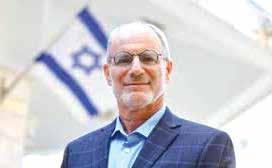
Israel’s next ambassador to the United States will be Yechiel Leiter, as per an Israeli cabinet vote on Sunday, unanimously approving him for the position.
Leiter will start as ambassador on January 24, 2024, four days after U.S. President-elect Donald Trump takes office.
Foreign Minister Gideon Sa’ar, during the cabinet meeting, said he’s certain that Leiter would play a big role in “the strengthening of Israel’s most important
relationship — with the United States.”
The foreign minister also commended Mike Herzog, the current ambassador.
“Yechiel Leiter is a highly talented diplomat, an eloquent speaker, and has a deep understanding of American culture and politics,” said Prime Minister Benjamin Netanyahu earlier this month after nominating Leiter.
Born in the U.S., Leiter is a founding father of the Israeli settler movement. He was one of the first people to live in Hebron’s Admot Yishai neighborhood, which was established in 1984. Leiter started an organization to help people settle Hebron two years later. He was the Committee of the Jewish Community of Hebron’s chairman. Currently, he resides in Alon Shvut, which is part of the Gush Etzion bloc.
When he was young, Leiter was reportedly an activist in Rabbi Meir Kahane’s Jewish Defense League before making aliyah to Israel. Leiter is now an ordained rabbi and received his doctorate from the University of Haifa.
Previously, he worked as the Education Ministry’s deputy director general, as the chief of staff of Netanyahu around twenty years ago when the premier was the finance minister and as the Ports Authority’s acting chairman. Now, Leiter is
the Jerusalem Center for Public Affairs’ director general and is a professor at central Israel’s Ono Academic College.
Leiter lost his son Maj. (res.) Moshe Leiter in combat on November 10, 2023, while he was battling Hamas terrorists in northern Gaza.
In 1994, Leiter published a book called, “A Peace Plan to Resist,” wherein he dismissed the Oslo Accords for its plan to create a self-governed Palestinian state. In 2020, he wrote an article saying that Israel should annex the West Bank.
According to reports from Ynet, Netanyahu first offered the position to Strategic Affairs Minister Ron Dermer and the premier’s senior advisor, Ophir Falk, although both allegedly turned down the prime minister’s offer.
Netanyahu likely hoped for Trump’s victory, as the former and now-incoming president is known for his tough stance on Iran and his pro-Israel policies.
The Biden administration criticized the International Criminal Court’s decision on Thursday to issue arrest war-
rants against Prime Minister Benjamin Netanyahu and ex-Defense Minister Yoav Gallant, with the White House declaring on Thursday that it “fundamentally rejects” the court’s attempts to punish Israel for defending itself in Gaza.

Several other U.S. officials condemned the ICC, with some urging the Senate to sanction the court. On the other hand, Michigan’s Rashida Tlaib, a radical Palestinian congresswoman, praised The Hague’s decision as “long overdue” and an indication that “the days of the Israeli apartheid government operating with impunity are ending.”
Practically, the arrest warrants block Netanyahu and Gallant from stepping foot in the 124 nations that have ICC membership.
“Let me be clear once again: whatever the ICC might imply, there is no equivalence — none — between Israel and Hamas. We will always stand with Israel


against threats to its security,” said U.S. President Joe Biden, condemning the court’s move as “outrageous.”
Karine Jean-Pierre, the White House’s press secretary, echoed Biden’s remarks, asserting that the decision calls into question the prosecutor’s credibility. A spokesperson for the White House National Security Council said the U.S. is “deeply concerned by the prosecutor’s rush to seek arrest warrants and the troubling process errors that led to this decision,” and added that the ICC does not have the right to arrest Israeli officials.
“In coordination with partners, including Israel, we are discussing next steps,” the spokesperson said.
During U.S. President-elect Donald Trump’s first term, he sanctioned the ICC. Now, despite requests from Republicans, Biden has refused to do the same. Last June, the House of Representatives passed legislation, canceling the U.S. visas, blocking entry, and financially restricting ICC officials who seek to prosecute America’s allies. The now-outgoing president was clear at the time that he was “strongly opposed” to the bill. In the House, the legislation passed with a 247155 majority, while the U.S. Senate has yet to accept the bill.
In anticipation of Trump’s return, Israel has reportedly assembled a list of sanctions that the U.S. could levy against the ICC. Several officials expected to be involved in Trump’s upcoming administration have condemned the court’s decision.
Mike Waltz, a Republican Representative from Florida and Trump’s nominee for national security adviser, blasted the ICC’s decision as antisemitic and said the president-elect’s administration would respond strongly to the court, which he said has no credibility.
“Israel has lawfully defended its people [and] borders from genocidal terrorists,” Waltz declared.
Senator Tom Cotton, another Republican, criticized the court’s chief prosecutor, Karim Khan.
“The ICC is a kangaroo court and Karim Khan is a deranged fanatic. Woe to him and anyone who tries to enforce these outlaw warrants,” Cotton posted. “Let me give them all a friendly reminder: the American law on the ICC is known as The Hague Invasion Act for a reason. Think about it.”
Senator Lindsey Graham noted how Khan’s the subject of an investigation into his alleged inappropriate behavior.
“Calling for an independent investigation of the prosecutor’s misconduct one day and issuing a warrant based on his work product the next day is an affront to
any sense of fairness and the rule of law,” Graham stated. “The Court is a dangerous joke. It is now time for the U.S. Senate to act and sanction this irresponsible body.”
The Republicans’ next U.S. Senate leader Senator John Thune similarly blasted the ICC, and said its decisions threaten Israel now, but “if left unchecked they could pose a threat to the United States in the future.” Thune called on Chuck Schumer, who will be the Senate majority leader until January, to pass legislation to sanction the ICC.
Pro-Israel Democrats, including Representative Ritchie Torres and Senator John Fetterman, also strongly condemned the court.
“Not only did Hamas wage war on Israel, causing the deadliest day for Jews since the Holocaust, it carefully constructed a battlefield designed to maximize the loss of civilian life,” wrote Torres. “The ICC should be sanctioned not for enforcing the law but for distorting it beyond recognition.”
The ICC also issued arrest warrants against three Hamas leaders, Mohammed Deif, Ismail Haniyeh, and Yahya Sinwar, who are all dead.

On Thursday, the State Attorney’s Office brought charges against Eli Feldstein, a spokesperson for the Prime Minister office, for harming state security, obstruction of justice, and illicit possession of classified information, by allegedly leaking classified documents. The charges were brought at the Central District Court.
The court also charged a currently-unnamed IDF reservist noncommissioned soldier with transferring classified information, obstruction of justice, and theft by an authorized person.
Feldstein faces a life sentence, while the officer’s charge of transferring classified information can carry a seven-year prison sentence.
As of now, the court is not criminally investigating Prime Minister Benjamin Netanyahu, although the allegations have
been irritating his office.
Hundreds of Israelis protested outside the Tel Aviv District Court on Thursday in solidarity with Feldstein and the NCO. Several coalition ministers and MKs were present at the demonstration, including Diaspora Affairs Minister Amichai Chikli, who lamented “the complete politicization of the legal system.”
According to the allegations, the NCO illegally removed a classified document from the IDF’s military intelligence database and handed it over to Feldstein. The Netanyahu aide then went on to send the document, which included details about Hamas’ goals and strategies regarding hostage talks, to the Bild, a German tabloid. Later, it was revealed that the document was authored by Hamas’ low-level officials and was not indicative of what the terror group actually wants.
Authorities arrested Feldstein on October 27. Last week, he was put on suicide watch after prison guards discovered a rubber strip in his cell that he could have used to hang himself. Feldstein and the NCO could be forced to remain in prison until the end of their respective court cases if the State Attorney’s Office’s request to keep them detained is granted.
The Lahav 433 major crimes unit on Wednesday interrogated another Netanyahu spokesman, Yonatan Urich, whom they suspect of ordering Feldstein to hand the classified document to Sruli Einhorn, a former senior campaign adviser to Netanyahu’s Likud party, who allegedly sent the document to Bild. Currently outside of Israel, Einhorn reportedly hasn’t returned home yet because he doesn’t want to be interrogated by officials.
The IDF believes the leak hurt the Jewish state’s goal of freeing the hostages who remain in Gaza over a year after they were kidnapped by Hamas on October 7. Investigators also say that the leak had the potential to severely damage Israel’s security, adding that the information was likely leaked for political purposes – namely, to spare Netanyahu from criticism when Hamas killed six well-known hostages last August and to instead show that the terror group is responsible for shooting down hostage talks.
Feldstein’s father, Yehoshua, and wife, Avital, have publicly defended the man as an innocent hero.
Zeev Erlich, a civilian archeologist known for his research in Judea and Sa-
maria, was killed last Wednesday at the age of 71.
Hezbollah terrorists murdered Erlich and twenty-year-old IDF Sgt. Gur Kehati in an ambush while the two Israelis were reportedly inspecting an ancient fortress in southern Lebanon that some speculate to be the place where a prominent figure in Christian scripture may be buried.

Though he was not an active duty soldier or reservist, Erlich wore an IDF uniform and was armed during his visit to the Lebanese battle zone. When they entered the site, two Hezbollah terrorists hiding in the fortress shot at them, killing Erlich and Kehati and injuring Col. Yoav Yarom and a company commander. Kehati and the commander were part of the Golani Brigade’s 13th Battalion. Yarom is the Golani Brigade’s chief of staff.
After the incident, the IDF launched investigations into why officials allowed Erlich to accompany them into Lebanon despite his lack of authorization to tour the war zone, where Israeli soldiers and terrorists have been fighting since October 1. Thus far, the initial findings of the investigations suggest that Yarom gave Erlich permission to come to Lebanon. However, Yarom did not have the authority to authorize the civilian tour and failed to follow protocol, according to the IDF Spokesman’s Office.
The IDF posthumously recognized Erlich as a major in the reserves, thus including his passing in the total death toll in Lebanon. The decision to do so was made by Maj. Gen. Dado Bar Kalifa, the IDF Personnel Directorate’s new commander.
Loved ones of Erlich have pushed back against the notion that he wasn’t allowed to accompany the IDF to southern Lebanon.
“Contrary to the claims of the IDF spokesperson, we can clarify that [Erlich] was conscripted and recognized as a soldier in the field — and the person who informed our family of his death is from the IDF Casualty Unit,” said the deceased’s brother, Yigal Amitai, adding that Erlich was “a soldier for all intents and purposes.”
“He entered [Lebanon] for archaeological research — as he always does in Judea and Samaria — but with the ap-


proval and accompaniment of the IDF,” added Amitai.
Despite his lack of formal academic credentials, Erlich, an independent researcher, published his findings in dozens of academic papers and served as the editor of numerous books about Judea and Samaria’s history. In 2012, Ynet reported that Erlich accompanied the IDF to investigate sites in Karawat Bani Hasan and Dir Ista, which are both close to Ariel, a village in Judea and Samaria.
Bezalel Smotrich, Israel’s finance minister, said Erlich was “a man of Ofra, a man of love for the people of Israel, the Torah of Israel and the Land of Israel,” who had “contributed a lot to the security of the country.”
“Senior officers helped him analyze and understand the area and its implications for ongoing security and operations over the years,” Smotrich said. Erlich leaves behind his wife Tamar, six children, and grandchildren as well.
Shaked was denied a visa because she might “incite discord,” noting that the act used to prevent her entry stipulates that applicants may be barred if it is believed that they may “vilify a segment of the Australian community, or incite discord in the Australian community or in a segment of that community.”

Speaking with the paper, AIJAC chief Colin Rubenstein condemned the visa ban as “a disgraceful act of hostility towards a democratic ally.”
“It is extraordinary that a government that refuses to take any meaningful action against an Iranian ambassador who effectively calls for genocide would act so undiplomatically towards a friend,” he said.
Zionist Federation of Australia president Jeremy Leibler tweeted, “The Australian Government’s decision to refuse a visa to Ayelet Shaked is both baffling and deeply offensive.”
“Ayelet is a former justice minister in the most diverse and centrist Israeli government in history, which included an Israeli Arab party and minister. This refusal is particularly perplexing given that this very same government granted her a visa less than two years ago,” he wrote.
“How is it conceivable that our government has granted a visa to a Palestinian man from Gaza who reportedly has had close family connections and personal interactions with terrorist organizations, yet refuses entry to a former government minister of a democratic nation and one of our Australia’s friends?”
In a later post, Leibler addressed Shaked directly, “I am embarrassed of my Government. Rest assured, most Australians do not support this outrageous decision.”
Former justice minister Ayelet Shaked said on Thursday that she was barred from entering Australia. She had been slated to address a conference organized by the Australia/Israel and Jewish Affairs Council (AIJAC).
According to Australian media,
Speaking with Channel 12 on Thursday, Shaked slammed what she called Australia’s “extreme anti-Israeli and pro-Palestinian government, part of which is even antisemitic, which for political reasons and because I oppose a Palestinian state does not allow me to attend a strategic dialogue between Israel and Australia.”
“These are dark days for democracy,” she added.



Sgt.-Maj. Yona Betzalel Brief, who was wounded while fighting in the Gaza border communities on October 7 of last year, succumbed to his wounds this week, the IDF announced on Tuesday.
Brief, 23, from Modi’in, served as a combat medic in the Duvdevan Unit and was seriously wounded while trying to rescue residents of Kfar Aza under fire.
“[Brief] was a symbol of values, heroism, and self-sacrifice, leaving behind a legacy that will resonate in our hearts,”
Modi’in mayor Haim Bibas said.
“They eliminated dozens of terrorists and saved dozens of civilians from the kibbutz, until they were suddenly hit by a barrage of gunfire,” said former Prime Minister Naftali Bennett, who visited Brief in the hospital.
Bennett said, “Yona, the team’s medic, under heavy fire, dragged the wounded to safety, only to be struck by 13 bullets all over his body. His legs were amputated, and his body sustained severe injuries.”
In the same battle, company commander Ben Bornstein and fellow team member Amir Fisher were killed.
Brief was conscious for part of his hospitalization and even spoke with his family and visitors. “Help others, it will help you too,” he told journalist Hanoch Daum about six months ago.
Brief is survived by his parents, Hazel and David, who immigrated to Israel from California, and five siblings.
According to the IDF, 804 soldiers have been killed on or since October of last year.
has nominated Pam Bondi, a former Florida Attorney General, for the position instead.
Gaetz, who resigned from Congress immediately after his nomination for AG, abandoned his shot at attorney general because of serious allegations accusing him of using drugs and engaging in various illegal activities. The congressman was being investigated by the House Ethics Committee. However, Gaetz had resigned from the House a day before the committee planned on releasing its findings. Thus, the House will likely refrain from publishing the report, since it only investigates current House members.

Though Gaetz maintains his innocence, he stepped down from consideration to avoid drama, he said. Critics from both parties claimed that he wasn’t a good pick for several reasons, including his lack of prosecutorial experience and the fact that he’s embroiled in a series of scandals.
Bondi, on the other hand, is a more conventional pick for attorney general. A Trump loyalist who served in his first administration’s Opioid and Drug Abuse Commission, Bondi was Florida’s first female attorney general and held the position from 2011 to 2019.
“For too long, the partisan Department of Justice has been weaponized against me and other Republicans – not anymore,” Trump declared, saying that Bondi would end the Justice Department’s politicization.
Former Florida representative Matt Gaetz, President-elect Donald Trump’s controversial pick for attorney general, gave up the nomination last week after it became clear that his Senate approval would be an uphill battle. As such, Trump

Feeling down? Well, if so, maybe it’s because you’re working too hard on the weekends.
According to happiness researcher Dr. Cassie Holmes, the author of “Happier

40 Hour,” treating your weekends like a vacation can make you happier.
“People associate vacations with a break…whereas our weekends tend to be a routine where we are moving through our activities,” Holmes said recently on a podcast, explaining that most people fill their weekends with mindless household chores instead of using their off time to do fun, rewarding activities.
According to an experiment with 400 people conducted by Holmes in 2017, those who spent their weekend like a vacation reported more feelings of positivity and satisfaction upon returning to work. In an article she wrote in 2019 for the Harvard Business Review, Holmes explained that these individuals were focusing less on mundane tasks and were “more mindful of and attentive to the present moment throughout their weekend’s activities.”
It’s easier said than done, of course. According to a May 2024 Harris Poll survey, 78% of U.S. workers don’t utilize their paid time off, while 54% of those who do report having a hard time adjusting away from their jobs. As such, Holmes suggests turning one weekend day into vacation time as a start.
“Some people are like, well [the weekend] is when I get my chores done,” she explained. “Why don’t you carve out Saturday? And then Sunday, you can do all the stuff that you have to do.”
During that one day, break away from your routine and do the things you enjoy.
The one drawback to the technique, Holmes said, is that it can become purposeless if overdone. If you get used to treating your weekend as a vacation, it may cease to have any effect on you.
“Given that the vacation mindset and resulting happiness stems from mentally breaking from routine and the day-today grind, this intervention cannot itself become a routine,” she explained in her HBR article. “When used judiciously, this simple reframing allows you to enjoy some of the happiness from a vacation without taking additional time off.”
Damian Williams, the federal prosecutor who had overseen the convictions of Sen. Robert Menendez, Jeffrey Epstein’s accomplice Ghislaine Maxwell, and disgraced cryptocurrency mogul Sam Bankman-Fried, said he will step down as U.S. Attorney for the Southern District of New York next month.
“It has been an honor to serve the
American people,” he said. Williams has also been overseeing the prosecutions of New York City Mayor Eric Adams and rap artist Sean “Diddy” Combs.
His resignation will be effective on December 13.
Williams, the first Black man to hold the prestigious and powerful post, was a veteran of the office who was nominated by President Joe Biden in 2021. President-elect Donald Trump had already announced his intention to replace him.
Once headed by Rudy Giuliani, the Manhattan U.S. Attorney’s office handles some of the most complex and high-profile criminal cases in the country, including public corruption, securities fraud and terrorism cases.
In his statement, Williams called his decision to step down “bittersweet.”

“It is bitter in the sense that I am leaving my dream job, leading an institution I love that is filled with the finest public servants in the world. It is sweet in that I am confident I am leaving at a time when the Office is functioning at an incredibly high level — upholding and exceeding its already high standard of excellence, integrity, and independence,” he said.
Williams’ deputy, Edward Y. Kim, will become acting U.S. Attorney after his departure.
Trump announced earlier this month he would be nominating his former Securities and Exchange Commission head Jay Clayton to head the office.
In his statement announcing Clayton’s nomination, Trump called him “a highly respected business leader, counsel, and public servant.”
“Jay is going to be a strong Fighter for the Truth as we Make America Great Again,” Trump wrote.
This week, President-elect Donald Trump chose to nominate hedge fund executive Scott Bessent to lead the Department of Treasury.
Bessent has experience as a global investor who has worked with legendary money managers. After the announcement, the Dow reached a new record high
of 44,737 Monday, ending the day with a gain of 440 points, or just under 1%.
The S&P 500 ticked up by 0.3% and the Nasdaq Composite moved up by 0.27%.
Treasury yields ticked down and the dollar fell.

“There’s huge relief,” said Jeffrey Sonnenfeld, founder and president of the Yale Chief Executive Institute. “Bessent is reasonable and pragmatic.”
The Treasury secretary role is one of the most crucial hires of any administration. It will be Bessent’s job to carry out the president’s economic agenda.
Of course, the nomination was not without its detractors.
“Wall Street may be breathing a sigh of relief at Scott Bessent’s nomination, but working people see no help coming their way,” Sen. Elizabeth Warren said in a statement Monday. “Mr. Bessent’s expertise is helping rich investors make more money, not cutting costs for families squeezed by corporate profiteering.”
During a radio interview on Saturday with Larry Kudlow, Bessent said “tariffs can’t be inflationary because if the price of one thing goes up, unless you give people more money, then they have less money to spend on the other thing, so there is no inflation.”
“The inflation comes through either increasing the money supply or increasing the government spending, and that’s what happened under Biden,” he noted.
Many economists continue to warn that tariffs — especially the across-theboard tariffs Trump has promised — will increase prices.
Bessent beat out Cantor Fitzgerald CEO Howard Lutnick, who was also in the running to be Treasury secretary and had been endorsed by Elon Musk. Trump instead picked Lutnick for Commerce secretary, another key role, though not as prominent as Treasury.
It’s not just prices that Walmart is rolling back this season. The nation’s largest private employer said it would not renew a racial equity center it created following the 2020 murder of George Floyd
and said it would no longer participate in an annual benchmark index from a certain advocacy group that advocates for people who live alternate lifestyles.
Robby Starbuck, a conservative activist, said he warned Walmart last week he was working on a report about “wokeness.” According to Starbuck, the company then engaged in “productive conversations” to make changes.
“Removing wokeness from Walmart has both downstream effects on suppliers and it sets the tone for corporate America,” Starbuck told said. “Changing the normal operating policy at a nearly $1 trillion company is a gargantuan feat that many have tried to achieve but no one until now has actually been able to get done.”
Walmart also committed to monitoring third-party items in the Walmart marketplace for “inappropriate … products marketed to children” and no longer using the term LatinX in official communications.
Walmart said many of the DEI changes were in the works for a few years and were not a result of the conversation with Starbuck. For example, Walmart said it already switched its terminology from DEI to belonging and made changes to its supplier diversity program.
“We’ve been on a journey and know we aren’t perfect, but every decision comes from a place of wanting to foster a sense of belonging, to open doors to opportunities for all our associates, customers and suppliers and to be a Walmart for everyone,” the company said.

In conservative circles, the 2024 election is being viewed as a referendum on DEI. More than 60% of corporate executives surveyed by business research group The Conference Board view today’s political climate for corporate DEI as very or extremely challenging, and most expected continued or escalating pushback.
Jessica Tisch, whose public service spans three mayoral administrations, became the fourth NYPD commissioner to serve under Mayor Eric Adams on Monday. She is the second woman to do so.


Adams called Tisch a “battle-tested leader.” Until last week, she served as head of the city Sanitation Department, leading Adams’s “war on rats” and his “trash revolution,” using the agency to implement curbside composting and clean up city streets. As sanitation commissioner, she became TikTok famous when she declared in 2022, “The rats don’t run the city, we do.” Sanitation’s First Deputy Commissioner Javier Lojan will take over for Tisch now that she is
heading the NYPD.
Tisch is succeeding interim Police Commissioner Thomas Donlon, a former FBI agent whose home was raided by the FBI soon after his appointment. Donlon’s predecessor, Edward Caban, stepped down amid an FBI investigation. Adams’s first commissioner, Keechant Sewell, left after speaking out about issues within the department.
Tisch is a Harvard graduate and lifelong New Yorker who served in var-
sworn in, she credited four female, threestar chiefs for “taking a sledgehammer to the glass ceiling” of the NYPD. She earned a chuckle from the crowd when she described the first time she came to work at police headquarters mentioning the “outrageously repetitive paperwork,” an environment she is largely credited with modernizing.

Tisch’s father, James S. Tisch, is president and CEO of Loews Corporation, the conglomerate that owns Loews Hotels and CNA Financial. Her mother, Merryl Tisch, is former chancellor of the state Board of Regents, which supervises education. Her late grandfather, Laurence Tisch, once led CBS. Her cousins are co-owners of the NFL’s Giants. The family has given millions of dollars to cultural and academic institutions and is the namesake of New York University’s Tisch School of the Arts.

ious city roles under Mayors Michael Bloomberg and de Blasio. She never served as a uniformed police officer. She first came to the department in 2008, when she served as director of counterterrorism, counsel to the police commissioner and deputy commissioner of technology. She is credited for introducing body-worn cameras to the department and overhauling how crime stats are reported to the public.
In her opening comments after being
Special counsel Jack Smith asked two courts Monday to effectively shut down the federal criminal cases he brought against President-elect Donald Trump last year, bowing to a Justice Department policy that says it is unconstitutional to pursue prosecutions against sitting presidents.
The twin requests by Smith — made to judges in Washington and Atlanta — were an acknowledgment that Trump will reenter the White House in January unburdened by federal efforts to hold him accountable through charges of plotting to subvert the last presidential election and holding on to a trove of highly classified material following his first term in office.

The double-barreled filings were also the latest sign that Smith and his team were working to close up shop after years of intensive investigation and courthouse drama that tested the justice system’s ability to hold a once-and-future president to account amid shifting politics, misinformation and evolving legal standards.
Hours after Smith submitted his requests, Judge Tanya Chutkan, who is overseeing the election interference case in Washington, issued a brief order dismissing the proceeding.
Smith’s moves came after the president-elect began filling out his choices to lead the Justice Department. They followed Trump’s vow on the campaign trail to fire Smith within “two seconds” of taking office and to launch investigations into the prosecutors who pursued him. Smith has signaled that he intends to resign before Trump takes office.
In both of the court submissions, Smith made clear that his moves to end the charges against Trump were a necessity imposed on him by legal norms, rather than a decision made on the merits of the cases or because of problems with the evidence. The filings cited a Justice Department policy that sitting presidents may not be prosecuted.
That policy, Smith wrote, “is categorical and does not turn on the gravity of the crimes charged, the strength of the government’s proof or the merits of the prosecution, which the government stands fully behind.”
Smith acknowledged the uniqueness of the situation, writing that neither the Justice Department nor the country had ever “faced the circumstance here, where a federal indictment against a private citizen has been returned by a grand jury and a criminal prosecution is already underway when the defendant is elected president.”
While Smith sought to end the cases before Trump was inaugurated, he did not definitively close the door on the possibility of the prosecutions one day being revived. (© The New York Times)
the course of nearly three years, prompting the retailer to conduct an independent forensic accounting investigation. The employee is no longer with the company. Macy’s said he had “intentionally made erroneous accounting accrual entries” to hide small package delivery expenses.

Although the questionable expenses were a small fraction of the $4.36 billion in delivery expenses Macy’s recognized between the fourth quarter of 2021 through its most recent period, Macy’s found that the errors were significant enough to delay reporting its full quarterly earnings until December 11. Still, the company said there was “no indication that the erroneous accounting accrual entries had any impact on the company’s cash management activities or vendor payments.”
So far, Macy’s said it believes only one employee was involved.
“At Macy’s, Inc., we promote a culture of ethical conduct,” said Macy’s CEO Tony Spring said in a statement. “While we work diligently to complete the investigation as soon as practicable and ensure this matter is handled appropriately, our colleagues across the company are focused on serving our customers and executing our strategy for a successful holiday season.”
Macy’s released a preliminary earnings report on Monday and revealed that quarterly sales slipped 2.4% to $4.7 billion because of weakness in its digital channels and cold weather categories as the country experienced its warmest fall on average.
The company plans on closing hundreds of stores.
Tinniswood was born in Liverpool on August 26, 1912. He became the world’s oldest man in April following the death of 114-year-old Venezuelan Juan Vicente Perez.

“His last day was surrounded by music and love,” the family said in a statement, also thanking “all those who cared for him over the years.”
Born the same year the Titanic sank and living through both World Wars, Tinniswood told Guinness World Records that the secret to his longevity was “pure luck.”
“You either live long or you live short, and you can’t do much about it,” he said.
Still, his advice was that moderation is key to keeping healthy.
“If you drink too much or you eat too much or you walk too much, if you do too much of anything, you’re going to suffer eventually,” he observed.
During World War II, Tinniswood held an administrative role in the Royal Army Pay Corps, going on to work in accounts for oil giants Shell and BP.
He was a life-long supporter of Liverpool soccer club and ate fish and chips every Friday. Staff at his care home in Southport described Tinniswood as a “big chatterbox.”
The world’s oldest living woman is Tomiko Itooka of Japan. She is 116 years old.
Can we say “until 120”?
On Monday, Macy’s said that one employee was responsible for a deluge of accounting irregularities – so much so that the company had to delay its quarterly earnings report, which the retailer had planned to release on Tuesday.
The worker had intentionally hid as much as $154 million in expenses over
This week, the world’s oldest man, John Tinniswood, died at the age of 112. He had been living in a care home in northwest England when he passed away on Monday.
the world’s top experts from around the globe.
The winning cheese, produced by the tiny 10-employee Quinta do Pomar in Soalheira, Portugal, scored highest out of 14 finalists that included no fewer than five Swiss cheeses, plus entries from Brazil, the United States, Norway, Italy, Germany and Spain.
Made with vegetarian rennet created from thistles, the winner is described as a gooey, glossy, buttery cheese with a herby bitterness that’s typically served by slicing off the top and spooning out the center.
“It’s quite balanced … voluptuous,” Portuguese cheese exporter Manuel Maia, one of the international panel of jurors, said. “It is a really sublime match of protein and fat. It’s really a fantastic cheese.”
The judging is a spectacle in itself. Following a performance by local drummers, teams of experts are assigned to 104 tables in the main hall at Pavilhão Multiusos de Viseu arena, each one groaning with around 40 cheeses of all shapes, colors, sizes, ages and textures.
The smell in the room is quite pungent, as you can imagine.
Each entry is judged by appearance, feel, smell, taste and texture in the mouth. Each team of judges selects four finalists in bronze, silver, gold and super gold categories — the latter were entered into the final cheese taste-off to decide 2024’s winner.
Last year, the contest was won by Nidelven Blå, a creamy semi-solid blue old, cows’ milk cheese made by the Gangstad Gårdsysteri creamery in Norway. In 2022, a Swiss Gruyère took the top prize. Sounds like these delicacies were “cheesen” wisely.

Love cheese? There’s a real “gouda” one around. Last Friday, a piece of Queijo de Ovelha Amanteigado, a soft, raw ewes’ milk cheese, was named 2024’s winner at the World Cheese Awards.
The competition saw 4,786 cheeses from 47 countries brought together in Viseu, Portugal, under the scrutiny of

Having trouble with your math homework? Do NOT call the police.
One little boy, though, unfortunately contacted the local police department when he couldn’t understand his math homework.
The Shawano County Sheriff’s Office in Wisconsin said on social media that



a dispatcher answered a 911 call “from a 10-year-old who called to say that he needed help with his math homework.”
“He stated his family ‘wasn’t very good at math either,’ and he needed help,” the post said.
Sheriff George Lenzner said dispatcher Kim Krause explained to the young caller that 911 was not the appropriate number to call for homework help, but she also offered her assistance.
“She had some time, so she said, ‘Can

Want a great cup of coffee? It’ll cost you.
A Scottish dairy is offering what it bills as the UK’s most expensive cup o’ joe: $344 for a flat white — a double shot of espresso topped with a layer of steamed milk and a fleeting work of foam art. But you’re not just getting coffee for that price. The beverage is actually a perk for purchasing shares in Mossgiel Organic Dairy’s crowdfunding campaign to enlarge its sustainable operation and produce more milk.
Investors who buy 34 shares in the farm get a certificate for a flat white that can be redeemed at one of 13 coffee shops in Scotland that use the dairy’s milk.
“This coffee costs nearly 80 times the price of an average flat white in the UK — but it’s much more than just a lovely drink,” said owner Bryce Cunningham. “We know it sounds crazy, but when you break it down, it’s a pretty good deal. How much is the future of farming worth?”
The price tops the eye-watering $335 that Shot London, a coffee bar in the posh Mayfair and Marylebone neighborhoods, charged for a flat white made with rare beans from Okinawa, Japan. In April it was reported to be the most expensive coffee in Britain.
Shareholders in Cunningham’s farm receive other rewards, too, such as farm tours, milk delivery discounts and invites to special events. But investors are also given a standard warning that they could lose some or all of the money they invest — except for the coffee.
I help you with the problem?’ And well, he gave this long problem with decimals and she was unable to help him, so she informed him, ‘Well, let me see if I got a deputy near your residence,’” Lenzner said.
Deputy Sheriff Chase Mason was in the area and agreed to take a look at the math problem.
“Personally, I am also not overly proficient when it comes to math, but nonetheless, I responded to assist,” Mason
wrote in his report about the incident.
Mason, who has a stepson the same age as the caller, sat down with the child and was able to “solve the decimal related math problems,” the Facebook post said. “Our young caller was provided a business card and was told we are always here to help, except next time he should probably use the non-emergency line if it’s not a life-threatening situation.”
Because math is not a life-threatening emergency.
And what a cup of coffee it is! Cunningham says that he uses a process to “brew” the milk, instead of pasteurize it, that gives it the creamier taste and texture of raw milk without the health risks.
Sounds like there’s a latte to love.




It was called an “Evening of Chizuk,” but for us, it was much more. A packed house of over 250 people joined us on Motzei Shabbat to hear words of inspiration from the great tzaddik of this generation, Rav Yitzchak Dovid Grossman, founder of Migdal Ohr, and Rabbi Moshe Weinberger, mara d’asra of Cong. Aish Kodesh. The evening felt like a much-needed embrace of warmth, support, and love. Moments like this remind us of what we can achieve together, even from afar.
The event not only uplifted spirits but also accomplished something incredible: we raised 80% of our $250,000 goal for emergency funds. These funds will go directly toward lifesaving equipment and critical winter gear for our brave cha-



yalim on the front lines. Tons of equipment is stored at the ICC (thanks to a generous wholesale partner), ready to be packed and shipped to Israel the moment you purchase it! If you haven’t yet joined this vital effort, please visit us in our warehouse or consider donating at www.charidy.com/icc.gear. Together, we can support the heroes who protect us every day.
Rav Weinberger spoke movingly, “You think you’re standing on a cement floor in a warehouse,” he said, “but this is holy ground. This place is filled with love and ahavas Yisrael — a love for every Jew — that overflows from here all the way to Eretz Yisrael, reaching every crack and corner.”
We then watched a powerful video

showcasing the work of Migdal Ohr since October 7; they have not stopped for a moment, caring for those who need us most — orphans and children from displaced families.
Rav Grossman, the heart behind Migdal Ohr, then emphasized the profound importance of chesed and achdut. He reminded us that if we come together, setting aside differences and embracing one another as one united people, we can achieve greatness. Through kindness, love, and unity, he assured us, we will prevail.
The Israel Chesed Center remains steadfast in its mission, working tirelessly every day for as long as we are needed. As Rav Grossman so beautifully put it, the ahavat Yisrael we generate is just as vital



as the physical aid we provide. We ask you to continue standing with us — visit the Chesed Center, lend your support, donate, and help pack the lifesaving gear our chayalim so desperately need. Together, we will bring light, hope, and love to those who need it most.
Moshe Bodner and Jeff Eisenberg are the co-founders of the Israel Chesed Center, the largest private humanitarian organization established in the aftermath of October 7, 2023, to assist soldiers, displaced families and security response teams in Israel. The Israel Chesed Center is located at 1315 Peninsula Blvd., Hewlett.
For more information, visit www. israelchesedecenter.com or contact israelchesedcenter@gmail.com.




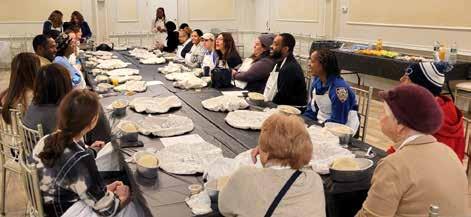
The JCCRP hosted a community challah bake on Monday, November 26, bringing together people living in Far Rockaway to learn more about challah. It was sponsored generously by UJA-Federation of NY and Councilwoman Selvena Brooks-Powers. The Councilwoman started off the event stating, “Two years ago, I went to Israel with JCRC-NY, and I came back wanting to bring that experience and education in to the community here in the Rockaways. Thank you to Daniel Rosen-



With great excitement, Torah and Language Academy, TAL Academy, held its first Haschalas Gemara celebration. This celebration might have been a bit more impactful than a standard Haschalas Gemara celebration due to the nature of TAL Academy, which is a school exclusively for bright children who struggle with Language-Based learning disabilities.
thal for making this possible today.”
Mrs. Suri Jaroslawitz led the event, educating all the attendees with laughs and tears. Margo Paz and Abbie Rubin-Pope attended the event from UJA-Federation of NY, along with Councilwoman Selvena Brooks-Powers, P’nina Gluck from Assemblywoman Stacey Pheffer Amato’s office, Mrs. Ruchie Dunn, and representatives from many organizations including the YMCA Far Rockaway.
The celebration was held in the school on Sunday morning. The boys were invited along with their fathers and grandfathers to a gala breakfast in honor of the event. The program began with a speech by Mrs. Sara Taib, their very proud principal. She highlighted how the Torah is renewed in every generation by those who study it and therefore every day when the boys learn their Gemara is worthy of a new haschalas Gemara celebration. She praised the boys for the enthusiasm and perseverance they’ve shown in learning Gemara thus far and offered her bracha that they continue learning with that same excitement. Rabbi Aryeh Dachs, TAL Executive Director, introduced Rabbi Yaakov Reisman who came to speak to the boys. Rabbi Dachs told the boys how a Haschalas Gemara is exciting for
everyone. He relayed that the excitement was infectious, bringing joy to everyone, not just the boys in TAL. Rabbi Reisman then spoke about how the boys, when learning Gemara, are like the stars in the sky, referring to the stars that Hashem promised Avraham many years ago. He explained that from our vantage point on earth, the stars seem small, yet we know the stars are extraordinary in their size and their brilliance. So, too, is the way of the Torah; through Torah learning we can become brilliant like the stars.
The boys prepared for this event with their dedicated rebbi, Rabbi Avi Karr, by creating an exciting video outlining the first few cases of the Gemara they were learning. The video even featured the now deceased class pet lizard, Jumpy! The video was well received followed by words of chizuk from Rabbi Karr as well as a few words from Rabbi Moshe Boehm, the TAL-5 assistant Rebbi. The boys then learned a portion of the Gemara that they had prepared with their fathers and grandfathers. Afterward, they played a trivia game with questions from the Gemara they had just studied. It was an impressive, meaningful morning. Everyone left uplifted and inspired.






HANC Elementary School in West Hempstead welcomed the grandparents and special guests of the third grade students for a very special Shabbat Assembly. The grandparents and other family members were so excited about this unique opportunity that they came from all over the tri-state area, and as far away as Florida! As the guests arrived, the auditorium was filled to capacity with happy grandparents and guests who were eager to see their grandchildren in school. Seeing the gleeful looks on the children’s faces as they found their grandparents and sat with them was truly heartwarming.
With lights dimmed, the staff distributed glow stick necklaces and finger lights to add extra excitement to the
event. As is the weekly custom at HANC, the children and their teachers sang Shabbat songs and songs of inspiration during these difficult times in Israel. To provide everyone with extra hope, a video was shared of all of the chesed that is being done in Israel to support the soldiers and their families, as well as uplifting reunions including a young soldier surprising his father by appearing unexpectedly at a simcha, after being away fighting in the war for a long period of time. The crowd also viewed videos of soldiers expressing their thanks for the protective helmets that were provided for them by caring Jews from around the world, and delighted children opening fun packages that were sent to cheer them up.
After more singing, the crowd took a

virtual flight from JFK to Yerushalayim, and amidst the singing, a group of third graders spontaneously rose and began dancing arm in arm in the center of the room. Another video that was shared, produced by the Shabbat Project, emphasized the importance of turning off our devices and refocusing our attention on spending quality time with our family members on Shabbat. The combination of the singing, the emotional videos, and seeing generations of families enjoying it together was truly priceless.
At the conclusion of the event, the children sang a special version of the song “Ufaratzta.” In addition to the original Hebrew, the song includes the words: “Spread out, spread light, spread love all around the world.” With the sym-
bolic lights on their fingers, it is HANC’s hope that the children will live their lives now and in the future, spreading light and love wherever they go. As the families exited the auditorium to enjoy the collation in the hallway, it was evident how much the students loved sharing one of their most special weekly experiences with their beloved grandparents. Each guest was gifted with a “Proud HANC Grandparent” tote bag and car magnet as a token of appreciation. HANC was excited to launch such a wonderful program this year and hopes to welcome the grandparents and special guests back to many more family-based programs in the years to come.

Renowned stained-glass artist Barak Uranovsky will bring his artistry to Lawrence on Tuesday, December 3, with a solo exhibition at Art by Simcha on Central Avenue.
Born in Cape Town, South Africa, Barak moved to Israel in 1990. After serving in the IDF, he returned briefly to South Africa to apprentice with acclaimed stained-glass artist David Manning. By 1995, he had opened his own studio in Gush Etzion, later relocating with his wife and seven children to Moshav Bnei Re’em near Yad Binyamin.
Although Israel remains his home base, Barak’s artistic vision has taken him across the globe. His large stained- and fused-glass masterpieces grace prominent spaces across the Jewish world, such as the flagship Bobov synagogue in Boro Park and Manhattan’s Ramaz School.
Barak’s artistic journey is deeply intertwined with his spiritual exploration. A project for a Chabad center introduced him to Chassidic thought, which eventu-
ally led him to the teachings of Rabbi Nachman of Breslov. This blend of creativity and spirituality has earned him the title “The Chagall of Breslov.”
In response to the events of October 7, Barak has created deeply emotional works that reflect resilience and hope. One striking piece depicts an IDF soldier embracing his child, while another shows a bride and groom in their IDF uniforms. Rather than focusing on the darkness of that day, these works celebrate the strength and connection that have emerged in its aftermath.
In a recent interview with The Jerusalem Post magazine, Barak shared his thoughts on the unique allure of glass art. Unlike other mediums, where light reflects off the surface, glass art invites light to shine through. “The art doesn’t start with what I do on the surface,” he explained. “It starts behind the surface, with the light coming through the glass itself. I only channel the light, moving it this way and that.”

Simcha Freifeld, founder of Art by Simcha, is thrilled to host Barak for this special event.
“Barak’s ability to blend artistry, spirituality, and light creates an unforgettable experience,” Simcha said. “The exhibition will feature some of his most celebrat-

ed works, and guests will hear firsthand from the artist about the inspiration and process behind these incredible pieces.”
Barak Uranovsky will be exhibiting at Art by Simcha, 311 Central Avenue in Lawrence, NY, on Tuesday, December 3 from 7 p.m.-10 p.m.




Ezra Academy, a school dedicated to nurturing every student’s interests and passions, celebrated a milestone this week by hosting its inaugural Book Club meeting. The historic gathering took place in the cozy, book-lined office of Assistant Principal Mr. Miska, filled with the excitement of intellectual discovery. The first book chosen by the students was Never Lie by Frieda McFadden.
Attendees included Principal Ms. Fish, who lent her enthusiastic support, and six trailblazing students who became the founding members of the club: Abigail Rachmanov, Lirita Aminov, Regina Fatakhov, Sarah Shakarov, Chana
Movsikov, and Meiel Shany. Together, they dived into thematic questions and character analysis of their first selected text, sparking lively debates and thoughtful reflections.
The meeting symbolized much more than a love for literature. It was a testament to Ezra Academy’s commitment to fostering an inclusive environment where every student can find their unique niche. “We believe that every child deserves a space where they feel heard, seen, and valued,” remarked Mr. Miska.
Principal Fish echoed this sentiment, praising the Book Club as an example of the school’s mission to create meaningful connections through shared passions.

“Whether it’s a love of literature, art, or science, our goal is to ensure every student feels they belong to something special,” she said.
The students left the meeting inspired, eagerly anticipating their next session. Abigail Rachmanov gets the
This past week, some very lucky fifth grade girls in HANC Elementary School in West Hempstead experienced a remarkable lesson that brought new meaning to collaborative teaching. Morah Tamar Horowitz was planning a Mishnah lesson for her students about halachic light hours and when is the appropriate time to daven Shacharit. When she discovered that it involved some complicated math formulations, she turned to HANC’s Math Department Chair, Mrs. Shira Beer, who also happens to be her mother. As she sought guidance on how to teach the mathematical concepts, she suggested that maybe it would be best for her to teach the Mishnah portion of the lesson and her mother could teach the math. And so, the collaboration began as they mapped out the joint teaching session.
Morah Tamar began the lesson on the differing views between Reb Yehuda, who taught that the latest time to daven Shacharit was four hours into the day, and the Hachamim, whose opinion stated
that midday (i.e., six hours after sunrise) should be the latest time to daven. Since sunrise and the number of hours of sunlight are different every day, how do we divide the twelve hours and determine the prescribed davening times for each day? That is where Mrs. Beer stepped in to explain exactly how the times are calculated. By giving examples of different sunrise times, the students utilized many skills to determine the varying times to daven Shacharit.
Following the lesson, the students were given a worksheet to help them practice the calculations on their own. It was a tremendous example of how math skills can not only be helpful in our daily lives, but can also be utilized in very practical ways to help us live a Torah true life.
“When thinking about this lesson,” remarked Morah Tamar, “I realized that this is a perfect opportunity to bring Torah to life and to show the students that all knowledge is inter-connected and intertwined. If you love your math class or
credit for leading the charge of book club, inspiring and recruiting new members. The Ezra Academy Book Club is more than a literary pursuit—it’s a pioneering effort to unite students through stories, fostering an enduring sense of community and intellectual curiosity.

another class, you can use that knowledge to better understand Torah. This is a way of bringing Torah and Maddah into the classroom.”
The entire experience was enlightening for all the students, and a very special
wait to see what Morah Tamar and Mrs. Beer have in store for the students in the future.


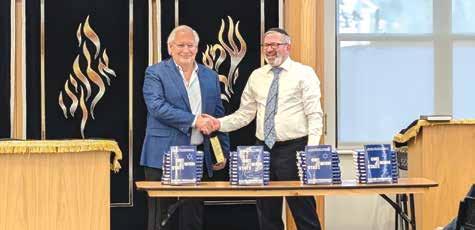
When Ambassador David Friedman entered the halls of Rambam, many students quickly greeted him. They recognized him from a previous visit where they garnered first-hand insights into the current Middle East crisis. Rambam’s Rabbi Zev Meir Friedman (no relation) referred to this when he said, “Over the past year, I have spoken to many people in school, at a kiddush, Shabbos table, and other venues, and all had different opinions in terms of how Israel should conduct herself. However, it should be noted that all of these opinions were those of outsiders. Today, we have the unique opportunity to hear from a true insider who helped mold policy in the Middle East.”
Ambassador Friedman presented a telling analysis of the current situation. He reminded us of the obvious: There are multiple Muslim states in the world but only one Jewish state. Ambassador Friedman penned a book aptly named One Jewish State, which provides analysis and a potential solution to the current horrific situation in Israel. All students


received a copy of this book, autographed by its author, and generously sponsored by Mr. and Mrs. Shalom and Iris Maidenbaum, dear friends of the ambassador and the Mesivta.
Despite his hectic schedule, Ambassador Friedman stayed to answer questions from the eager students. During the question-and-answer session, we learned that there was a minimum of antisemitism in the discussion of the Abraham Accords. “People of faith respect people of faith. and I did not encounter any overt antisemitism,” said the ambassador. He also noted that the current administration thwarted many of Israel’s strategies and advised against them.
As we see from the news, there is much controversy regarding Israel’s management of the war and plans for the day after. The ambassador’s vast knowledge and expertise are undeniable. His contributions have made a lasting, positive impact on the students of Rambam, inspiring growth and learning in a profound way.
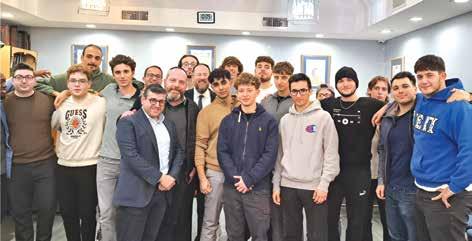
Rav Elya Brudny, shlita, was once asked at the Agudah Convention, “What’s the greatest crisis confronting Klal Yisroel?”
His answer was shocking and eye-opening to many. He said that without a doubt, the greatest crisis Klal Yisroel faces is the fact that most Jews are being lost forever to Yiddishkeit. 80% of Hashem’s children are disappearing! The Rosh Yeshiva gave a charge for everyone to attempt to make a difference.
Flatbush’s Kiruv organization, BJX, is responding to that urgent call. Dozens of unaffiliated Jewish college students enrolled in BJX to learn the beauty and joy of Yiddishkeit as well as skills to succeed as future Jewish leaders.
These students are from Columbia, NYU, Fordham, Adelphi, Baruch and Brooklyn College. The feedback from the program was Baruch Hashem tremendous.
At BJX, we firmly believe that no matter their background, every Yid is Hashem’s beloved child. Let’s all daven that these new bright and ambitious students from the local colleges who joined our BJX programs will connect to Hashem and remain forever connected to Yiddishkeit!
Special thank you to executives Sruli Werdiger and Yaakov Gold for the incredible knowledge that they imparted to our students.




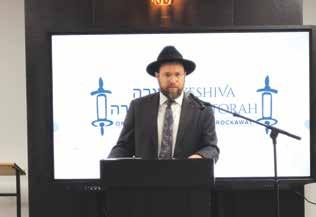

Every Monday and Wednesday afternoon, a unique gathering takes place in the heart of the Five Towns at HAFTR. Here, the Goodman Family i-Shine program, an initiative of Chai Lifeline, creates a sanctuary of support and joy for children whose families face the unimaginable challenges of illness or loss of a parent or sibling. For many, it’s not just an afterschool program—it’s a lifeline.
In the Five Towns, i-Shine serves around 40 children, from ages four to 14, representing 14 different community schools. Each week, 80 dedicated high school volunteers step forward to be there for these kids. Each child is paired with a high school volunteer, building a meaningful relationship through time spent together. Whether it’s tackling homework, engaging in crafts, or playing outside, these moments offer stability and joy amid difficult times.
The program begins at 3:45 p.m. with the younger children getting support from adult volunteers who are on shift before the high schoolers get there. Adult volunteers ensure that each child
has a smooth transition from school to i-Shine’s activities. Once the high school volunteers arrive, kids can play, take part in arts and crafts projects, or simply have a listening ear and friend by their side. From 5:00 to 5:30, i-Shine introduces unique activities, which vary from week to week. They might bring in karate lessons or a magic show, the group may go bowling, or even visit a community member’s indoor pool, a beloved tradition now for over seven years. At 6:00, dinner is served, sometimes even followed by a birthday party for one of the children!
Yet, beyond the structure and activities, i-Shine’s essence lies in the deep and enduring relationships formed between volunteers and children. There are countless stories of volunteers continuing to maintain long-lasting friendships with their kids well after the program has ended. Their connection goes far beyond weekly meetups, offering companionship and strength during some of life’s most challenging moments.
This connection speaks to i-Shine’s broader impact, which reaches well beyond the program’s sessions. Children

are invited to their volunteers’ weddings, continued friendships, and bonds lasting years reflect the incredible ripple effect i-Shine has on the community.
For these kids and their families, i-Shine offers more than just an afterschool program; it’s a source of joy, stability, and community. One community member and volunteer shared with us that “i-Shine has created a space where children can just be kids again, surrounded by people who understand their challenges and offer support with com-

passion and warmth. For my grandson, it’s not just a program—it’s a place where he feels safe, valued, and connected. And for me, seeing the transformation in him and knowing that he is thriving in an environment built on kindness and empathy has been deeply moving.”
i-Shine has become a beacon of resilience, compassion, and connection—a place where love and community come together to shine brightly, even in the face of hardship. To learn more or get involved, visit www.chailifeline.org/ishine


Senator Patricia Canzoneri-Fitzpatrick and Assemblyman Ari Brown joined forces and distributed 100 turkeys to residents across the district this week. The initiative was made possible through the generosity of Green Acres Mall
HALB hosted a debate against HANC, Har Torah, Hea‘tid and Flatbush. HALB students took home 2 awards: Izzy Prero took home third place speaker, and Daniel Amar and Izzy Prero took home 3rd place team. Congratulations!

The Writing Revolution – a new program that has been added to enhance expository writing across all Mercaz Academy curriculums – has fomented revolt against incomplete sentences in the first grade. Students are now determined to discover whether sentences are complete or mere sentence fragments, destined for the trash heap of history.
To figure this out, students paired up and examined the sentence fragments, which contained no capitals or punctuation so as not to inadvertently reveal the answers. Did they have any questions after reading a sentence fragment? Did they feel that crucial information was missing? Students not only identified the sentence fragments, they added additional information to transform a series of sentence fragments into complete sentences.

Mrs. Kopolovitz’s first grade classroom at YOSS is filled with young learners who are embarking on an exciting journey into the world of reading and math. Each day is filled with discovery, engagement, and growth as her students develop essential skills that will lay the foundation for a lifetime of learning. In Mrs. Kopolovitz’s first grade class, one of the key milestones is helping the students develop the ability to express their thoughts on paper through simple sentences. One of the exciting aspects of the classroom’s focus on writing is the connection between
reading and writing. The students have already begun to answer questions related to their first story, Stellaluna by Janell Cannon. The journey from writing simple sentences to expressing detailed ideas is an exciting process, and Mrs. Kopolovitz’s classroom is the perfect place for these first graders to nurture their skills. With each new story they read and each new sentence they write, the boys in her class are becoming confident communicators, ready to take on even more challenging writing tasks as they continue their learning journey.

First grade students at Mercaz are eager to use what they’ve learned to write the next in a series of “small moment” essays, in which they write a few sentences about a moment in time that was significant to them. ¡Viva la revolución!

Jeff Wenger of Tiffany’s Dry Cleaners visited the JSL this past Sunday to watch his team in action and share a heartfelt tribute to his late brother, who tragically passed away eight years ago from a seizure while riding the LIRR. Jeff’s brother, a beloved member of the community known for his passion
for basketball, was honored this season through Jeff’s sponsorship of a JSL basketball team. Although the team narrowly lost a 24-22 nail-biter, they played with incredible effort and exemplary sportsmanship—undoubtedly making Jeff’s brother proud.
The word “perfume” is from the Latin perfumare, which means “to smoke through.”

By Josh Goldenberg
With the chagim and the election over, the Medicare Annual Enrollment Period (AEP) is here. This is the time of year when you are allowed to sign up for an Advantage or Part D drug plan without a Special Election circumstance. Even if you are already enrolled in one of these plans, it’s worth looking into other plans during AEP to make sure that your current plan will still be the best for you in the upcoming year. Let’s take a look at what this enrollment period is and how you can benefit from it.
The Medicare Annual Enrollment Period, which runs from October 15 through December 7, is the unique point in the year where insurance companies release their rates for the new year and allow you to enroll in a plan, no questions asked, for a January 1 effective date. Every year, the various insurance companies change premiums, drug tiers, and formularies on all of their plans. For example, last year there was an insurance company that raised their premiums by over 60%. Many customers were unaware that this change was happening and were very unhappy when they saw their bills once the year turned on the calendar. Therefore, if you are already enrolled in a Part D drug plan, it makes sense to check that your current plan isn’t raising your premiums
through the roof or changing the tiers on your medications to make them more expensive. Additionally, you might be taking different medications than when you first enrolled in your drug plan and a new plan may offer better coverage for the new medications. During AEP, you are allowed to switch your plan to save you money and to secure better coverage for the new year. Even if you have Medicare and have never enrolled in a Part D drug plan, you are allowed to enroll in the drug plan of your choice during the AEP.
Another interesting facet of the Medicare Annual Enrollment Period is the flexibility offered to those with Medicare Advantage plans. If one has an Advantage plan, they are able to switch to a new Advantage plan if they want. Also, if they no longer like being on an Advantage plan, they are allowed to switch back to original Medicare by enrolling in a Part D drug plan. Note that this would mean that they would also need to find a supplement plan (Medigap) as well to replace their Advantage plan. If you choose to switch your plan, whether that means from Advantage to Advantage, Advantage to a Part D Drug Plan, a Part D drug plan to a different Part D drug plan, all you have to do is enroll in the new plan and the old policy will automatically cancel on December 31.
But what if you like your current coverage and want to stick with it? Then
This past Friday, HAFTR High School had the profound honor of hosting Rami Davidian, a hero whose bravery and selflessness have left an indelible mark on Israeli and world history. Davidian recounted his extraordinary mission to save lives during the harrowing attack on the Nova Festival in southern Israel on October 7, where terrorists unleashed terror, abductions, and unspeakable violence.
Through gripping and emotional storytelling, Davidian described how he risked his own life to save over 750 festival-goers. One story that resonated deeply was his courageous decision to repeatedly confront terrorists and claim that several women were going to go with him, thereby securing their release. The terrorists, remarkably, allowed him to

you’re in luck! You don’t have to do anything, and it will automatically renew for the new year; no action needs to be taken. Hopefully this article was able to provide some clarity as to what you have to do during Medicare AEP to ensure that once the new year rolls around, you can avoid those unnecessarily high bills and keep those hard-earned dollars in your pocket.
Josh Goldenberg is the Staff Writer at Mindful Medicare Solutions.
If you or someone you know is turning 65, retiring, or losing employer coverage, please feel free to reach out to Medicare Menachem (Michael) Friedman at (347) 738-6846, at Insurancemd@ gmail.com, or visit his website at Mindfulmedicaresolutions.com. He is a licensed Medicare insurance broker in 20 states, an expert in navigating the maze of Medicare, and has been providing a priceless service to his clients for over 15 years without ever charging a price.
leave with the women, granting him the opportunity to rescue them and others. Among those saved was Millet Ben Haim, his translator at the event, who stood beside him as a living testament to his heroism.
Davidian shared his regret over the lives he could not save, a sentiment that deeply moved the students and staff. Despite this, he emphasized the strength he draws from the support of the international community and recognition that from G-d, all is possible, which encourages him to share his story and honor those he helped. His account was a powerful reminder of the resilience of the human spirit and the courage required to act in the face of evil.
By the end of his talk, there wasn’t a dry eye in the room. Students and fac -

ulty alike were captivated by Davidian’s unwavering determination and humility. The event, generously sponsored by HaYeladim Shelanu, left an enduring impact on all who attended, serving as both a tribute to the lives saved and a call to embody courage and selflessness in our own lives.
HAFTR High School is grateful for the opportunity to hear from such an extraordinary individual and looks forward to continuing to inspire students with meaningful programs that highlight strength, resilience, and moral courage.

As the Thanksgiving holiday approaches, the faculty, staff, and students at the Yeshiva University High School for Girls (Central) are reflecting on gratitude – the people, places, and events for which they are most thankful this school year. At the top of the gratitude list: the faculty members who work tirelessly to guide and mentor Wildcats all year round and on all fronts, from the classroom to the court to the stage. As the year progresses, students and faculty members are banking meaningful time together. Senior Michal Katz, who works with Judaic Studies faculty member and advisor Mrs. Yael Axelrod, as a member of Central’s student government, said, “The faculty member I’m most thankful for is Mrs. Axelrod. Also, she makes the best potato kugel.” The gratitude stretches from student programming to the labs: “I am definitely grateful for my Chemistry class,” said sophomore Tehilla Mosheyev, referring to the class of Science Department facul-
ty Mrs. Miriam Chopp, whose legendary Chemistry course is a staple of sophomore year.
Students are also grateful for the wide variety of classes that cater to students’ diverse interests. Senior Neemi Bronstein is thankful for the poetry coverage in AP English with faculty member Ms. Kayla Whitaker, where “I learned the word ‘enjambment,’ and now I say it all the time, even when there’s no reason to,” she said. “Enjambment. Enjambment. It’s so fun!”
Students also expressed gratitude for the Judaic Studies department. Senior Lily Windholz expressed thankfulness for her Jewish History course, led by Judaic Studies faculty member, Mrs. Yael Blum. “In Jewish History, we learned one opinion that said Bnei Yisrael lost the Beit HaMikdash because they didn’t say Birkat Torah,” she said. “So now, when I daven Birkat Torah, I’m especially grateful, and I really focus on what I’m saying.”
But the gratitude goes both ways –the faculty members, including Mrs.
The DRS Annual School-Wide Shabbaton has always been a highlight of the year, but this time, it reached new heights – literally! Hosted for the first time at the stunning Camelback Resort, the Shabbaton was nothing short of extraordinary. With a packed schedule, spirited activities, and the camaraderie of the entire DRS family, it was an unforgettable experience from start to finish.
The excitement began early Friday morning as students and staff boarded
the buses and headed to the Waldwick Superdome, a massive indoor football turf arena, where the annual Flag Football Tournament was held. After a pizza lunch, the students were off to Camelback. Arriving at the picturesque venue, the entire school gathered for a memorable schoolwide picture – a snapshot of the achdus and ruach that would define the weekend.
As Shabbat approached, the atmosphere transformed. Mincha was followed by an inspiring Kabbalat Shabbat

Blum, are just as grateful to spend time and share experiences with students. “This year, seeing some of my students make significant improvements in class has been a powerful reminder of how much we all have the capacity to grow and change, as long as we put in the effort,” Mrs. Blum said. “It’s a lesson that extends far beyond the classroom—one that reminds me that, no matter where we start, we all have the potential to improve and achieve great things when we care and invest in our own progress.”
Lastly, the school community expressed appreciation for the events that bring everyone together. Whether it’s the challah bake, Wildcat athletics events, a daytime chagiga, or everyone’s favorite, the annual schoolwide Shabbaton, these moments strengthen the bonds among students, staff, and families. The warmth is felt in every classroom: “I’m grateful to come to Central every day to get a good education that challenges me, but also makes me grow and feel happy,”

said freshman Katie Pilarski. The faculty agreed: “I’m thankful because my coworkers and students are amazing,” said English Department faculty Ms. Chevi Friedman. “Working here is genuinely so fun and so meaningful.”
YUHSG would like to thank its incredible teachers, staff members, and, most of all, its brilliant, creative, energetic students, who are making the fall semester successful, productive, and fulfilling for all!

led by Rabbi Kaminetsky. Dinner was a feast of song and spirit, with z’mirot, divrei Torah and a comedy skit.
The night didn’t end there! Juniors and seniors enjoyed a thought-provoking keynote address by Rabbi Lavi Greenspan, while sophomores heard from Mrs. Nechama Greenspan. The Greenspans’ unique story of growth and perseverance was truly inspiring. The grand finale was a schoolwide Tisch, followed by smaller “post-tisch tisches” with rabbeim that extended very late into the night.
Shabbos morning began with Shacharis and parsha time with rabbeim, followed by a delicious gala Kiddush, shiurim from the Greenspans and a panel discussion with the administration. The afternoon was packed with options, from a game with Rabbi Kaminetsky to informal Torah discussions. A meaningful Seudat Shlishit, highlighted by the menahel’s powerful message, closed Shabbos. A spirited musical Havdalahl,
led by up-and-coming Jewish music personality Duvid’l marked the end of Shabbat, but the night was far from over!
At the Melava Malka was electric, an impromptu kumzitz brought everyone together in song, after which the entire yeshiva was given exclusive access to Camelback’s thrilling water park, Aquatopia. For two hours, laughter echoed through the slides and wave pools, a perfect blend of excitement and bonding. To wind down, a midnight-night kumzitz and BBQ with Duvid’l brought everyone together for soulful singing that touched the heart.
The DRS Shabbaton at Camelback Resort wasn’t just a getaway; it was a celebration of what makes DRS such a special yeshiva. From heartfelt tefillot and Torah learning to exhilarating activities and personal connections, the weekend reminded everyone of the power of achdus, the joy of Shabbat, and the everlasting bonds we share.
The 5 Towns Girls Basketball League, operated by Hustle and Heart sports, is enjoying an incredible season. Girls across all divisions are mastering the fundamentals, collaborating as a team, and having fun while getting great workouts. Our enthusiastic high school and college/adult coaches and referees effectively teach the skills and rules of the game while ensuring an enjoyable experience each week. Now in its eighth season, the Girls Only Basketball League caters to girls in third to ninth grade and has expanded to include Monday nights and Motzei Shabbos. This league uniquely fosters both skill development and enjoyment of basketball.
In addition to skill development, the league emphasizes the importance of sportsmanship and teamwork, ensuring that every participant understands the value of collaboration both on and off the court. Weekly games focus not only on technique but also on building lasting friendships, creating a positive environment where athletes feel supported and encouraged. The commitment from our coaches is unmatched; they bring a wealth of experience and a passion for

teaching that inspires our young players. Each week, they introduce new drills that challenge the athletes while keeping the atmosphere light and enjoyable. As we look forward to the remainder of the season, the league allows our players to showcase their hard work and improvement in real-game scenarios, furthering their confidence and love for the sport. Join us as we continue to build skills, friendships, and unforgettable memories in the 5 Towns Girls Basketball League. For updates, schedules, and registration details, be sure to visit our website at https://www.hustleheartsports.com Together, let’s celebrate the joy of basketball!



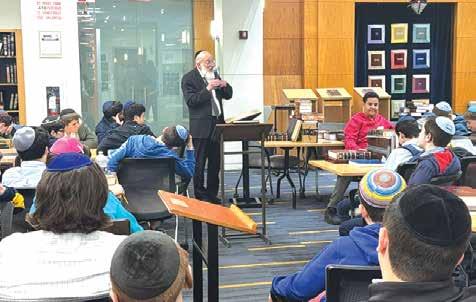
Visit Days at MTA/YUHSB were a resounding success, offering prospective students an unforgettable glimpse into the dynamic blend of Torah learning, academics, and extracurricular opportunities that define the MTA experience. From the warm community atmosphere to the engaging programs and inspiring faculty, the day left a lasting impression on all who attended.
MTA rolled out the red carpet for prospective talmidim, inviting them to immerse themselves in the vibrant environment of the yeshiva. The days began with a warm introduction and a delicious breakfast at Lake Como Pizza, setting an energetic tone for the activities ahead.
Each of the mornings kicked off with a spirited game of Family Feud: MTA Edition. Based on survey responses from current talmidim, the game provided a fun and humorous peek into MTA culture. The library buzzed with excitement as teams competed for prizes, with music pumping and the room filled with camaraderie.
Torah learning is the heart of the MTA experience, and each Visit Day offered a beautiful showcase of this central value.
Rabbi Daniel Konigsberg and Rabbi Benyamin Bortz delivered inspiring shiurim, giving prospective talmidim a taste of the depth, excitement, and warmth of MTA’s Judaic Studies program.
Next, students explored MTA’s extracurricular offerings during a “Pick Your Adventure” segment. They could choose from thrilling Robot Wars, a competitive robotics challenge, an action-packed hockey clinic in The Den, or a basketball clinic in the NCAA Max Stern Athletic Center. This segment highlighted the va-
riety of opportunities available to every MTA student.
Lunch was a delicious and meaningful experience, with catered food from Chickie’s and Smash House. Prospective students had the opportunity to meet rebbeim, faculty, and current talmidim, making it a time not just for nourishment but for connection and inspiration.
The highlight of the day took place in the Glueck Beis Medrash, where the talmidim had the privilege of meeting Rav Hershel Schachter, shlit”a. Each student had their photo taken with Rav Schachter while receiving divrei bracha from him. The program continued with words of inspiration from either Rav Mordechai Willig or Rav Aryeh Lebowitz, leaving the students uplifted and motivated.
Students then participated in two engaging classes led by MTA’s talented faculty, exploring topics in math and engineering. These sessions provided a hands-on look at the rigorous and exciting academic environment that MTA offers.
Visit Day concluded on a sweet note with a special treat of Rita’s Italian Ices. This relaxing moment allowed students to reflect on their experiences, unwind, and connect with their peers. As the day ended, each student received a magnet featuring their individual photo with Rav Schachter—a keepsake to remember the meaningful experience.
The Visit Days were an incredible opportunity for prospective students to see firsthand the unique and inspiring environment that makes MTA/YUHSB so special. We look forward to welcoming these future lions into our MTA family!

By Sarah Kalter
On Shabbos Parshat Lech Lecha, the HANC Junior girls enjoyed a grade-wide Shabbaton in Far Rockaway! The girls and HANC alumni advisors walked to shul Friday night and davened a beautiful Kabbalat Shabbat together. We enjoyed a delicious Friday night dinner hosted by our amazing rabbeim and morot. Following dinner, all the girls gathered at Morah Nathan’s house for an unbelievable Oneg with Morah Henoch, Morah Fink, and Morah Zaslowsky. The Oneg was filled with zemirot, ruach, bonding and inspirational stories about emunah.
On Shabbos morning, the inspira-
tion continued with davening Shacharit at shul and then off to Morah Zaslowsky’s apartment for a fun filled lunch! We heard incredible divrei Torah from our classmates and walked to Rebbetzin Feiner’s home to hear an inspiring and motivational shiur on emunah.
We wrapped up our uplifting Shabbaton with Seudat Shlishit at Morah Nathan’s home along with a dvar Torah from Rabbi Selengut about the parsha. Everyone enjoyed the special havdalah and had a great time bonding with our friends and teachers! Thank you to Morah Zaslowsky for all your hard work in planning this awesome Shabbaton! Thank you to all the hosts, morot, and rabbeim for having us!

“Names, Not Numbers” is a Holocaust education program developed by Tova Fish-Rosenberg and coordinated at Yeshiva Har Torah by Mrs. Rachel Leah Mittelman. Every year, rather than simply learning about the Holocaust in a traditional classroom setting, the “Names, Not Numbers” curriculum allows eighth graders to engage in a unique multidisciplinary learning experience that combines research, video production, interviews, documentary film tools, and film editing. Throughout the project, students work with writers, educators, and filmmakers. Initially developed as a high school curriculum, Yeshiva Har Torah is proud to have been one of the first junior high schools to participate in “Names,
This year’s Names, Not Numbers program at Yeshiva Har Torah has gotten off to a great start. The 8th graders were introduced to this transformative program through the annual opening event, giving the students a small taste of the experience they will have throughout the year. They watched a video about a Holocaust survivor and listened to a meaningful message about this generation being the last one to meet Holocaust survivors delivered by our Head of School, Rabbi Gary Menchel.
We have 35 students participating in this year’s program, and we are proud of their commitment to carrying on the legacy of these survivors.



Cedarhurst Fire Department Ex-Chief Robert Fitzgerald was recognized during an event at the Rockaway Hunting Club last week. Also attending were Chief Michael Belinson and other members of the Cedarhurst Fire Department, Congressman Anthony D’Esposito, County Executive Bruce Blakeman, Nassau County Legislator Howard Kopel, Hempstead Town Councilwoman Melissa Miller, Cedarhurst Village Mayor Benjamin Weinstock, Lawrence Village Mayor Samuel Nahmias, and Lawrence Trustee Tammy Roz.

On Thursday, November 21, HANC attended their first debate at HALB. Schools that participated included HANC, HALB, Flatbush, Har Torah, and Yeshivat He’Atid. Congratulations to Jacob Schoenfeld and
Jonathan Mark for coming in first place team, Jacob Schoenfeld for first place speaker, and HANC for coming in second place in school. We look forward to our second debate in February.

After severe water damage destroyed its gym, the extended YCQ family came together to rebuild with an incredible show of community support. Through a crowdfunding campaign, over $413,000 was raised with contributions from 1,173 donors and the hard work of 225 ambassadors. The gym, a central space for students,
special events, and family gatherings, will soon be restored better than ever, thanks to the dedication and generosity of donors and supporters. This amazing effort highlights the strength and unity of the community in creating a better future for its students.
Thank you to each and every person who made this possible!




On Yud Alef Cheshvan, Ohr Chana High School hosted a memorable Challah Bake, a unique event that celebrated the strength of women and the power of tradition. The event, held on Rachel Imeinu’s Yahrtzeit, provided a meaningful opportunity for mothers and daughters to bond over the mitzvah of challah baking.
The evening began with a creative candle lighting project, where participants crafted personalized crystal can-

dlesticks. These beautiful creations, along with custom-made acrylic hadlakos neiros, served as cherished keepsakes for each family.
Led by Mrs. Aminov, the Challah Bake itself was a spiritual and uplifting experience. Participants delved into the significance of each ingredient, lit candles, and davened together. The atmosphere was filled with joy and camaraderie as attendees mixed dough to the rhythm of uplifting music.

The event was a resounding success, drawing over 200 attendees, including 91 mothers and their daughters. The beautifully decorated venue, adorned in black and hot pink, created a festive ambiance. Each participant received a custom Challah Bake apron, adding to the sense of unity and shared purpose.
The evening concluded with a delicious dinner of hot Chinese food, providing a delightful culinary experience. This Challah Bake was more than just an
This week, Green Acres Mall hosted turkey distributions in partnership with elected officials to 20 local charitable organizations. In total, the mall supplied 1,020 turkeys which helped to feed over a number of families in the area.
Key community members including JCC Executive Director Stacey Feldman, Senator Patricia Canzoneri Fitzpatrick, Assemblywoman Michaelle Solages and Legislator Carrie Solages were among those officials that assisted Green Acres in donating these turkeys throughout the community.

The Thanksgiving giveaway reflects Green Acres’ commitment to supporting the community in meaningful ways. “In this season of gratitude, we are thankful for the opportunity to give back to our community,” said Joe Floccari, General Manager of Green Acres. “We want to make sure every family can enjoy a Thanksgiving meal in the spirit of kindness and togetherness.”
The turkeys were distributed as follows:
Assemblywoman Michaelle Solages’ office distributed 100 turkeys directly from her district office on North Central Avenue, and an additional 50 to churches and civic associations in the 22nd Assembly District. Legislator Carrie Solages distributed turkeys to Gateway Church, Elmont Cultural Center and Haitian United Foundation.
Senator Patricia Canzoneri-Fitzpatrick distributed turkeys to food pantry, Project Manna, in Inwood. Assemblyman Ari Brown distributed turkeys to
event; it was a celebration of tradition, family, and the enduring spirit of women. Come join our Ohr Chana experience. Let your academic journey come full circle with personal growth, family bonds and community connections. We are now taking applications for the 20242025 school year. For more information, please call (718) 426-9369 ext. 614.
Martin Luther King Community Center in Long Beach. Assemblyman Brian Curran distributed turkeys to Freeport Methodist Church. Councilwoman Melissa Miller distributed to Bethlehem Church in Valley Stream.
Councilwoman Laura Ryder distributed to Oceanside Community Services. Oceanside Community Service packed baskets for families in need, with turkeys from Green Acres inside. These baskets were delivered by students from Oceanside High School. Nassau County Comptroller Elaine Phillips distributed turkeys to Roosevelt Chamber of Commerce and Bishop Mackey Tabernacle of Joy Church in Uniondale. Commissioner Ryder distributed turkeys to Police Dept 5th precinct in Elmont and Police Dept 4th precinct in Hewlett.
The JCC Food Pantry of the Greater Five Towns picked up 150 kosher turkeys from Green Acres. Gabriel Boxer of Kosher Response received 50 kosher turkeys to distribute to community members in need.


By Adina Halali and Mitzi Samson
This past Shabbat, Parshat Chayei Sara, Shulamith High School juniors had a meaningful and fun-filled Shabbaton based locally in Woodmere. After beginning with a beautiful Friday night davening at Yismach Moshe, we headed to the school building for dinner together as a grade. After the meal, we had a really beautiful kumzitz
and then split up to play games and hang out at the oneg.
The next morning, we each had lunch at the homes we were hosted at, before rejoining as a full grade at shalosh seudos hosted by the Casdens. We played an awesome game testing our knowledge of obscure facts about our classmates and sang and hung out until havdala. It was so nice to unite as one as a grade for a Shabbat filled with warmth and joy.

Yeshiva University High School for Boys seniors recently showcased their research and public speaking skills in their U.S. Government and Politics course with their “Power of the People: The Vote!” projects. Working in teams, students researched and presented both sides of pressing voting-related questions, including: “Should voting be mandatory?” “Should felons lose their right to vote?” and “Should photo IDs
HALB Bnot Sheirut, Shoshana and Chen, recently went around the school playing games with students all about Israel. Students learned about the map of Israel and specific details about different cities, all while working as a team.


be required for voting?” Following their presentations, students facilitated engaging class discussions, encouraging critical thinking and debate on these important issues.
This project is just one example of the dynamic, thought-provoking learning that takes place at MTA, an academic environment that fosters leadership, debate, and a deep understanding of the world around us.

Last week, HALB students, faculty and parents joined together for a beautiful Challah Bake in memory of Alice Marks, a”h, in the merit of all the soldiers in the IDF and for all the hostag-
es to come home. Everyone enjoyed baking challah together followed by dancing and singing. It was an inspirational, meaningful and fun evening!

Shulamith’s 8th grade girls enjoyed an inspiring Shabbos together with a beautiful Friday night dinner, a mother-daughter Oneg with Rebbetzin Katzenstein, and an inspiring Shalosh Seudot! The night ended off with a beautiful havdalah and chesed project.



The HANC Middle School Boys’ Torah Bowl team was extremely excited to play in their first match at North Shore on November 14. The boys had put in weeks of studying and practice to prepare for their first matchups, and they performed very well. HANC defeated both Har Torah and the Silverstein Hebrew Academy of Great Neck. Hunter Zeitlin, Jake Lefkovich, Ethan Zelig, Netanel Rothberger, and Rafi Zurndorfer were all able to answer many questions, and in both of HANC’s losses, the game came down to the final question. The boys should be so proud of how well they
knew the information, and we are excitedly looking forward to the next Torah Bowl matchup on December 17, which will take place at Har Torah.
The HANC Middle School Girls’ team was so excited for their first meet last week at North Shore. They prepared well, reviewing the first three parshiot with Rashi from Sefer Bamidbar. Their hard work paid off as they continuously buzzed in, answering many questions during their games against Har Torah, Silverstein, North Shore, and Shulamith. They won games against Silverstein and Shulamith and tied Har Torah.


The final week of the JSL regular season by FM Home Loans brought intense matchups as teams battled fiercely for playoff seeding! The stage is now set as playoffs kick off this upcoming Sunday.
K/P Hockey: Smash House smashed expectations, edging out Bright Futures 10-9 in a nail-biter, with Azi Rosenberg scoring an incredible 5 goals. Naftali Jacobs scored 5 goals to keep it close to the end. Gerber Bedding tucked Growtha in for the night, claiming a dominant 10-0 victory as Gavriel Feinsod delivered a dazzling hat trick. Meanwhile, 5 Towns Central outlasted 5 Towns Landscaping in a tight 3-2 contest, where Abie Knoll’s incredible defensive efforts secured the win.
K/P Soccer: Better Image Contracting sealed a hard-fought 6-5 win over Maidenbaum, led by Yehoshua Berkovsky’s outstanding 5-goal performance. Hewlett Auto Body drove past Future Care Consultants with an overwhelming 10-2 win, highlighted by Levi Rose’s stunning 10-goal showcase.
Football: Newman Dentistry kept their winning smile intact with a thrilling 10-7 victory over Rides to Fly, thanks to Ethan Lowy’s 3-touchdown heroics. Beautox_AL defeated Tikva Fire 4-1, with
Levi Backman making a jaw-dropping game-sealing touchdown catch.
1st Grade: Wolf Phone Repairs rang up a win against Seasons Express with Ikey Grossman showcasing great twoway play. John’s Automotive sped past PlumbPro as Abi Marmorstein netted an amazing goal. Town Appliance turned on the heat to defeat Simcha Day Camp 100, powered by Gavriel Dorfman’s 4-goal effort.
2nd/3rd Grade: Smash House triumphed 7-5 over PIP Printing, with Betzalel Alton excelling defensively and scoring a full-court goal. Built By Nate hammered The Gallery 7-5, fueled by Ezra Levine’s 4 goals and Akiva Schreier’s 2 clutch tallies. SR Whee squeaked by Maidenbaum 7-6, thanks to Avromi Simon’s all-around brilliance. Newman Dental edged S.I.N.G. Entertainment 5-4, with Shlomo Aron anchoring their defense in the clutch.
4th/5th Grade: Smash House kept the momentum going with a 9-3 victory over BlueBird Insurance, with Yaakov Siegel netting 2 key goals and goalie Shlomo Greenspan standing tall. Target Exterminating swatted Marciano Pediatric Dentistry 7-2, as Yosef Goldfischer’s stellar defense led to countless scoring opportunities, and Avi Krigsman dazzled


in net. Town Appliance and Russo’s Pharmacy battled to a thrilling 5-5 tie. Shmuli Sitzer’s hat trick gave Town Appliance a late lead, but Russo’s Gavriel Levine fired back with 2 goals to even the score.
6th/8th Grade: Tikva Fire extinguished Extreme Vent Cleaning 5-4 in a heated contest. Binyamin Flegmann scored the go-ahead goal with 3 minutes left, while Tzvi Greenspan made crucial saves. NY Custom Closets closed the deal against Seasons 4-1, with Netanel Biegacz creating offensive opportunities and delivering a stunning assist.
Basketball
3rd/4th Grade: Russo’s Pharmacy filled their prescription for victory with a 12-8 win over Marciano Pediatric Dentistry, highlighted by Azaria Bush’s defensive dominance with 8 rebounds and 8 steals. Posh Home + Bath soaked Better Image Contracting in a shutout, thanks to David Bauman’s fabulous 12-point performance. Wieder Orthodontics were all smiles in their 15-3 win over John’s Automotive, where Judah Avigdor starred.
5th/7th Grade: DJ_CP spun past Emporio 29-26, led by Eitan Greenstein’s 10 points. Sperling Productions produced a show-stopping 42-11 victory over Smash House, with Moshe Gold sinking a halfcourt buzzer-beater and Lazer Roberts excelling on both ends of the court. Bin-


yamin Weissman Photography captured a thrilling 24-22 win against Tiffany Dry Cleaners in a tightly contested matchup.
Men’s Basketball
Yitzi Wieder powered Emporio to a narrow 60-57 victory over Wieder Orthodontics, showcasing his dominance on both ends of the court. Aron Azose shone bright for Growtha, delivering a commanding first-half performance to secure yet another win in his stellar season. Meanwhile, Abie Perlow was an unstoppable force in the paint, leading Hewlett Auto Body to a decisive victory.

By Alana Rubensohn
Last Tuesday, HANC high school girls commemorated the yahrzeit of Rachel Imeinu with a meaningful challah bake. The program began with an inspiring dvar Torah from Morah Fink on the significance of Rachel as one of our Imahot. She shared how Rachel chose to be buried alone by the roadside, separate from her family, so she could be there to help her children – Am Yisrael –during their hardest times. This is a powerful lesson for us to hold onto, especially now with everything happening in Israel, reminding us that Rachel is always there to protect all of our nation.
The program continued with Morah

Feder, who spoke about the special mitzvah of challah for women and how it serves as a segulah for alleviating life’s challenges. Together in groups, we made the bracha, rolled and braided our challahs, and added our favorite toppings. Hope everyone enjoys their delicious challahs for Shabbat!
Three exceptional students from Ezra Academy—Yosef Khaimov, Chana Movsikov, and Daniel Boruchov—recently represented their school at the second annual Model Chinuch Competition, hosted by Ma’ayanot. This prestigious event, designed to inspire a passion for teaching among young Jewish leaders, challenged participants to prepare and present a ten-minute lesson plan rooted in Torah sources. With a focus on meticulous preparation, engaging delivery, and meaningful content, the competition encouraged students to hone essential skills for becoming future teachers, rabbis, and morot.
Ezra Academy takes great pride in the dedication of Yosef, Chana, and Daniel, who sacrificed their personal time to immerse themselves in this opportunity. Their commitment to the competition is a testament to their passion for Torah learning and their willingness to rise to the challenge of presenting in a public forum. Each of the three students excelled in their presentations, demonstrating not only their knowledge but also their creativity and ability to connect with an audience.
Participation in the Model Chinuch Competition provided these students with invaluable skills. Through the pro -

cess, they enhanced their public speaking abilities, deepened their understanding of Torah values, and learned the importance of preparation and clarity in teaching. These experiences will undoubtedly benefit them in their future endeavors, whether in the realm of education or beyond.
Ezra Academy is proud to see its students embody the school’s values of hard work, passion for Torah, and leadership. The achievements of Yosef, Chana, and Daniel underscore the school’s commitment to nurturing well-rounded individuals who can inspire and lead in the Jewish community. Their success at the competition reflects the potential of Ezra Academy students to shine as future educators and leaders.




Light Up Your Chanukah with a Dream Menorah from “Hazorfim” — And Save Big!
This Chanukah, elevate your celebration with the stunning sterling silver menorah you’ve always dreamed about. Hazorfim, the world-renowned name in silver art and Judaica, invites you to illuminate this Chanukah with timeless elegance.
Shop now and save! From now until Dec. 28, enjoy exclusive deals on selected menorahs – an opportunity you won’t want to miss!
For over 70 years, the Hazorfim name has been synonymous with fine craftsmanship, creating silver treasures that grace Shabbos and Yom Tov tables worldwide. Each piece is of unparalleled quality, with Hazorfim menorahs acknowledged globally for their variety of creative designs, offering something for every style and taste.
Under the visionary leadership of master silversmith Yakov Merdinger, Hazorfim’s workshops in Israel, Italy and other European countries bring artistry to life. With meticulous care and time-honored techniques, they produce unique, original menorahs each year, introducing 20 dazzling new designs to an already magnificent collection.
Only Hazorfim items carry the original ISI certificate, which testifies to the qual-
In an increasingly digital world, staying relevant and accessible is key. And HAFTR is doing just that. Motivated by the tremendous success of its Seder Moed siyum this past March, HAFTR Mishna Yomi has seen an explosion of sign-ups and increased participation, spearheaded by Nursery-Middle School Mashgiach Ruchani Rabbi Asher Klein. The program has grown into a movement, with an estimated 100 students participating regularly, fostering a culture of pride, commitment to learning, and community within the HAFTR family.


ity and authenticity of the item as well as to the quality of the silver. Hazorfim also sells directly from the manufacturer to the customer, which means the lowest prices and best value for customers all over the world.
Don’t wait – make this Chanukah unforgettable with a Hazorfim menorah, a masterpiece to treasure for generations. Shop now and save!
You are invited to browse in person at the Hazorfim Williamsburg branch at 67 Lee Ave or visit www.hazorfim.com to purchase by phone/WhatsApp and have it delivered to your door. Just call 1-800551-8068.
HAFTR is excited to announce the upcoming launch of a dedicated digital hub for the Mishna Yomi learners on its website – created in response to enthusiastic demand from students and parents alike. This new resource will archive video lessons by date and topic, making it simple for students to access each day’s Mishna or revisit previously learned material anytime, anywhere. Whether at home or on the go, those learning can now stay engaged with the daily material, even if they miss a day or two, ensuring that their connection to Torah study remains strong and uninterrupted. Students are eager to use the library.
“Parents and students have expressed incredible enthusiasm for Mishna Yomi, and we wanted to give them a tool that makes Torah learning a lasting expe -
rience,” Rabbi Klein commented. “But most importantly, we hope that this accessibility will inspire even more signups, allowing our HAFTR community to grow in Torah learning.”
As the Mishna Yomi community continues to grow, the program stands as a testament to HAFTR’s commitment to lifelong learning and strengthening the HAFTR community’s dedication to Torah. HAFTR’s investment in this online learning hub marks a major step forward in making its Jewish education accessible, engaging, and dynamic.
We look forward to the continued success of HAFTR Mishna Yomi and seeing the enduring impact of Torah study across HAFTR.
In connection with HANC’s lessons on fall and Thanksgiving, Morah Alana from Tevah V’Torah transformed her classroom into a Pumpkin Patch. Our Early Childhood “farmers” learned all about pumpkins through songs, books, and sensory activities. They noticed the details of the pumpkins, how some are big while others are smaller, some are bumpy and a few felt smooth. Each one is unique and has its own special qualities, just like all of us! They finished the lesson by placing their hands inside of the pumpkins and making sticky pumpkin slime. We don’t throw away the leftover pumpkins, we planted the seeds and composted the rest!




The annual Torah Miles Auction at YOSS took place this week. The program focuses on Bachurei Chemed, vacation learning, and excellence on parsha. As usual, the most sought out item at the auction was the Shas. But there were lots of other great
prizes like the giant bean bag chair and an MLB signed baseball, to name a few. Special thanks to Rabbi Greenberg’s shiur for running the auction. Good luck to everyone, and remember to keep racking up those Torah Miles as we look forward to the Torah Miles Sale in the spring!



With the election to determine the next president of the United States settled, students at Plainview’s Mercaz Academy turned their attention to a more important contest: electing the officers on the school’s Student Council. These leaders will guide the school through the year, working to improve the lot of all Mercaz students, and many qualified candidates put themselves forward for consideration. After a frantic week of campaigning, the student electorate gathered in the auditorium on November 13 to hear presentations from the candidates. This year, a new office was added to the roster, that of Director of Volunteers.
A lengthy roster of candidates emerged this year, running on platforms such as more field trips, sushi for school lunch, Teacher Prank Day, and “a day for kids to do whatever they want.” Candidates also offered excellent ideas on worthy causes to support, ways to pro-
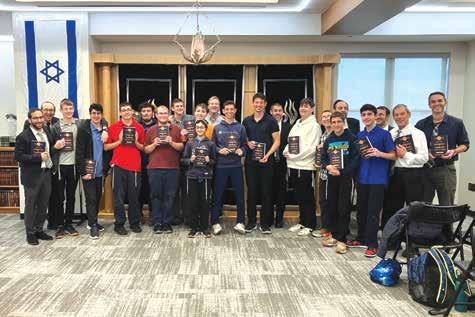
Rambam Mesivta is committed to providing students with a wide range of extra Torah learning occasions that enhance their Torah studies and personal growth.
mote both kindness and tzedakah, and encouraging the performance of mitzvot through raffles and other rewards.
Apart from fostering school spirit, the process of Student Council elections promotes our students’ involvement in the democratic process and cultivates leadership and public speaking skills. Although those eligible to run for office were exclusively fifth and sixth graders, the voting franchise extended down to the first grade. Except in the first grade, where choices were indicated by a show of hands, voting was electronic. All candidates, regardless of the outcome of the race, are welcome to participate in the Student Council, so fortunately, none of these ideas will be lost.
Members of the winning slate are looking forward to fulfilling their mandate, and the elementary school students are eager to see the new, improved Student Council in action.
The Masmidim Extra Learning Program offers enriching learning opportunities, including Monday and Tuesday night and lunchtime learning sessions with Rabbi Avi Haar, Assistant Principal. Rabbi Haar is currently helping to prepare a select group of students for the YU-NCSY Bronka Weintraub Bekiut Program. As a special recognition of their dedication to learning, the Masmidim students were gifted a copy of Shirei Yedidos: Parshah & Tehillim Hand in Hand, written by Reb Yerachmiel Goldman. Rabbi Goldman, known for his teachings, has hundreds of lectures available on TorahAnytime.com and was recently featured on the Tehillim Army Podcast. He plans to visit the Masmidim soon to speak with them directly about their learning journey.
Additionally, Rabbi Daniel Mechanic of Aish and Director of Project Chazon, recently visited to speak with the senior class about making major life decisions through a Torah lens. This special session, sponsored by Principal Mr. Hillel and Mrs. Deena Goldman, lasted two hours and aimed to help students navigate pivotal decisions, such as choosing a yeshiva in Israel, selecting a career, and approaching marriage. Drawing from his own life experiences and extensive work in Kiruv, Rabbi Mechanic offered valuable insights, guiding the students
on how to grow as Torah Jews while confronting modern challenges in the workplace.
Halacha Yomi led by Rabbi Ilan Schimmel, Director of Israel Guidance and Rebbe, is already going full steam ahead, with a current focus on the halachot of shaving. Rabbi Schimmel began by presenting primary sources and verses from Sefer Vayikra, exploring the Issur behind the prohibition of shaving. He introduced an Iben Ezra, followed by a discussion on the Rambam’s perspective. The shiur became interactive, with questions posed to the students, and fellow Gemara Iyun teacher, Rabbi Yossi Ziskind. Together, both rebbeim and students engaged in a lively discourse, posing answers to these questions and deepening the discussion which will conclude with an in-person wrap-up featuring Rabbi Schimmel and delicious snacks
Rabbi Dr. Andrew Sicklick’s Parsha Yomi has launched a new initiative, diving into Rashi and other Meforshim on a weekly basis. Rabbi Dr. Sicklick’s Parsha Yomi program runs throughout the week, culminating in an in-person shiur on Friday, accompanied by an opportunity for students to take optional quizzes to test their knowledge and earn special prizes. Students who complete the program can earn Parsha Yomi Certificates of Completion.
Extracurricular Learning activities continue throughout the week, making Rambam a 24/7 Makom Torah with something for everyone to learn.
TBy Rabbi Meyer Yedid
here’s a pasuk in Shir HaShirim (8:9) that I hope no one will forget after they understand its depth. Shlomo HaMelech in Shir Hashirim (8:9) wrote cryptically, If she is a wall, we can build upon her a palace of silver. If she is a door, we can construct upon her cedar panels
What did Shlomo HaMelech, the wisest of all men, allude to here?
He’s teaching us that every person must ask himself or herself: Am I a wall or a door?
A wall is a solid, impenetrable barrier. If you are a wall, then when you instruct your children to do something, they don’t try to challenge you, just as they wouldn’t try to walk through a wall. If that’s the case, then you can build a “palace of silver” — i.e., a strong and beautiful edifice — upon that wall.
A door, on the other hand, might look as solid as a wall, but if you turn the handle and push, you can suddenly pass to the other side. If your rules are like doors, because you waver as to when you enforce them and when you will be lax and permissive about them, then you will be able to construct only “cedar panels” — i.e., a flimsy building — upon them.
Now, parents must carefully consider what to allow and what to prohibit in their homes. Parents often make the mistake of saying no too often, and then they have a list of rules that is so extensive that it’s nearly impossible to enforce. So it’s not always the right thing to say no. But if you did say no, you have just added an element to your house. The question is whether that element will be a wall or a door. Will you make that an impenetrable barrier, or will you waver about it, like a door swinging back and forth?
A father or mother or teacher or rabbi who is a door makes rules, but just as someone who has the key to a door can
enter through it, if children can find the “key” — kicking and screaming, arguing, crying, or whatever — they can bypass the rule.
When children see that you are a door, all that can be built upon you is a paneled room. Your children won’t have strength, and they won’t have beauty.
But if you are a wall, and your children realize that your rules are impenetrable, then you can build a silver palace — your children will exhibit beauty and strength.
How does this work?
Did you ever watch a person who suddenly realizes that he is locked out of a door? First he’ll try banging on the door to try to get someone to open up. When he realizes that no one hears him, he tries kicking the door or jiggling the handle to see if he can get it to open. Sometimes he’ll even take out a credit card and try to “break and enter.” He can spend an hour at it, growing more frustrated with each failed attempt.
Did you ever see someone try this at a brick wall? No one screams and kicks at it to try to pry it open. If you would see a person trying to do that, you would probably call an ambulance to send that person straight to the psychiatric ward.
What’s the difference between the two?
It’s obvious to everyone that you can’t break through a wall, so no sane person tries. But a door presents you with a valid chance to get to the other side, so you try.
A child who sees that his parents are walls lives in comfort. He knows that whatever his parents say is final, and he doesn’t have to get frustrated trying to break through their rules.
What happens in many homes, though, is that you make rules, and then the children start to cry or scream or beg. Maybe you have a headache and can’t handle the noise, or maybe it’s just that you want to see your children happy, so you decide to relax the rule. Perhaps
you even think that you are doing a great deed, sacrificing yourself for the sake of your children’s happiness. What’s actually happening is the opposite — you’re making them more miserable in life. Because the next time they bump into one of your rules, rather than just accept that it’s final, they’ll try to soften you up again. But perhaps that rule will be more important to you, or it will just be a better day and you won’t mind dealing with the crying, so you will refuse to back down. They will then spend an hour — or perhaps multiple hours or even days — trying to get you to change your mind. And they will be miserable throughout that time.
What every parent must do, then, is to stick to the rules they set.
You can be nice about it.
You can say, “I don’t want to be a dictator, but I have to insist that you follow this rule for your own good.” What you’ll find, as a result, is that your children will be much happier. You’ll give them instructions, and they’ll follow them happily, because they know that there’s no point in arguing with you. No one gets

frustrated when they can’t get through a wall in their path.
Reprinted from Power of Chinuch Volume 2, by Rabbi Meyer Yedid with permission from the copyright holder, ArtScroll Mesorah Publications.





Match the language with the corresponding word that they use for “thank you”

1. Dankie
2. Aahalo
A. French
B. Latin
3. Köszönöm C. Hungarian
4. Spasibo
5. Grazie
D. Afrikaans
E. Arabic
6. Gratias tibi F. Yiddish
7. Merci
8. Adank
9. Ngiyabonga
10. Shukraan
G. Italian
H. Hawaiian
I. Russian
J. Zulu
Answers: 1-D; 2-H; 3-C; 4-I; 5-G; 6-B; 7-A; 8-F; 9-J; 10-E
Moishe was furious when his steak arrived too rare.
“Waiter,” he shouted, “didn’t you hear me say ‘well done’?”
“I can’t thank you enough, sir,” replied Yankel the waiter. “We hardly ever get compliments here.”
*** Why did the turkey cross the road?

Because it was Thanksgiving Day, and he wanted people to think he was a chicken!
There was a man walking in the desert. It was an especially hot day that day. In the distance, the man suddenly saw a restaurant. He rejoiced and ran to the restaurant and immediately asked the waiter for a glass of water. Instead, the waiter pulled out a gun and pointed it at the man’s head. The man replied with “thank you.” Why was the man so appreciative?
Answer: It was a water gun.

1. Which of the following is a real Turkish word?
a. Gülümk
b. Mifso
c. Gulup
d. Muvaffakiyetsizleştiricileştiriveremeyebileceklerimizdenmişsinizcesine
2. What is the capital of Turkey?
a. Istanbul
b. Ankara
c. İzmir
d. Jalalabad
3. Turkish President Recep Tayyip Erdogan built himself a new palace in 2014. What was the approximate cost of building the palace?
a. $42 million
b. $107 million
c. $640 million
d. $1.2 billion
4. How many countries border Turkey?
a. 3
b. 4
c. 8
d. 12
5. What is traditionally served alongside Turkish coffee?

a. A glass of water
b. Sugar cubes
c. Tea biscuits
d. Snuff tobacco
6. Modern day Turkey was created in 1923, when the Ottoman Empire ended.

Approximately how long did the Ottoman Empire last for?
a. 30 years
b. 600 years
c. 1,200 years
d. 1,500 years
Answers
1-D. It means, “As though you are from those whom we may not be able to easily make into a maker of unsuccessful ones.” Huh? I think it’s easier to understand Muvaffakiyetsizleştiricileştiriveremeyebileceklerimizdenmişsinizcesine!
2-B
3-C. Erdogan’s home is 30 times the size of the White House and is believed to be the largest palace built, anywhere in the world, for more than 100 years. $9 million was spent on red carpets and another $6.5 million was spent on 400 pairs of 10-foot-high double doors.

4-C. The eight countries that share a border with Turkey are Armenia, Azerbaijan, Iran,
Iraq, Syria, Bulgaria, Greece, and Georgia.
5-A. A small glass of waly served with Turkish coffee because drinking water before coffee helps the taste buds feel the real taste of coffee, and after that it helps to rinse your throat from the unfiltered pieces of coffee.
6-B. At its height, the Ottoman Empire encompassed most of southeastern Europe to the gates of Vienna, including present-day Hungary, the Balkan region, Greece, and parts of Ukraine; portions of the Middle East now occupied by Iraq, Syria, Israel, and Egypt; North Africa as far west as Algeria; and large parts of the Arabian Peninsula. From 1914 to 1923, the Ottoman Empire exterminated and exiled 1.5 million Armenians (an ethnic group in Turkey), in a slaughter that is now known as the Armenian Genocide.
5-6 correct: Let me guess—you probably know how to spell Muvaffakiyetsizleştiricileştiriveremeyebileceklerimizdenmişsinizcesine, too.
2-4 correct: You’re a little sleepy. You may want to try some Turkish coffee.
0-1 correct: How do you celebrate Thanksgiving if you don’t even know anything about the country that we are celebrating?
Rashi, quoting Midrash, says that Eisav “haunted” his father with his pious speech and cunning conversation. Yitzchak is fooled by Eisav and believes that Eisav, the man of the world and the physically powerful figure, is better suited to carry on Avraham’s vision than is Yaakov, the more studious and apparently more simple of the brothers.
The other opinion, more popular among the later commentators to the Torah, is that Yitzchak is aware of the shortcomings of the behavior and attitude of his elder son. His desire to give the blessings to Eisav is due to his wish to redeem and save his son and to enable Eisav to turn his life around and become a worthy heir to the traditions of his father and grandfather. He thinks that by somehow giving the blessings to Eisav, Yaakov will not really suffer any disadvantage in his life’s work, while Eisav will find his way back to holiness

By Rabbi Berel Wein

through the blessings that he received.
These two divergent attitudes towards the wayward child in Jewish families is one that is enacted daily in Jewish family life. Later “Yitzchaks” either willfully allow themselves to be deluded
blessings will somehow accomplish any major shift in his chosen lifestyle. To a great measure, she adopts a policy of triage, saving Yaakov and blessing him while thus abandoning Eisav to his own chosen wanton ways.
There are few pat answers to varying and difficult situations.
regarding the behavior and lifestyle of children or they are aware of the problem and attempt to solve it with a giving nature and a plethora of blessings.
Rivka, Eisav’s mother, is not fooled by her son’s apparently soothing words nor does she believe that granting him
The Torah does not record for us the “what if” scenario – what if Eisav had received the blessings would he then have been different in behavior and attitude, belief and mission. However, from the words of the later prophets of Israel, especially those of Ovadiah, it appears
to be clear that G-d somehow concurred with Rivka’s policy and holds Eisav to be redeemable only in the very long run of history and human events.
The verdict seems to be that one must be clear-eyed and realistic about the painful waywardness and misbehavior of enemies of Yaakov, be they from within or without our immediate family and milieu. There are many painful choices that need to be made within one’s lifetime and especially in family relations.
There are few pat answers to varying and difficult situations. Perhaps that is why the Torah itself does not delve too deeply into the motives of Yitzchak and Rivka but is content merely to reflect the different emotional relationships each had with their two very different sons. The Torah emphasizes the role that human emotions play in our lives and does not consign all matters to rational thought and decision-making.
Shabbat shalom.

Ihave been replaying a conversation from earlier in the week over and over again in my mind. As I review it, I think of things I wish I could have said at the time. I know many people can relate to this. I spoke with a young mother a few years ago who comes from a non-observant home. She is having some difficulties with her two sons. It appears that one of them may have to leave his yeshiva and she does not believe this is fair. She told me that although she regrets feeling this way, she is sometimes jealous of her non-observant brothers and sisters. Their lives seem simpler and, often, happier than hers.
With this conversation in mind, I thought about a seemingly incomprehensible pasuk in the parsha. Yitzchak, the tzaddik who barely had a foothold in this world after he was bound and ready to give his life as a sacrifice to Hashem, says to his older son Eisav (Bereishis 27:3-4), “Now, lift up your tools, your sword, and your bow, and go out to the field and trap game for me and make me delicacies like I love and bring them to me and I will eat so that I may bless you before I die.” How could Yitzchak, who was barely connected to the physical world, say Eisav should bring him “delicacies like I love”? That is what Yitzchak loves?
The rivalry between Yaakov and Eisav ran very deep. Rashi says on the pasuk (ibid. 25:22), “And the children struggled within her,” that “they were struggling with one another and fighting over the inheritance of two worlds.” Chazal teach (Tana D’vei Eliyahu Zuta 19) that Yaakov and Eisav reached a negotiated compromise: “At that time, Eisav took this world, and Yaakov took the World to Come.”
Chazal do not treat this agreement as some sort of hyperbolic device. They

By Rav Moshe Weinberger
Adapted for publication by Binyomin Wolf

take it so seriously that the Midrash relates the following regarding an event many years later: “When Yaakov came from Lavan’s house and Eisav saw Yaakov’s children, slaves, and maidservants, Eisav said to Yaakov, ‘My brother, did you not say to me that you would take the World to Come? Where did you get all of this money? You are using this world like me!’”
Eisav expected to find that Yaakov was impoverished. So he had a good question. Aren’t we supposed to have no portion in this physical world?
There is a fundamental teaching by Rav Yechiel Yaakov Weinberg, the Sridei Aish, zt”l, that is very helpful in understanding this question. The Sridei Aish borrows the terminology from the word “tune – taam,” which refers to the tune we use when reading the Torah. There is the lower tune, taam tachton,
and higher tune, taam elyon. The lower tune is used for most of the year and the higher tune is used when reading the Aseres HaDibros, the Ten Commandments. Noting the fact that the word for “tune – taam” also means “taste,” “reason” and “meaning,” the Sridei Aish says that the lower tune refers to the taste and enjoyment one feels from things in this world, and the higher tune is the deeper reason, meaning, or depth behind things of this world.
Eisav, and his progeny, are satisfied with the lower tune, the physical, emotional, or intellectual enjoyment found in worldly things. This might be a sizzling steak and cold beer in front of a football game. Or it could be a visit to the Metropolitan Museum of Modern Art, the symphony, or a great work of literature or philosophy. The geshmak – enjoyment – he finds in those things
is enough for him. He can fully connect with these things. A Jew can also try to throw himself into these things. He may believe, even until a few moments before he leaves the world, that the lower tune was all he needed to feel fulfilled. But at that last moment of his life, somewhere deep inside, he realizes that there was a higher tune, a deeper reason for his life that he never connected with, that remained hidden during his lifetime. A person who has only connected with the lower tune cannot understand how a Jew can find meaning for his life, not to mention a delicious taste, in the study of Gemara, Rashi, and Tosafos. And while a Jew who lives for a higher plane of existence may work, have a home and even enjoy a football game, he cannot understand how anyone could find their entire meaning and reason for existing in those things. He knows that (Devarim 8:3), “Man does not live on bread alone. Rather, man lives on everything that comes from the mouth of G-d.” He knows from personal experience what Dovid HaMelech meant when he said (Tehillim 34:9), “Taste and see that Hashem is good.”
Eisav was upset and jealous when he saw that Yaakov was not living in poverty. He had no idea that living for the higher tune, living for a deeper meaning, does not mean deprivation in this world. He did not know that it simply means not living for this world even as one lives in this world.
The division Yaakov and Eisav made in their youth meant that one would live to eat while the other would merely eat to live. But eating to live does not mean that one must starve. It only means that one lives for something much deeper and more sublime than eating. Eisav could not tolerate that Yaakov was able to taste something otherworldly in a
piece of Shabbos fish right here in this world.
It once happened on a hot summer day in July 1866 that the fourth Rebbe of Lubavitch, Rav Shmuel, known as the Rebbe Maharash, zy”a, was sitting and learning in a shaded trellis in the garden adjacent to his home. His two sons, five-year-old Sholom DovBer, who would become the fifth Rebbe of Lubavitch, the Rebbe Rashab, zy”a, and six-year-old Zalman Aharon, who would become the tzaddik known as the Raza, zy”a , were playing nearby. The two of them, little Sholom DovBer and Zalman Aharon, were having a debate regarding the difference between a Jews and non-Jews.
The older brother, Zalman Aharon, maintained that Jews were different from non-Jews because they are a “wise and understanding people” (Devarim 4:6) who could study much Torah, both revealed and hidden, and daven with great attachment – d’veikus. Little DovBer challenged this assertion: “But this is only true of those Jews who learn and daven. What about Jews who are unable to study and who do not pray with d’veikus? How are they different from a non-Jew?” Zalman Aharon had
no answer to this challenge.
Their sister told the Rebbe Maharash about the debate, and the Rebbe called the boys over. He then asked little DovBer to call Bentzion to join them in the trellis. Bentzion was a servant in the Rebbe’s home who could barely read Hebrew and mispronounced almost every word. He barely said anything in the siddur, but he said the entire book of Tehillim every day, davened three times per day in shul, and was careful to be in shul whenever Ein Yaakov, a compilation of the stories and ethical teachings from the Gemara, was being taught.
The Rebbe asked Bentzion, “Did you eat today?”
“Yes,” Bentzion replied.
“Did you eat well?”
Bentzion answered, “What does ‘well’ mean? Baruch Hashem, I am full.”
The Rebbe then asked him, “And why do you eat?”
“So that I may live.”
“But,” the Rebbe asked, “why do you want to live?”
Bentzion paused for a moment, a tear fell from his eye, he sighed, and then answered, “To be a Jew and do what G-d wants.”
The Rebbe thanked Bentzion for
coming and asked him to summon Ivan the coachman, who was not Jewish, on his way out.
Ivan, who had grown up among Jewish people, spoke Yiddish perfectly. When he arrived, the Rebbe Rashab asked him, “Did you eat today?”
“Yes.”
“Did you eat well?”
“Yes.”
“And why,” the Rebbe asked, “do you eat?”
“So that I may live.”
“And why do you want to live?”
“To take a swig of vodka and have a bite to eat,” replied Ivan.
“Thank you,” the Rebbe said, “you may go.”
Although Eisav thought when he expected to find Yaakov Avinu wallowing in poverty, the difference between a Jew and a non-Jew is not entirely apparent until the very last question, “And why do you want to live?” Both of them may have a portion in this world. The difference lies in the meaning behind one’s involvement in this world. Is this world an end unto itself? Or is it a means to something much richer and deeper?
I have no doubt that the brothers and sisters of the woman who called me ear-
lier this week are lovely, nice people. But the likelihood is that the smiles on their faces are animated by the lower tune, the physical, emotional, and intellectual enjoyments of this world. But there is a deeper, abiding satisfaction that comes from living with the higher tune, a deeper meaning, irrespective of whether those worldly blessings are present. A Jew must constantly come back to the why and not live for the what May each of us merit to work on refocusing our lives on the higher tune, the more sublime meaning in the physical and emotional blessings, objects, and activities of this world. I pray that with the joy on our faces as we live for something deeper than earthly life, we will merit to see “When Hashem returns His people to Tzion, we will be like dreamers. Then our mouths will be filled with laughter and our tongues with joyous song” (Tehillim 126:2) with the coming of Moshiach, may he arrive very soon!
Rav Moshe Weinberger, shlita, is the founding Morah d’Asrah of Congregation Aish Kodesh in Woodmere, NY, and serves as leader of the new mechina Emek HaMelech.


By Rabbi Shmuel Reichman
No one knew what to do. The homeless man had charged straight through the lobby of a major office building in New York City, immune to the protests and questions of the well-dressed staff and security guards. “Excuse me, you can’t go in there,” protested the secretary, but to no avail. He stomped right past her, entered the elevator, and rode straight up to the penthouse, where he met the CEO’s private secretary. “Do you have an appointment? You can’t just barge in here like that,” she said with a distinct edge of alarm. But before she could finish her sentence, he stomped past her as well. Bursting into the CEO’s office, the homeless man sat down opposite the CEO, put his feet up on the desk, and smiled.
“Hi Dad,” he said. “How are you doing?”
“Son, I’ve told you a thousand times, you are not welcome here. You are an embarrassment and a disgrace. Look at yourself! When was the last time you showered; when was the last time you ate a meal? All you do is hurt yourself and waste away your life. I gave you every opportunity in life, I opened every door for you, and gave you everything you could possibly want. But you’ve thrown it all away, and now look at you. You are a failure and a disgrace.”
The homeless man nodded, as if he had heard this speech hundreds of times. “You’re one to talk, Dad. You might have made it big in finance, but where were you for your family? Where were you during my childhood when I needed you most? You missed my birthdays, school events, and celebrations. I can’t remember the last time you showed up to anything that wasn’t a business meeting! You’re so caught up in being ‘successful’ that you have no idea what life is actually about. How much of

life have you experienced? What has all your money, success, and fame brought you other than stress and worry? I may not have made anything of myself, but at least I know how to enjoy life! At least I know how to live in the now, to enjoy what I’m doing. Can you say the same?”
This argument is rehashed year after year. CEO and homeless son, success and failure. But which is the success, and which is the failure? Some think the CEO is right, while others relate to the son’s emotional plea. Many think they’re both wrong. A few think they’re both right. But maybe they’re both wrong and they’re both right.
The Torah is not only a guide to living a life of truth within the physical world; it is also the literal blueprint and DNA of this physical world. Our physical world is a projection and emanation of the deep spiritual reality described by the Torah. This is the meaning of the Midrash, “Istakel b’Oraisa u’bara alma — [Hashem] looked into the Torah and used it to create the world” (Bereishis
Rabbah 1:1). The physical world is an emanation and expression of Torah, the spiritual root of existence. As such, every single word of Torah is of infinite importance.
The Rambam (Mishneh Torah, Teshuvah 3:8), in line with this idea, explains that if one rejects a single letter of the Torah, it is as if he has rejected the entire Torah. The Ramban explains in the introduction to his commentary on Bereishis that the entire Torah is one elongated shem Hashem (name of G-d) — one interconnected sefer, a single organic entity. Just as a single missing chromosome can affect an entire human being, the same is true for a Sefer Torah. Even a single missing letter renders the entire text pasul (invalid). Every single word and letter in the Torah is absolutely fundamental.
If this is true, the Torah’s detailed description of Klal Yisrael’s journey through the Midbar is puzzling. At the very end of Sefer Bamidbar (at the beginning of Parshas Masei), the Torah uses forty-nine pesukim to list, one by one, the various places that the Jew -
ish people passed through along their journey in the Midbar. In the majority of these places, nothing of note occurred; the Jewish people simply passed through. Why is it necessary to mention every single place, every single stage of our journey?
There are several deep themes related to these encampments, from which we can learn inspiring and profound ideas. While each theme will be developed separately, they also interconnect into a greater whole.
Although we often focus on the end result, every single step of a process is of critical importance.
If we truly understood the power of this idea, our view of time and potential would forever change. Consider, for example, a single day of your life. Your day begins with infinite spiritual potential with 86,400 seconds to utilize. At the very beginning of every day, you have the ability to learn new ideas, improve your relationships, and achieve any number of accomplishments. After one thousand seconds of your day have passed, whatever you accomplished of that time — of that potential — is real, and the rest is lost. However, the potential for the remaining 85,400 seconds is shaped by how you spent the first thousand seconds. If you spent them well, taking full advantage of your time, sharpening your mind and awareness, and building positive momentum, then you now have access to a higher version of yourself with which to continue building and creating your life. If you thought unempowering thoughts or failed to create a positive trajectory — instead choosing to engage in any number of self-destructive activities — then you have set yourself up for a very difficult
journey ahead, perhaps diminishing the quality of potential for the rest of your day (and if taken to the extreme, this limitation of potential may even apply to the rest of your life).
Every thought, word, action, and decision have infinite, cosmic reverberations and repercussions. This may be overwhelming to consider, and it may be unhealthy to continuously fixate upon the severity of each infinitesimal aspect of our lives, but the truth remains nonetheless. We should therefore contemplate this, as this realization will help awaken us to the importance of everything, something truly crucial to recognize. Every single step in our journey creates ripples throughout every aspect of our lives. This is an example of true oneness, and this is the importance of every step. We can now begin to appreciate why the Torah includes every single step of Klal Yisrael’s journey.
There is a story of a man who wanted to climb a mountain. He calculated that it would take him roughly a month to reach the top, so he bought the supplies, packed the food, and started his climb. About two weeks into his climb, he saw
a helicopter in the distance. As the helicopter got closer, the pilot slowed down, lowered his window, and called out, “Are you OK? Where are you heading?”
The man shouted back, “I’m great! I’m climbing this mountain.”
Intrigued, the pilot responded, “Really? How long have you been climbing?”
“About two weeks,” he replied. “I have about another two weeks to go.”
The pilot thought for a second and had an idea. “Why don’t you hop on
tionships, we want to have deep and intimate connection. But the goal of life is not to be perfect or achieve all your goals instantaneously, because you will never “be” perfect. The goal of life is to become perfect, to endlessly strive for more. You will never arrive at perfection, but you can get closer and closer every day. The goal is not to be on top; it’s to climb a little more every single day.
So many people hate the journey of growth because they want nothing more
Your day begins with infinite spiritual potential with 86,400 seconds to utilize.
board, and I’ll fly you to the top. This way you’ll save so much time!”
He smiled, shook his head, and explained, “I don’t want to be on the top, I want to climb to the top.”
Very often, we want to be perfect. We don’t want to learn, we want to know; we don’t want to exercise, we want to be healthy; we don’t want to build our rela-

than to be at the destination. The journey of growth is only enjoyable when you learn to enjoy the journey itself. When you fall in love with the process of growth — when you look forward to the daily struggle, to the incremental stages of progress, to each tiny step forward — that is when you find true happiness. In our next article, we will delve deep -
er into this fascinating topic and try to understand it on an even deeper level.
Rabbi Shmuel Reichman is the author of the bestselling book, “The Journey to Your Ultimate Self,” which serves as an inspiring gateway into deeper Jewish thought. He is an educator and speaker who has lectured internationally on topics of Torah thought, Jewish medical ethics, psychology, and leadership. He is also the founder and CEO of Self-Mastery Academy, the transformative online self-development course based on the principles of high-performance psychology and Torah.
After obtaining his BA from Yeshiva University, he received Semicha from Yeshiva University’s RIETS, a master’s degree in education from Azrieli Graduate School, and a master’s degree in Jewish Thought from Bernard Revel Graduate School. He then spent a year studying at Harvard as an Ivy Plus Scholar. He currently lives in Chicago with his wife and son where he is pursuing a PhD at the University of Chicago.
To invite Rabbi Reichman to speak in your community or to enjoy more of his deep and inspiring content, visit his website: ShmuelReichman.com.

By Rabbi Avrohom Sebrow
What is the mysterious creature known as a Rechesh? At first glance, one might wonder how this relates to Bava Basra. However, Rav uses this enigmatic creature to clarify his position (152b). He asserts that a gift that employs two distinct methods to transfer it to the recipient is valid, describing it as a “super gift.” He characterizes this gift as one that rides on two “Richsi.” The Rashbam interprets this line to mean that the gift possesses two distinct powers, though he does not specify what a Rechesh is. Instead, he refers us to a verse in Megillat Esther. After Haman was hanged, Mordechai and Esther needed to send messengers to inform the populace about the change in the King’s decree. The verse states (8:10), “Letters were dispatched by mounted couriers riding horses, rochvei haRechesh.” The Rashbam opines that the Rechesh mentioned in our Gemara is the same one referenced in the pasuk.
The Ibn Ezra in Megila explains that rochvei haRechesh means “used in the King’s service.” However, this interpretation does not align with Rashbam’s view in Bava Basra. It appears from our Gemara that Rechesh refers to a type of animal, not merely an adjective. The Aruch suggests that the term Rechesh used by Rav denotes a horse, implying that the gift he discusses is particularly enhanced, much like someone riding on two horses. However, this interpretation does not seem to correlate with the pasuk in Megilla, as the verse mentions Rechesh after already explicitly referring to horses. This suggests that Rechesh and horses are two separate creatures. The Metzudas Dovid speculates that Rechesh may be either a subspecies of horse or an entirely different, unknown animal. An anonymous comment from the Mahari Kra, included
with the sefer, proposes that Rechesh is an eight-legged horse.
This discussion regarding the pasuk raises an intriguing question: this is the first instance of a Rechesh being utilized in the Megilla. Regardless of how we interpret the Rechesh, the underlying intent is the same: they employed the fastest animals available to inform the populace about the change in decree. Why, specifically at this time, were the speediest animals used instead of before? The Vilna Gaon explains that Mordechai was aware that the entire Jewish nation was living in fear. They had heard the terrible decree that mandated the destruction of the Jewish people and were suffering under the weight of this impending doom. In response, Mordechai took action by using the fastest means available to alleviate their anxiety as swiftly as possible.
However, another question arises. The verse in the Megilla states that the messengers were sent with the new message on the 23rd of Sivan, while Haman was hanged on the second day of Pesach. Indeed, the Mishna Berura (490:2) notes that it is customary on the second day of Pesach to remember during the yom tov meal that Haman was hanged on that day. If there was such urgency to send the message out, why was there a delay of over two months? The Vilna Gaon answered that it was necessary to dispatch the same riders who had delivered the initial decree. If different messengers were sent to modify the first decree, people might suspect it was a trick, as the King never cancels a decree outright. Although this was not a total cancellation, it was at least a modification. Therefore, a wait was required until the original riders returned from delivering the initial decree, after which those same messengers would be sent with a new message and on faster animals.

The Gemara in Bava Basra (147a) teaches us an important lesson about not keeping anxious people waiting. It states that through careful observation on Rosh Hashana, one can predict the weather patterns for the coming year. The Gemara then inquires about the relevance of this fact to halacha. It concludes that it pertains to the prayer that the Kohen Gadol would recite upon leaving the Kodesh Kedoshim on Yom Kippur.
Tosfos explains that if the Kohen Gadol anticipated a generally hot year, he would pray that it would not be too hot. Conversely, if he expected a cold year, he would pray for it not to be too cold. The Darchei Dovid asks, “Why does the Gemara single out the prayer of the Kohen Gadol? Surely everyone could pray about the weather!”
The answer lies in the fact that everyone else can mention both scenarios by saying, “If the weather is hot, it should not be too hot. If the weather is cold, it should not be too cold.” They do not need to know the weather pattern in advance because they can address both possibilities. However, the Kohen Gadol
had the entire Jewish community anxiously awaiting his appearance. There were times when the Kohen Gadol would die and not survive the Yom Kippur service. This caused extreme nervousness and agitation among the people as they waited for him to emerge from the Kodesh HaKedoshim. In fact, the Gemara specifically states in Yoma that he kept his prayers short for this reason. By knowing the weather pattern in advance, he could condense his tefillah. For instance, if he discerned that a hot year was in store, instead of saying, “If the weather is hot, it should not be too hot. If the weather is cold, it should not be too cold,” he could simply state, “It should not be too hot.” Although the difference in prayer length may seem trivial, it reflects what the Torah expects of us: we must not keep anxious people waiting, even for just a few seconds.
Rabbi Avrohom Sebrow is a rebbe at Yeshiva Ateres Shimon in Far Rockaway. In addition, Rabbi Sebrow leads a daf yomi chaburah at Eitz Chayim of Dogwood Park in West Hempstead, NY. He can be contacted at ASebrow@gmail.com.

By Rabbi Yair Hoffman
In a remarkable display of moral clarity and courage, Rabbi Yosef Garmon stood before Pope Francis this week and delivered a powerful defense of Israel’s conduct in Gaza that every world leader needs to hear. As a former tank commander who served in the 9026 Battalion and now leads humanitarian efforts in Latin America, Rabbi Garmon brings unique credibility to this crucial conversation.
The meeting came at a critical moment, as the Pope faced controversy over reported comments suggesting Israel should be investigated for genocide. Rabbi Garmon, drawing from his firsthand military experience, masterfully cut through the diplomatic niceties to speak truth to one of the world’s most influential religious leaders.
“Look at my fellow soldiers who died from our unit,” the Rabbi told the Pope, his words carrying the weight of personal loss. “They died because we entered Gaza only to search for the terrorists and to protect the innocent.”
This wasn’t just rhetoric – it was testimony from someone who had witnessed Israel’s extraordinary efforts to minimize civilian casualties, often at great cost to its own forces.
Rabbi Garmon’s most powerful moment came when he highlighted the stark reality of Israel’s military restraint.
“Israel has the capability to end the war in one day and erase Gaza entirely, but it did not act that way and risked its soldiers to prevent the killing of innocents.”
This statement encapsulates what many fail to understand about Israel’s approach to this conflict: its commitment to protecting civilian life, even at the cost of putting its own soldiers at greater risk.
The impact of Rabbi Garmon’s words was immediate and profound. The Pope acknowledged that his earlier statements had been taken out of context and emphasized the shared threat of religious extremism. More importantly, the Pope’s response revealed a crucial gap in his understand-

ing – while he regularly receives materials about the conflict from Palestinian sources, Israel’s perspective often goes unheard in Vatican halls.
This courageous confrontation echoes the biblical account of Yehudah approaching the Egyptian viceroy in defense of his brother Binyamin. As the Seforno teaches,
promising clarity in defense of his fellow soldiers and the State of Israel.
As both a military veteran and a religious leader, Rabbi Garmon represents a unique bridge between the moral and tactical realities of this conflict. His current role heading The Humanitarian Coalition adds another layer of credibility to his words.
His words remind us that sometimes the most powerful defense is simply stating the facts with courage and conviction.
Yehudah’s approach represents the ideal model of hishtadlus, appropriate human effort and initiative. Just as Yehudah combined respectful dialogue with unwavering moral conviction in his plea for justice, Rabbi Garmon demonstrated similar qualities in his Vatican meeting. Like Yehudah, who was willing to risk everything to protect his brother, Rabbi Garmon spoke with both diplomatic sensitivity and uncom-
Here is a man who has seen war firsthand yet dedicates his life to humanitarian causes – exactly the kind of voice needed to cut through the misleading narratives that too often dominate international discourse.
Rabbi Garmon’s intervention at the Vatican serves as a model for how those who value the lives of Klal Yisroel can effectively engage with world leaders: combining personal experience, moral clarity, and
an unwavering commitment to truth. His words remind us that sometimes the most powerful defense is simply stating the facts with courage and conviction.
In an era where Israel faces increasing international criticism, we need more voices like Rabbi Garmon’s – voices that can speak from personal experience about Israel’s commitment to protecting innocent life, even as it defends itself against terrorism. His exchange with the Pope demonstrates that direct, honest dialogue can help bridge even the widest gaps in understanding.
In speaking to a world leader, Rabbi Garmon also fulfilled the mitzvos of efforts of pidyon shvuyim listed by the Rambam:
1) Lo saametz es levavcha – Do not tighten your heart (Devarim 15:7)
2) V’lo sikpotz es yadcha – Nor shall you tighten your hand (Devarim 15:7)
3) Lo saamod al dam rayacha – Do not stand idly by your brother’s blood (Vayikra 19:16)
4) Lo yirdeno beferech leainecha – Do not let him go down in excessive labor in front of your eyes (Vayikra 25:53)
5) Pasoach tiftach es yadcha lo – You shall surely open your hand for him (Devarim 15:8)
6) Vechai achicha imach – And your brother shall live with you (Vayikra 25:36)
7) Veahavta lerayacha kamocha – Love your friend as yourself (Vayikra 19:18)
8) Hatzel lakuchim le’maves – Save those taken toward their death (Mishlei 24:11)
This moment at the Vatican should be remembered not just as a diplomatic exchange, but as a template for how to advocate on the world stage: with dignity, authenticity, and an unwavering commitment to truth.




By Rabbi Benny Berlin
Parshas Toldos contains the famous episode where Yitzchak, intending to bless his son Eisav, is “tricked” by Yaakov, who, with his mother Rivkah’s guidance, receives the brachos meant for his brother. This dramatic moment is central to the narrative of the Avos, but within it lies a subtle yet powerful lesson that connects directly to the theme of Thanksgiving: the idea that recognizing and giving thanks for the brachos we have opens the door to even more. There is one particular moment in this story, just before Yitzchak bestows his bracha, that reveals a deeper truth about brachos and gratitude.
Before giving the bracha, Yitzchak pauses. He says to Yaakov, “Geshuh na, u’shekuli b’ni – come close and kiss me, my son.” Yaakov draws near and kisses his father. The Torah then describes how Yitzchak smells the fragrance of Yaakov’s clothes: “Vayoreiach es reiach begadav, vayevarechehu – He smelled the fragrance of his clothing and blessed him.” However, before the bracha begins, Yitzchak takes a moment to reflect: “Re’eh reiach b’ni kereiach sadeh asher beracho Hashem – See, the fragrance of my son is like the fragrance of the field which Hashem has blessed.” It is only after this pause that Yitzchak begins the actual bracha, with the words, “V’yiten lecha – May Hashem give you…”
This seemingly brief and tangential comment about the scent of the field raises several questions: Why is there such an interruption between the moment Yitzchak smells Yaakov’s clothes and the bracha itself? Why does Yitzchak stop to reflect on the fragrance of the field right before this monumental moment in history? What is
the deeper significance of this reflection on smell and its connection to the bracha?
The Sforno offers a beautiful explanation: Bracha, he suggests, is rooted in recognition. When Yitzchak comments on the “fragrance of the field,” he is not merely remarking on the physical smell of the clothes but on the divine kindness embedded in creation itself. The field, with its plants, fruits, and even its scent, sustains all of life, both human and animal. Hashem has infused the field with not only utility but also beauty, delight, and nourishment, enriching the human experience. By recognizing this goodness, Yitzchak is preparing himself to be in the right frame of mind to give a true and meaningful bracha.
This moment teaches us an essential lesson: The key to receiving and giving bracha is hakaras hatov, the practice of recognizing and appreciating the goodness of Hashem in our lives. When Yitzchak pauses to appreciate the fragrance of the field, he is demonstrating that brachos flow from the act of acknowledging Hashem’s gifts. Only after this recognition does he proceed with the bracha, saying “V’yiten lecha,” asking Hashem to give. This idea is further emphasized by Rashi’s comment on the unique phrasing of “V’yiten lecha haElokim – May Hashem give you.” The word “V’yiten,” which translates to “He shall give,” implies a continuous flow of giving. Rashi explains that Hashem will give, and then give again, creating a never-ending cycle of brachos. The repetition implies that when we recognize and express gratitude for Hashem’s gifts, we open ourselves to the possibility of even more brachos. Gratitude, in this sense, becomes the key to abundance.

This principle is not only relevant in our study of Torah but is also deeply embedded in our daily tefillos. Three times each day during the Shemonah Esrei, we recite “Modim anachnu Lach – We give thanks to You” immediately before concluding with “Sim shalom,” the bracha for peace. Gratitude, therefore, precedes peace and bracha. When we pause to recognize the brachos we have—our families, our health, our livelihoods—we prepare ourselves to receive more. Acknowledging that all we have comes from Hashem is the foundation for true prosperity. This theme of hakaras hatov is not confined to the pages of the Torah or to our tefillos. It resonates throughout history, and especially as we approach Thanksgiving, it reminds us of the importance of pausing to recognize the goodness around us.
Consider the origins of Thanksgiving in the United States. Although Thanksgiving had been celebrated sporadically before, President Abraham Lincoln made it a national holiday in 1863, following the devastating Battle of Gettysburg during the Civil War. In the midst of tremendous loss and suffering, Lincoln proclaimed a day of national gratitude to G-d for His Blessings. His proclamation included an acknowledgment of Divine Mercy and the hope for healing and unity.
Lincoln’s decision mirrors the message of Parshas Toldos. L’havdil, just as Yitzchak recognized Hashem’s brachos, even while uncertain of which son stood before him, so too did Lincoln call upon the nation to pause and recognize the goodness still present amid great trials. Lincoln’s words echoed the principle of hakaras hatov,
finding reasons to be grateful even in difficult times. Like Yitzchak’s recognition of the “fragrance of the field,” Lincoln’s Thanksgiving proclamation was not merely an acknowledgment of material blessings but also a spiritual act of gratitude, opening the door to healing and unity.
The Thanksgiving story itself—the Pilgrims’ first celebration of the harvest and Lincoln’s formal establishment of the holiday—mirrors this lesson. The Pilgrims paused to thank G-d for the bounty of the harvest, recognizing that their survival in a foreign land was due to divine kindness. Their Thanksgiving, like Yitzchak’s recognition of the goodness in the world, l’havdil, was rooted in a moment of gratitude, acknowledging the divine source of all blessings.
As we mark Thanksgiving, we should remember that the secret to continuous bracha is hakaras hatov. Just as Yitzchak’s pause to appreciate the fragrance of the field opened the door to his bracha, so too does our recognition of the goodness around us open the channels for further brachos. By cultivating gratitude in our lives, we invite a continuous flow of divine abundance.
V’yiten lecha Elokim—may Hashem give to us and give again, as we express our gratitude for all that we have. May we all merit to recognize the source of our brachos and, in doing so, open ourselves to the endless bounty that awaits.
Rabbi Benny Berlin is the rabbi of BACH Jewish Center located in Long Baeach, New York. For more information, visit: https://www. bachlongbeach.com/.
Ulpan is an interesting place to create community. As part of your zechuyot, benefits, the Ministry of Whatever (there are so many) provides you with 10 months of Hebrew language classes free of charge; you have two years post-aliyah to use it or lose it.
People I trust recommended learning it in the good, old-fashioned way, grammar, grammar, grammar, to be found in locations around Jerusalem with ours located a mere 5 minutes from our home. It starts at 8:30 AM with a half hour break at 10:30 AM and is over at 1:00 PM. Five hours is a very long time to sit for any student.
I am still not sure this Ulpan or my placement is the best choice for me, but I am sticking with it for now.
Even though our wonderful teacher offers support tutoring after class, there are very few takers; I have never stayed a second more than I have to. And even though I live so close – many travel long distances on buses – I’m always at least 5 to 10 minutes late.
For people planning and preparing for aliyah, I strongly recommend signing up for the many Zoom classes available online; they have excellent options for language acquisition.
We went for our testing with another couple, Eddie and Dora. We were asked to read and speak. One of us wound up in aleph, going three days (you can go up to five times a week), two of us were assigned to daled, and me to bet. Three of us go two times a week, and that is not recommended for best proficiency.
I am at the low end of Hebrew language proficiency; I know a lot of words, but my grammar is atrocious and, as my very patient smiling teacher notes, it’s harder to unlearn than to learn. Plus, my brain has lost its ability to memorize. I was never really great at it, the long lists, rishima, words that have rules of their own, will never stick to the worn-out Velcro in my not-young -anymore brain. And I don’t do my homework. I have reverted to my former-student-self days and I’m not proud of it.
My teacher claims I’m doing better

By Barbara Deutsch

with my grammar. When I talk (we are strongly encouraged to speak though painful on the ears), she edits my every mistake in conjugation. No matter how hard I try to remember, I do not get the boy and girl thing. And why is it that even words clearly adopted from English are, by and large, zachor, boy? Why?
My class went on a great tiyul to the Menachem Begin Museum; it’s still a classic and has so much to offer about this great man. We got headphones to help translate the narrative; I understood the Hebrew and hardly needed the support. Our Hebrew speaking guide filled in the storyline.
My poor multinational classmates had trouble following the guide, so after she spoke, I translated for them. I am the valedictorian of my level.
Next trip is to the Museum of Archaeology; we attended a wedding there.
The classes are populated by a mix of students who need language for work, to navigate society, figure out dozens of apps, or have no choice; they need to communicate and don’t have strong English either.
The students are not all observant or
knowledgeable about Jewish customs, traditions or holy books.
In Eddie’s class last week, his teacher did not return after the sacred break. A sub came in and shared the hard news that, during the recess, their teacher had gotten a call that her son had been injured and that she had to come to the hospital. The class sat in stunned silence; the realities of the war had hit one of their own.
One of the students suggested that they say Tehillim. It’s on all smartphones, and they immediately divided up the chapters. A newbie to this custom offered to say chapters 151 to 160; it’s not a thing but her heart was in the right place.
We recently heard the brilliant and prolific Rabbi Moshe Taragin present at an event sponsored by Nefesh B’Nefesh showcasing the learner/fighters in Gush Etzion, “Bravery Fiercer Than Death; 35 Heroes of Gush Etzion” (can be screened on YuTube). I challenge you not to cry with pride as you watch and listen to their remarkable stories – chayalim with guns and Sifrei Torah in their tanks.
Rabbi Taragin’s son was severely injured this week in a drone attack on his tank in Lebanon; unfortunately, Rabbi
Taragin has now been catapulted into the cadre of worried fathers who wait and pray as their sons fight for survival.
To Noam Abraham, still intubated, and all of the injured chayalim, we continue to daven as we all await to hear good news.
The Ulpan teacher’s chayal will be okay; his mom’s Ulpan community prayed for him.
Walking back from my early morning Pilates session one day, I was greeted by a shrieking former HANC student screaming my name as she jumped out of a car. She is here to check out seminaries for next year; that’s now a thing. Life is not simple for her and seeing an old friend gave her the good vibe she needed.
As I make my way home in the early morning, the mostly familiar faces of young fathers dropping their kids at Gan, before they start their day in kollel or jobs, smile at me in recognition. Sometimes, I see my son-in-law Josh whiz by on his motorcycle; he always takes the time to say hello. Oftentimes, a car filled with kids and their parents greet me. “Grandma [that’s what our daughters’ friends and their kids call us], have a good day.”
Sadly, there are still too many reasons to cry; the list of injured and dead continues to grow and the hostages remain hostage. Still, there is more reason to laugh and be joyful for the zechut of living in our precious country.
I often find myself walking and crying in gratitude as I walk into our apartment to begin another great day. It’s Jerusalem; I am so blessed to call this place my home.
Barbara Deutsch is the former associate principal at HANC, middle school principal at Kushner, and Dean of Students at Yeshiva of Flatbush. A not-retired educator, she is trying to figure out life in Israel through reflections on navigating the dream of aliyah as a wife, mother, grandmother, great-grandmother and friend.
By Gedaliah Borvick
We just completed an extraordinary trip to New York and New Jersey, where we introduced two exceptional projects in emerging neighborhoods in Jerusalem.
From the outset, we knew this trip would be unlike anything we had ever experienced. Just days before we left, tragedy struck: my partner, Eliezer Goldberg, unfortunately lost his brother, Rav Avi Goldberg, who was killed in Lebanon Al Kiddush Hashem, while protecting Am Yisrael. Rav Avi was a remarkable teacher and role model who embodied Torah values and had a profound love for all Jews, always seeking the good in everyone. When I suggested
postponing the trip, which was scheduled to begin immediately after Eliezer rose from shiva, he adamantly refused. He felt a deep obligation to continue his brother’s legacy of strengthening the bond between Am Yisrael and Eretz Yisrael
This sense of purpose set the tone for what became a remarkable journey.
The next sign of the trip’s significance came when I received a phone call from the president of the Young Israel of Staten Island, who informed me that Palestinian supporters planned to demonstrate outside the shul during our event. When I offered to cancel, he firmly declined and explained that the shul’s leadership de -

cided to run a gathering to “express our unwavering support for Israel and our gratitude to the United States.” The rally drew 500 Jews proudly waving Israeli and U.S. flags, singing songs of hope and unity, drowning out the 50 or so Palestinian demonstrators’ angry and off-putting chants against Israel, Jews and Americans. Eliezer Goldberg shared stories of Rav Avi’s values and life mission and then the cantor led prayers in memory of Rav Avi and for the safety of the IDF. It was a deeply moving evening, setting the stage for what followed.
On Thursday night in Bergenfield, a similar scene unfolded. Again, about 50 protesters gathered, but they were met with hundreds from the Bergenfield and Teaneck Jewish community. The rally turned into a joyful block party, complete with Israeli and American flags, spirited music, kugel, and heartfelt words from Eliezer Goldberg and Rabbi Zev Goldberg. The sense of unity was palpable.
Our final stop was in West Orange, where the community once again rallied

to shoulder with us in unwavering support of Israel and Judeo-Christian values.
Although the Jewish community is experiencing an unprecedented onslaught of global antisemitism, the Jewish nation is strong. After 2,000 years in exile, we have returned to our ancestral homeland, where King David established Jerusalem as our capital and his son King Solomon built the first Temple.
The Al-mighty has blessed our generation, allowing Israel to flourish once again under Jewish sovereignty. We have an ex-
When I suggested postponing the trip, which was scheduled to begin immediately after Eliezer rose from shiva, he adamantly refused.
to stand with Israel. Replete with hot dogs, kugel, singing, words of inspiration from Eliezer and Rabbi Spivak, the crowd rose with pride to celebrate Israeli and American values.
This time, the crowd was bolstered by a large delegation of Christian Zionists from the Philos Project. Their presence was profoundly moving, a reminder that we are not alone in this fight. Their message of solidarity resonated deeply: millions of Christian Zionists stand shoulder
traordinary opportunity – one that previous generations could only dream of – to continue building our nation with unity, exalted values, and hope for the future.
Gedaliah Borvick is the founder of My Israel Home (www.myisraelhome.com), a real estate agency focused on helping people from abroad buy and sell homes in Israel. To sign up for his monthly market updates, contact him at gborvick@gmail.com.

By SuSA n S C h WA mm

After almost 14 months of fighting, the border to the north is finally quiet.
A ceasefire between Israel and the Iranbacked Hezbollah in Lebanon came into effect at 4:00 a.m. on Wednesday. The agreement was approved by Israel’s national security cabinet in a vote of 10 ministers to one on Tuesday night.
In the pact, the two sides agreed to a 60-day transition period, during which the IDF will withdraw its forces from southern Lebanon. The Lebanese Army will deploy 5,000 troops south of the Litani river, 20 miles from the border, including at 33 posts along the border with Israel. Hezbollah forces will leave southern Lebanon, and its military infrastructure will be dismantled.
To ensure that all sides adhere to the stipulations, the U.S. has also reportedly provided a side letter specifying Israel’s rights to respond to violations of the ceasefire, should there be any.
A copy of the ceasefire deal was not published before it came into effect, and Hezbollah said that it did not see the agreement in the final form before accepting the proposal.
“After reviewing the agreement signed by the enemy
government, we will see if there is a match between what we stated and what was agreed upon by the Lebanese officials,” Mahmoud Qamati, deputy chair of Hezbollah’s political council, told the Al Jazeera news network.
“We want an end to the aggression, of course, but not at the expense of the sovereignty of the state” of Lebanon, he said. “Any violation of sovereignty is refused.”
U.S. President Joe Biden explained, “This is designed to be a permanent cessation of hostilities. What is left of Hezbollah and other terrorist organizations will not be allowed, I emphasize, will not be allowed, to threaten the security of Israel ever again.”
The American president noted that more than 70,000 Israelis had been “forced to live as refugees in their own country” since this war began. Over 300,000 Lebanese people have also been forced from their homes.
“Let’s be clear,” Biden added. “Israel did not launch this war. The Lebanese people did not seek that war either, nor did the United States.”
The U.S. will not post American troops in the area, but the U.S. and France will provide additional support — such as equipment training and financial resources
— to the Lebanese army through the Military Technical Committee, a previously formed international coalition that was revived by the U.S. a few months ago.
The U.S. and France will also join an existing mechanism referred to as the Tripartite Mechanism, which was created shortly after the 2006 Lebanon War. The U.S. will chair it, and through diplomats and military personnel, will receive and attempt to deter complaints by either side of potential violations.
Prime Minister Benjamin Netanyahu pledged, “If Hezbollah breaks the agreement and tries to rearm, we will attack. For every violation, we will attack with might.”
When the ceasefire came into effect early Wednesday morning, residents of Beirut seemed to rejoice in relief after being pounded by intense airstrikes just hours before. Still, Col. Avichay Adraee, the IDF’s Arabic-language spokesman, warned Lebanese civilians to not yet return to villages in southern Lebanon.
“With the ceasefire agreement coming into effect, and in accordance with its provisions, the IDF contin-
ues to be prepared in its positions in southern Lebanon,” Adraee said. “Do not move towards the villages that the IDF evacuated or towards IDF forces in the area. For your protection and the safety of your families, avoid reaching the area.”
He added that the IDF would inform them “of the safe date to return to your homes.”
Despite the warnings, streams of people were seen heading south to their homes just an hour after the ceasefire came into effect. People were seen celebrating, many waving yellow Hezbollah flags in the air.
Prior to the ceasefire, both sides were still fighting. On Tuesday, hours before the ceasefire came into being and while it was being discussed, the IDF said it had struck 20 sites within two minutes in the southern suburbs of Beirut, after issuing evacuation warnings. Several of those buildings had been used by Hezbollah for the management and storage of funds, including headquarters, vaults and branches of the Al-Qard al-Hasan association, known to be used by the terror group as
to its aid. Israel hit back at the terror group incessantly, crushing much of its bravado.
In September, Israel’s war cabinet expanded its stated war goals to include the return of residents displaced in the north of the country. Just hours after that decision, Israel detonated thousands of Hezbollah pagers, killing scores of terrorists and wounding hundreds. The next day, the terrorists’ walkie talkies exploded. On September 23 , Israel launched an all-out offensive on Shia-majority areas across the country where Hezbollah wields significant influence, killing over 500 people in the deadliest day for Lebanon since its civil war that ended in 1990.
Hassan Nasrallah, Hezbollah’s leader, was killed on September 27 in a massive attack by Israel. Israel then systematically eliminated numerous leaders of the terror group, driving the group even deeper underground.
The ceasefire is an indication that Hezbollah and its main supporter, Iran, are feeling the brunt of the Israeli army.
Prime m inister Benjamin netanyahu pledged, “If hezbollah breaks the agreement and tries to rearm, we will attack. For every violation, we will attack with might.”
a quasi-bank. Other sites included a Hezbollah aerial forces center, an intelligence division command room, weapon depots, and other military infrastructure.
The Hezbollah terror group also continued to launch rockets and drones into Israel, setting off alarms across central and northern Israel including in Pardes Chana, Hadera, and Harish.
hezbollah began firing rockets into Israel the day after Hamas’s massacre on October 7, 2023, in support of its fellow Iran-backed terror group. Fighting intensified in late September, with Israel killing much of Hezbollah’s leadership and launching a limited ground incursion on October 1 that has seen soldiers search villages for rockets and other arms held by the terror group and tackle its terror tunnels and other infrastructure.
Hezbollah was founded in the 1980s with the backing of Iran to fight Israel at the southern border of Lebanon. Soon, it grew into a powerful military and political force in the country. It also served as a senior proxy force in the Iranian-backed network of anti-Israel militias known as the “axis of resistance.” Hezbollah sent fighters to Syria to quash the rebellion against Assad. It also joined battles in Iraq against IS and helped the Houthis in Yemen.
At the time, before October 7, Hezbollah was perceived as a huge threat to the delicate balance of the Middle e ast. But during the war, as Hezbollah pummeled Israel with rockets, its terror supporters failed to come
“It indicates the degree to which Iran is concerned and worried about its new vulnerability and the incoming Trump administration,” Paul Salem, a Lebanon expert at the Middle east Institute, a think tank, noted. It also gives Israel a reprieve to fully focus on eliminating the Hamas terror group in the south.
On Wednesday, Gaza indicated that it may be ready for a ceasefire as well.
“We have informed mediators in egypt, Qatar and Turkey that Hamas is ready for a ceasefire agreement and a serious deal to exchange prisoners,” a senior Hamas official told the AFP news agency, at the same time accusing Israel of obstructing an agreement.
“Hamas appreciates the right of Lebanon and Hezbollah to reach an agreement that protects the people of Lebanon, and we hope that this agreement will pave the way to reaching an agreement that ends the war of genocide against our people in Gaza,” Sami Abu Zuhri told reuters.
He blamed Netanyahu for thwarting Hamas’ efforts at a peace deal.
“Hamas showed high flexibility to reach an agreement, and it is still committed to that position and is interested in reaching an agreement that ends the war in Gaza,” the terror leader said. “The problem was always with Netanyahu who has always escaped from reaching an agreement,” he claimed.
Since October 8, 2023, Hezbollah’s attacks on Israel have killed 47 Israeli civilians and 31 security forces in Israel. Another 46 Israeli soldiers have been killed in Lebanon.




In the heart of our community lives a couple – Avi and Tziona Levine –whose story exemplifies both the profound challenges and remarkable triumphs that define the human spirit. Anyone who has encountered this couple knows firsthand that despite their herculean challenges they are determined to live a normal life and to raise a beautiful family. Recently, after three years of marriage, they had a precious baby girl. Despite the immense joy of having started a family, they have urgent needs that must be dealt with.
“It is pekuach nefesh,” says Rabbi Daniel Obadia of Hachaim V’Hashalom. “This couple is amazing and trying their hardest, but they have many medical needs and other needs due to their disabilities. Helping them is like saving a life!”
Avi and Tziona’s story begins with two separate paths marked by challenge and strength. Avi, wellknown throughout the community for his warmth and giving nature, was born in Israel with a condition that left him with shortened arms. Despite these physical limitations, he built a life characterized by determination and joy, eventually making his way to Sh’or Yoshuv in Far Rockaway, where he learned for several years. For the past fifteen years, Avi has been a cherished fixture of the community.
Tziona grew up in Pennsylvania. After finding her way to real Yiddishkeit, she moved to Flatbush, seeking a thriving frum Jewish community to be part of. Her journey took a dramatic turn at age 19, when a devastating car accident changed her life forever.
“I was hit by a car on a street corner,” Tziona recalls. “Two cars crashed at an intersection, and
one of them swerved onto the sidewalk and hit me from behind.”
What followed were seven challenging years of multiple surgeries attempting to save her leg, ultimately leading to an above-knee amputation when she was 26.
Both Avi and Tziona had come to accept that marriage might be very out of reach in their future. Yet Hashem had other plans through a shadchan who specialized in working with individuals with disabilities. Their marriage, though, is not built on a mutual understanding of pain and limitation, rather it is built on a shared spirit of resilience, determination, and joy.

“If we help them, Hashem will help each of us.”
Their marriage has flourished through their complementary abilities to help one another. “We help each other with things that each of us has a hard time with,” Tziona explains. “At night when I don’t wear my prosthetic, he can get things for me. And I can help him when he is unable to open
things. We really help each other with things, and I think that makes our marriage unique and special.” Avi, now 37, works tirelessly within his capabilities, running an online business to support his family. Though his options are limited by his physical condition, his dedication to providing for his wife and child never wavers. He is a husband and father in every sense of the word, maintaining an unwavering commitment and constantly seeking ways to ensure his family’s needs are met, even when he needs to seek assistance from others.
The recent birth of their daughter has brought immeasurable joy but has also highlighted the severe limitations of their current living situation. The Levines reside in a basement apartment that poses daily challenges to their independence and safety. A single flight of stairs presents a formidable obstacle for Tziona, who cannot safely navigate them while carrying her infant daughter.
“I really can’t take her out myself,” Tziona
shares, highlighting a heartbreaking reality that keeps both mother and child largely confined indoors.
The space constraints of their current home have become increasingly problematic and risky with essential baby items competing for space with Tziona’s mobility needs.
“I gave up a lot of my space now to my baby,” she explains, noting even basic tasks like accessing her clothing or putting on her prosthetic leg have become complicated puzzles of space management.
The Five Towns community has already embraced the Levines as their own. Avi, in particular, has touched countless lives with his friend ly presence and positive spirit.
“Everyone knows him in this area,” Tziona shares, “and everyone just really wants to see us happy and independent.”
Now, we have the opportunity to transform this family’s life by helping them secure a home that meets their unique needs. They need a home that is retrofitted for their disabilities. The undertaking is
significant; creating a fully accessible home requires substantial resources for modifications including ramps, widened doorways, and adapted bathrooms and kitchen facilities. They also require home aide assistance and have other pressing medical needs.
The impact of such support would be transformative. With the proper housing and assistance, the Levines can focus on what matters most: raising their family in a safe, nurturing environment where both parents can fully participate in their baby’s care and upbringing.


The Levines’ story is one of possibility, of how emunah, determination, and community support can overcome seemingly insurmount-
able challenges. Now, as they embrace the blessed challenge of parenthood, they need our help to create a safe, accessible haven for their growing family.
Every contribution toward this goal is an investment in not just their future but in the independence, dignity, and future of a family that exemplifies the very best of our community’s values. Together, we can ensure that Avi, Tziona, and their precious daughter have the foundation they need to thrive. Much like everyone else, Avi and Tziona’s wish in life is to have a beautiful family that lives in peace and dignity.
“We all want the best things for ourselves,” says Rabbi Daniel Obadia. “The best way to assure that Hashem gives you what you need is by you being Hashem’s shliach to give another person what they need!
“Avi and Tziona are incredible people, and if we help them, Hashem will help each of us.”
To contribute to this urgent cause, go to https://givvrcharity.com/dmf/home





By Eliyahu RosEnBERg
ibby’s eyes fluttered open, her eyelids drooped down. She woke up to a very blurry world.
To the sixteen-year-old girl, everything seemed foggy—her world, confusing. Libby’s vision—hazier than a psychedelic dream—made the doctors standing over her hospital bed seem like shadowy towers. They stared down at her. And when she looked back up at them, they began bombarding her with one question after another.
“What’s your name?”
“Who’s the president?”
“What year is it?”
Libby’s brain, as slow as a snail, couldn’t grasp what was happening. The doctors’ questions came at her like a jumble of meaningless words. Her name (Libby Weiss), the year (2016), and the president (Barack Obama) were all irrelevant to the girl. After all, Libby had bigger problems to worry about. She tried to move from her bed—to get up—but she couldn’t. Her neck and the entire left side of her body were paralyzed. She could barely see a thing be-
cause of the medication she was on. And all she could feel in that moment was a snaky tube slithering down her throat.
From the corner of her eye, she saw her family and friends standing on the side. They played her favorite music as they watched tearfully. But the songs and the doctors’ words sounded to Libby like a drowned-out, noisy mess. She couldn’t understand what was happening, but she was still scared.
“How did I get here?” she wondered.
The last thing Libby recalled was Motzei Shabbos. It was a few days after Purim. She had been sitting on her bed, wishing away her awful headache and fatigue. And then, all so suddenly, the world around her began to fade away.
“I can’t see! I can’t see! Mommy, Daddy, Shira, Danny, help me!” she cried out to her parents, twin sister, and little brother.
Her family ran to her room. But by the time they made it, Libby had fainted. They found her unconscious on her bed.
That scene was the last memory she could recall as she lay on her hospital bed.
sometimes you are given a challenge, and you didn’t choose to have that. sometimes in life, you’re given a test, and it’s up to you how you respond and react to your situation.
l et me just say, doctors can scare you, but the real doctor is hashem.
My family chose to be positive and very upbeat along the way. a nd i knew that if i kept on laughing and listening to music, it will be good.
What happened afterward was a mystery to her. But soon enough, Libby found out. After she collapsed, her family flew into a frenzy. They frantically called Hatzalah, and she was quickly brought to Maimonides Medical Center. But at 2 a.m., when Maimonides couldn’t figure out what was wrong with the girl, they put Libby in an ambulance and transferred her to Weill Cornell Medical Center.
“When I arrived at Cornell at 5 a.m., they had a team waiting for me. They were frantic, trying to figure out what was wrong with me,” Libby recounted. “They took many tests, CAT scans, and an MRI. And when the MRI came back, they confirmed what had happened…
“I had suffered a terrible stroke.”
* * *
Her life was perfect, like a puzzle with all the pieces in place. Perhaps Libby Weiss said it best one night while riding home with her mother. She exclaimed, “Ma, isn’t life great? I just can’t wait. I can’t wait for my future!”
“Before my stroke in 2016, I was on top of the world,” Libby Weiss shared. “I had amazing friends. I loved school. I was in Prospect Park Yeshiva. I was the color captain in camp. I volunteered at soup kitchens. And every single night after school, my mother drove me and my sister to the dance studio. We did Zumba, kickboxing, and running. Life was great, and I couldn’t wait for my life to unfold. You know the feeling of being so excited that you’re having a simcha or Yom Tov coming up—that you’re just jumping inside? That’s how I felt at the time. I knew Hashem was being so good to me.”
Also out of this world were her relationships with her family and her peers. At the time, Libby and her twin sister Shira were more like best friends rather than siblings.
In fact, at school, their classmates and teachers had no idea that the two were sisters since there were four unrelated Weiss’s in their grade. When the twins’ parents would pick them up from camp on visiting day, some of Libby’s friends would ask her, “Why are you going off with Shira Weiss’s parents?”
“What do you mean? They’re my parents, too!” she would answer.
And every year during PTA, their mother would sit down with their new teacher and say, “Hi, I’m here for Shira and Libby Weiss.” Without fail, every year, the teacher, flabbergasted, would almost fall off her chair, jaw dropping to the floor.
No one had any idea that Libby and Shira were siblings. And in a way, they were much more than sisters. They thought alike. They were each other’s rocks. And they did everything together, including hosting an incredible Purim party for their class.
“In Purim 2016, my twin sister Shira and I hosted our 10th grade Purim party,” Libby recalled. “Fifty girls came to our home. It rocked! We had amazing food and amazing music. I made a great playlist. And we had a very nice photo booth.
“Purim night was Wednesday night. On Thursday morning, I woke up with a headache and a bit of fatigue. I felt a bit weak,” she added. “I just went on with my day. I took some Advil and some Tylenol and aspirin just to get through it. On Friday, on Shushan Purim, my mother took me to the doctor. He looked at me, he did some tests, and he didn’t see anything wrong with me. But going into Shabbos was not so great.”
On Motzei Shabbos, the headache got a lot worse. That night, Libby fainted in her bedroom and ended up in the hospital, where they confirmed that the young girl had suffered a stroke, a medical emergency
extremely rare for a person her age.
“A stroke is when the brain loses oxygen. It could either be from a blood clot or from some blood type issues. And I never had any of those issues. I had the stroke from a staph infection, which did a one-ina-million thing to my body,” she explained.
“Staph is everywhere. It’s on our clothes, it’s on our skin. But somehow, it entered my bloodstream and caused the stroke. So, later on, when I started my therapy route, it was me and the 80-year-olds. So, it was a lot of fun,” Libby joked.
After her diagnosis was confirmed, the doctors put Libby in a medically induced coma for ten days. During that time, she underwent the emergency surgery that saved her life.
* * *
Libby’s mental fogginess began to dissipate around twelve days after she woke up. Her bout of blurry vision had passed too, though she still couldn’t speak due to the tube in her throat.
At the time, Libby’s father was in the room with her. And she wanted to ask him for something. Thus, she lifted her right arm up, made a fist, stuck out her thumb and pinky, and waved her hand around (she was making a phone call gesture). He immediately got the message.
“You want your phone, Libby?” he asked.
She gave him a thumbs up.
“My father took my phone out, and he realized that there was a password. And my twin sister Shira apparently walked into the room, and my father asked Shira, ‘Do you know Libby’s password?’” she recalled. “And Shira grabbed my phone, and she was trying all the codes she could think of: our birthday and all sorts of things. And all of a sudden, with my eyes closed, I held up two fingers. My father asked Shira, ‘Does it start with a two?’ And Shira screamed, ‘Yes! It’s 2580!’
“At that moment, they knew I was back. And they asked me, ‘Who do you want to speak to, Libby?’” she continued. “And they named many people until they mentioned my best friend Rochel’s name. And I gave them a thumbs-up… I was back. And they knew that I was going to be okay. Let me just say, doctors can scare you, but the real doctor is Hashem.”

her very first visitor. Being that she was on a lot of medication, she was acting rather loopy—like she was on cloud nine, similar to how people act when they get their wisdom teeth removed. Well, in walked this man with a very long black beard. And in her silly state, Libby blurted out: “Ooooh, looks like we have a chashuv visitor!”
The man flinched. He thought he’d be visiting a girl in a coma. Instead, there he was, standing in front of a girl wearing a gigantic smile.
“You know, I think I’ve watched your videos on Gruntig with my brother Danny!” Libby told him.
“This man was Rabbi Binyanim Eisenberger from Borough Park,” Libby Weiss explained. “And I told him that my father told me that when there’s a choleh, the shechina’s right near them. And I gave Rabbi Eisenberger all the brachos that any person could need.”
During her hospital stay, several musicians visited and performed for her, including 8th Day, Eli Levin, and Eli Schwebel. In Libby’s words, her “hospital room was a party always.” And the “party” never stopped, even when she was transferred to Rusk Rehab after spending three weeks in Cornell.
Libby experienced such an outpouring of love. The most visited patient in Rusk Rehab at the time, Libby had so many visitors—to the point where the rehab’s security guards would ask everyone entering the hospital if they were there to visit Libby Weiss.
“I always had a lot of people in my hospital room, to the point where my next-door neighbor got very jealous,” Libby shared.
“The therapist later told me, ‘Did you know that your next-door neighbor was so jealous that you had visitors non-stop and she only had her mom?’ And that made me feel so grateful for my community and my family.”
laugh about the experience.
“My family chose to be positive and very upbeat along the way. And I knew that if I kept on laughing and listening to music, it will be good,” declared Libby.
Sometimes, her doctors or therapists would express doubt about whether she would ever be able to walk again. But Libby, with her fiery determination, didn’t need their confidence. She believed in herself. Most of all, she believed in Hashem. As Eli Schwebel sang during his visit to Libby, “Sometimes your world is crashing down. You ask, ‘Why me, why now?’ Your mind is crying for sanity. All you gotta do is sing, ‘Na, na, na, gam zu l’tova.’”
Through all her challenges, Libby’s strength always came from her unwavering faith in G-d. And yes, Baruch Hashem, she regained her ability to walk.
“Whatever the doctors told me, I proved them wrong. I’m their star patient. They always tell me, ‘Come back, come back!’” she said, laughing. “When my therapist would ask me, ‘Libby, are you ready to start the session?’ I would tell her, ‘I was born ready.’ That’s how I was before the stroke. Whenever my sister and I used to work out together with a trainer, we had to do pushups. I was a 50-push-up, six-minute plank girl. I was very motivated. And I’m still a very motivated person.”
* * *
Libby Weiss is grateful that through the darkest of times, she could always lean on her family—and in particular, her parents, from whom she inherited her determination and strength.
his words of wisdom.
Tragically, a few years ago, Libby’s father passed away after a short battle with esophageal cancer. Rabbi Weiss, A”H, was the chairman of Bonei Olam, a public speaker, and a rabbi known for his love of chessed and his Daf Yomi shiur. Above all else, he was the epitome of menschlichkeit.
“He was my everything. He really was. Whenever we were in a store like Target in December, and I was going up and down the aisles, all of a sudden, I would see him standing straight, like a soldier, with a Christmas ornament around his neck,” Libby recalled. “He just wanted to make me laugh all along the way. And he could be very serious too, like in his videos for Bonei Olam. And when things got tough, he would tell me so many amazing vortlach and stories. He always had the right things to say.”
This world is full of tragedy, but it is even more so filled with joy and hope.
Yes, it’s undeniable—Libby Weiss went through experiences that no one should know. From the traumatic stroke that ended her life of childlike innocence to the unspeakable pain of losing her beloved father, Libby is no stranger to hardship. But, despite the tragedies she’s endured, her story is less about suffering and more about strength. At just twenty-four years old, Libby is a testament to the power of hope and faith in Hashem. And we can all take lessons from her story and from her insistence on smiling and being grateful in the face of hardship.
On the day the doctors pulled the tubes from her throat, Libby had
It was at Rusk Rehab where Libby relearned nearly everything, from moving her neck to standing up straight to putting on socks. She thought she was going to be finished with rehab in two weeks. Instead, it took around two months. And after her time in rehab, she still had to do therapy for six hours a day for the next five years. Thus, during the summers when her teenage friends were enjoying camp, she had to do physical therapy with her 80-year-old friends—which kind of sounds funny. And while it was definitely hard for her, today, Libby chooses to
Her mother was with her at every appointment and therapy session. When Libby would come out of surgery, her mother was always there, smiling at her when she woke up. At Cornell, she would sometimes get nervous when her mother was out of the room. But as soon as Libby heard her mother’s clippety-cloppety shoes marching down the hall, the machines stopped beeping, her heart stopped racing, and the girl was finally able to breathe.
Libby’s father, Rabbi Benzion “BZ” Weiss, was also one of her rocks. When Libby was confined to her hospital bed, she would often watch her father daven Shemoneh Esrei. And all the while, she yearned to be able to stand up again just to pray to Hashem; that was her goal.
Whenever she was down, her father always knew how to cheer her up. He inspired Libby every step of the way with
Her advice to everyone: Never give up.
“Sometimes you are given a challenge, and you didn’t choose to have that,” Libby said. “Sometimes in life, you’re given a test, and it’s up to you how you respond and react to your situation.”
Libby Weiss has a Canon camera that she purchased in tenth grade. She used it to film herself and her friends at school, randomly videoing scenes in and out of class. Although her future didn’t unfold as she intended, her initial plan was to use the footage for her grade’s high school graduation. Now, the videos remind her to be hopeful for the future.
“I was videoing because I knew life was so great then. I have all the footage. Some of it is just so funny! And it was good then,” Libby explained. “Hashem was very good to me. And I know that life can be good again because it was good before.”
Moderated by Jennifer Mann, LCSW of The Navidaters

Dear Navidaters,
I have been divorced for three years from my husband who, quite literally, went off the deep end. Some may call it a phase; others might say it was always inside of him. He’s now into shady things, drugs, you name it. We had been married for 10 years before this happened. I now find myself as a 32-year-old divorced woman navigating the dating world. I can’t even say I want to get married so badly. But I am in that world and dating because I really crave companionship.
I’ve been talking to a guy for three months who is in a different state, and things are going really well. He wants to fly me in for a week to spend time in person together. I am terrified that if I go, I will be that much closer to having to commit to marriage. I love the fact that we can talk every night, text every day, and that I have him in my life. I know we have to meet in person, and I want to more than anything. But I am also scared of getting married again, more than anything. Any advice would be appreciated.
Thank you, Talia*
Dear Readers,
We want to offer YOU an opportunity to be part of the discussion! Please email us at MichelleMondShadchan@gmail.com, subject line “reader’s response,” if you would like to participate in the new “A Reader’s Response” columnist spot. We will send you a question and publish your answer in an upcoming Navidaters edition. Looking forward!
Michelle, the “Shadchan”
Rebbetzin Faigie Horowitz, M.S.
Thank you for being so open about your past as well as your present. You need to dig deeper into your fears in order to deal with the future. Professional help is the way to go. Please be aware that it is normal for divorced people to question their judgment and worry that they won’t be able to spot a very flawed person. However, you are not the same person you were. You have learned many things about others and yourself since your first marriage. Invest in yourself and get yourself some help to not only uncover your fears but to acquire skills to deal with them and other things that will inevitably come up. Take your time, too. Complete this final step in your road to recovery from your past and embrace the future.
Michelle Mond
I’m so sorry for what you have been through. This must not only be traumatic for you but also for your family and all who are involved. Your inherent feelings of craving companionship are natural and completely normal. Especially since you’ve experienced marriage before, having it suddenly torn away from you must come with a lot of phys -
ical shock. Just as we do not see soundwaves, shock and trauma is a similar frequency that will be present in your life whether you or those around you physically are currently experiencing it. It is completely normal for the thought of marriage to be a trigger for you. Yet, despite that, the urge to have someone in your life to fill that void is inborn and will not go away. How do we satisfy this cognitive dissonance?
The only way to get through this is to continue dating at a pace that feels completely comfortable for you. Assuage the fears in your mind by telling yourself that you do not need to get married again right now; you are just testing the waters. It is okay for you to build a relationship with someone slowly, until you are so convinced that you actually want to remarry.
Go in to meet this man in person and use it as an opportunity to have in-person conversations about this concept. If he will not give you the space and time you need, it is a red flag, and you will feel it. Of course, make sure you are working with a therapist to help you along the way as well.
Good luck with everything – you are doing great!
The Zaidy
Dr. Jeffrey Galler
Wow, you’ve had a rough time, and it’s very understandable that you’re conflicted about what to do next.
On one hand, you’re not sure if you’re ready for marriage, but on the other hand, you crave companionship and the connection you’ve found with this guy.
I wish we had more information. For example, are there children involved? In any event, there are clearly two issues to explore.
It makes sense for you to be very cautious. I came across a very sobering and surprising statistic. In the United States today:
*41% of first marriages end in divorce.
*60% of second marriages end in divorce.
*73% of third marriages end in divorce.
Yes, it’s tough for you to be alone. But even though the two of you seem to have a genuine connection and even though a long-distance relationship can be challenging and unsatisfying, please take it slow.
May I suggest that you be very honest with your boyfriend. Tell him that, right now, what you really need and enjoy is his companionship and friendship but you’re not quite ready to rush into marriage.
You can honestly explain that while you may eventually warm up to the idea of marriage, it’s important for you to not feel rushed or pressured into making that decision.
Hopefully, he will be understanding and still want to continue this friendship.
#2
Perhaps reading too many scary newspaper stories have made me a bit overprotective, but “safety first” is always a prudent approach.
When you visit him, will you be able to stay at the homes of some friends or relatives? That sounds better than staying in his home or in some nearby hotel. Perhaps you can call a local synagogue and ask if someone could host you for the week.
Have you checked references? Do you personally know anyone who knows him?
Yes, yes, I know, I’m probably be -
Your gut instinct is speaking to you, and you’re wise to listen to it.
ing overly dramatic, but please indulge a concerned Zaidy. We have all heard MISSING PERSONS reports that start with stories just like yours.
I hope that you feel very safe, very supported, and very fulfilled, and are very sure and confident in your journey forward.
Estee Acobas, Psy.D. Psychologist
Talia, you’ve been through a whole lot. You were scarred, and now you’re scared. Understandably. I think almost anyone in your position would feel the same way.
I have a few thoughts...
1. Give space for your thoughts and feelings here, including your underlying fears. (Perhaps consider professional support to help you understand and interact with what’s going on in your heart and mind, especially if you feel that it’s getting in your way.)
2. Try to be open with this guy – I’m not referring to sharing your past experience, which is of course important, but rather to talking about what is going on for you now, especially your hesitance. Communication could help you go through this together.
3. On a practical level, flying to spend significant time in-person is a big relationship step that could feel daunting to many, even without a previous complicated marital experience. Is
there a way to make this feel not as big? Perhaps going for less time? Maybe having him visit you instead of vice versa?
Dear Talia,
Thank you for sharing your story and your heart with such honesty. It takes courage to open up about your fears, especially after all you’ve been through. You’ve experienced deep hurt and upheaval in your life, and it makes per - fect sense that

4. My biggest thought is this: Listen to what your feelings have to say but don’t let anxiety get in the way of living your life. If you would do this if you weren’t scared, do it even if you are.
Wishing you much hatzlacha.
stepping into a new relationship—and the thought of marriage—feels both exciting and overwhelming.
First, let me say this: your fears are valid. After a painful ending to your marriage, it’s natural to approach new relationships with caution. You’re protecting yourself, which shows self-awareness and strength. It’s also important to acknowledge how far you’ve come. Despite everything, you’ve allowed yourself to explore a meaningful connection, and that’s no small thing.
Now, about this trip: your gut instinct is speaking to you, and you’re wise to listen to it. It’s clear you’ve built something special with this man, and wanting to meet in person is a natural next step. But feeling nervous doesn’t mean you’re not ready to take this step; it just means you’re human. Trust that your instincts will guide you through this process.
Meeting in person doesn’t mean you’re committing to marriage. It’s simply an opportunity to take a closer look at the connection you’ve developed and see how it feels in real life. You have every right to move at your own pace and define the terms of this trip in a way that feels comfortable for you.
Here’s what I’d suggest:
You do not need to get married again right now; you are just testing the waters.
1. Communicate your feelings. Be honest with him about your excitement to meet but also share your hesitations. A supportive partner will respect and honor where you’re coming from.
2. Set clear boundaries. Make sure the trip is structured in a way that feels safe and aligned with your comfort level. That might mean staying in your own space or setting time aside for yourself while you’re there.
3. Trust yourself. You’re in control of this journey. If something doesn’t feel right, honor that feeling. If something does, embrace it.
It’s okay to want companionship without being ready to dive into marriage. There’s no timeline you need to follow, and your journey is uniquely yours. Be patient with yourself, and remember: you’re allowed to enjoy this connection without feeling pressured to have all the answers just yet.
Take things one step at a time, and know that whatever happens, you’re strong and capable of making decisions that align with your well-being.
Sincerely, Jennifer
Jennifer Mann, LCSW is a licensed psychotherapist and certified trauma healing life coach, as well as a dating and relationship coach working with individuals, couples, and families in private practice at 123 Maple Avenue in Cedarhurst, NY. To set up a consultation or to ask questions, please call 718-908-0512. Visit www.thenavidaters.com for more information. If you would like to submit a dating or relationship question to the panel anonymously, please email JenniferMannLCSW@gmail.com. You can follow The Navidaters on FB and Instagram for dating and relationship advice.



Afew years ago, I came across a viral TikTok video where an influencer shared their “quick fix” for anxiety, claiming that simply “thinking positive” could instantly cure stress and worry. The video quickly garnered the attention of millions of viewers. As I perused the comments section, I noticed that the viewers were commenting how they “felt the same exact way.” However, what struck me most was the overwhelming number of people who started self-diagnosing their conditions based on trends they saw online. One person commented, “I must have ADHD because I can’t focus, but this will fix it!”
This moment captured the essence of pop psychiatry, a blend of psychiatric language and catchy advice, designed to resonate with a broad audience but dangerously oversimplified. Social media platforms like TikTok, Instagram, and YouTube have become breeding grounds for such content, where terms like “narcissism,” “gaslighting,” or “anxiety” are casually thrown around, often with little understanding of their true clinical meaning. For example, a common meme on Instagram might describe a “narcissistic” coworker who constantly seeks attention. While narcissism is a clinical term that refers to a personality disorder requiring professional evaluation, pop psychiatry has reduced it to a casual label
By Rivka Kramer, PMHNP-BC

for anyone who displays self-centered behavior. Similarly, “gaslighting,” originally a term for a specific form of emotional abuse, has become a catch-all for any manipulative behavior, further blurring the line between its true definition and its colloquial use.
The widespread misuse of these terms creates confusion about what they actually mean, which can be harmful to those who may be experiencing real psychiatric conditions. It also makes it harder for individuals to seek appropriate treatment or understand the nuances of their own symptoms. In the worst cases, it may prevent people from seeking professional help because they believe they have already identified their problem based on a meme or a viral video.
While the intent may be to raise awareness, the rapid spread of these ideas often leads to confusion, misdiagnosis, and even harmful self-treatment, showing just how social media has reshaped our understanding of mental health, for better or worse. It’s almost like playing broken telephone. A large group of well-meaning individuals, having consumed a distorted depiction of a mental health issue, will go on to create a new, misleading video that will be seen by thousands, if not millions of others. From there, the “rabbit hole” algorithm fuels the swift spread of misinformation.
The oversimplification of mental health diagnoses can have serious consequences. By reducing complex disorders to a few catchphrases or symptoms, pop psychiatry promotes the idea that mental health conditions are simple or predictable, when, in fact, they are nuanced and require careful evaluation by a professional.
For instance, consider the case of Adel, a 24-year-old woman who attended a mental health awareness event. Adel had been seeing online quizzes and TikTok videos suggesting that she had borderline personality disorder (BPD) due to her struggles with intense emotions and difficult relationships. After taking these quizzes and reading more about the disorder online, she self-diagnosed and felt a sense of validation. However, when she visited a psychiatrist, she learned that while she had some overlapping symptoms of BPD, she was actually dealing with generalized anxiety disorder and depression, two conditions that can present similarly but require different treatment approaches.
Adel’s story is not an isolated case. Self-diagnosis may seem harmless at first, but it can lead to unnecessary distress, confusion, and even harm. In many cases, it prevents individuals from seeking
the proper professional care they need. Mental health conditions, after all, are far more complicated than a social media meme or online quiz can convey. Accurate diagnosis involves thorough clinical interviews, medical history assessments, and sometimes even specialized tests, none of which are offered through pop psychiatry.
Society’s portrayals often reduce depression to mere sadness, leaving out the complexity of its emotional, physical, and psychological manifestations. This misconception can make those suffering from depression feel like their experiences don’t “measure up” to what they see on screen or read about online.
I remember a conversation with a friend, who had recently endured a severe depressive episode. Having grown up in a family where mental health was rarely discussed, she struggled to reconcile her feelings of hopelessness, emptiness, and fatigue with the portrayal of depression in social media. She would tell me, “I kept hearing that depression is just feeling sad, so why did I feel nothing? Not sadness, just an overwhelming sense of emptiness. I thought I was just weak or maybe faking it.”
Her experience underscores the dan-
ger of oversimplifying depression. Depression is often portrayed as sadness, when in reality it can manifest in many different ways, including anhedonia (the inability to feel pleasure), apathy, physical symptoms like sleep disturbances, appetite changes, and a deep sense of emptiness. Society’s narrow portrayal of depression often fails to capture the complexity of the disorder, leaving people who suffer from it feeling invalidated and misunderstood.
One of the most troubling aspects of this phenomena is the rise of “quick fix” solutions for mental health problems. In an age where instant gratification reigns supreme, it’s no surprise that many influencers and self-help gurus offer simple solutions to complex psychiatric issues. These solutions often take the form of motivational speeches, 10-step plans, or mindfulness exercises, all of which are promoted as quick and easy fixes for deep-rooted mental health struggles. Complex issues generally demand more than just basic solutions.
Take, for example, Leah, a woman in her 30s who had been diagnosed with
bipolar disorder. After experiencing a manic episode, Leah turned to a popular self-help book. The book suggested that positive affirmations and visualizations were powerful tools to control one’s mood. Leah tried these techniques but quickly found that they made her feel worse. She didn’t understand why her condition wasn’t improving despite her positive attitude and motivational efforts. While affirmations and self-reflection can be helpful for some people, they are not substitutes for professional care. In Leah’s case, her failure to seek appropriate treatment, such as medication or therapy, left her in a more vulnerable position.
that oversimplifies psychiatric conditions can prevent people from accessing the comprehensive care they need.
Despite the many downsides of pop psychiatry, there are also some positive
In an age where instant gratification reigns supreme, it’s no surprise that many influencers and self-help gurus offer simple solutions to complex psychiatric issues.
sive or reliable. The best way to approach mental health concerns is by consulting with a licensed mental health professional who can offer a tailored diagnosis and treatment plan.
Non-clinical psychiatric care has made mental health a topic of greater public discourse, but its oversimplification of psychiatric concepts has led to misconceptions and confusion. While the intention behind pop psychiatry is often positive, raising awareness and reducing stigma, the risks are clear. Mental health disorders are complex and multifaceted, and they require careful diagnosis and treatment by trained professionals.
As consumers of mental health advice, we must be vigilant in evaluating the information we encounter. It’s important to recognize the limitations of self-diagnosis and the importance of professional intervention.
Social media’s focus on “feel-good” advice

aspects. The broader conversation about mental health has helped to break down stigma and encourage more people to seek help. Education begins with an understanding of the limits of self-diagnosis. It’s easy to be drawn into online quizzes or TikTok videos that claim to offer an explanation for one’s struggles, but these resources are rarely comprehen -
Rivka Kramer is a Board Certified Psychiatric Nurse Practitioner. She has an Integrative psychiatric private practice based in Cedarhurst, NY. She serves as a member of the board of JANPPA, the Jewish American Nurse Practitioner Psychiatric Association. She can be reached at 516-945-9443.

By Sara Rayvych, MSEd
Ihad been speaking to an older physician who was reminiscing about the different levels of freedom her children had in contrast to today’s child. I found the conversation fascinating as I had also noticed this shift, she having insight into more generations than me. It was only a few days later that a friend sent me a link to the story of a mother arrested in rural Georgia after her turning-11-year-old son decided to walk into town alone. A well-known similar story occurred a few years ago,
but that time the child was in the city on a bus. These types of stories periodically come up, and the debate renews over how much freedom is appropriate for children.
It’s always interesting to write an article on a topic that has no answer. There is no single criteria to determine how much is too much or too little freedom or oversight. Ultimately, it’s the balance that creates a healthy childhood. Society has continuously adjusted its definition of “proper balance,” with


our grandparents and great-grandparents permitted a full day of play until the street lights went on, and today’s child carrying a cell phone and only going to designated homes. With no definitive answer, I still felt bringing up the various aspects of this topic to be an interesting springboard for discussion. As with all areas of chinuch, each parent will need to decide for their own child what is the proper balance.
Children require oversight and guidance. There is a reason Hashem mandated for each child to biologically come from two adults. Unlike most other species, our children are intended to be carefully reared and not left in a nest or other designated area to raise themselves. Calves walk within an hour of birth and are considered adults a few short years later. Conversely, human babies can take more than a year before walking and nearly two decades to reach adulthood.
Children (and teens) require adult oversight for their basic safety. While their brains develop and their life experience increases, they are still learning to make better decisions. Toddlers find it perfectly appropriate to leave their houses and wander, despite not knowing how to get home and lacking the requisite verbal skills to ask others. Books could be written detailing the bizarre ways children have injured themselves.
Beyond the importance of physical safety, children need the emotional safety and love that parents provide. We are their security net, and we ensure they have all they need to develop into
emotionally healthy adults.
Learning how to be a mensch takes more effort than becoming a proper cow. It is the adults that inculcate a child with proper middos and appropriate behavior. It’s only after years of guidance and love that children can turn into the next generation of Klal Yisroel.
Children enjoy freedom. They relish the thrill of independence and the ability to make their own decisions. Rather than merely fun for kids, this is also crucial for their development into adulthood. Too much oversight can be stifling and prevent a child from developing their own self. Children need the opportunity to make their own decisions – and to make their own mistakes. It’s also best for them to learn these lessons when they’re young and we still have the ability to guide them.
We once showed up to a Thanksgiving day family gathering with my young son wearing the clothes he personally chose – shorts and a t-shirt. Opening the door, our hostess noticed his unseasonable attire, and I proudly announced, “He picked out his clothes all by himself.” As I passed by, she whispered to me, “Good for you [for letting him pick his own clothes].” We start with letting the little ones choose their own clothes and other small matters, continuing with bigger choices, and ultimately acclimating them towards better decision making.
Kids need the freedom to make mistakes. Obviously, we need to protect them from serious bodily harm and other major errors, but it’s healthy for kids to make mistakes and learn
from them. For example, if my son was cold, he would have figured out that he needed to change into pants. Kids will make less than ideal decisions, they will get little boo boos, and they will cause (hopefully only minor) damage to items. If they spend too much time playing and neglect their studies, they will do poorly on the test and review better next time. They will play in dirt while wearing Shabbos clothes and be unable to attend shul. They will neglect to come home in time, and they will lose that privilege or experience another consequence. Kids will get dirty, they will make mistakes, and they will probably have a blast doing it – all while learning what does and does not work.
Kids need permission to experience the world. If we keep them in a bubble – as tempting as that is – they will miss out on so many important experiences that will enhance their childhood: the feeling of the world passing by while riding a bike (wearing a helmet, of course), throwing snowballs in the air or jumping into leaves.
Children learn responsibility by being given responsibilities. They may not get it right each time, but they will feel incredi-
ble and accomplished when they do.
There are many factors parents need to take into consideration when deciding where that healthy balance is for their child. We need to remember that what is good for one child may be a terrible fit for another.
street on his own can play independently on the sidewalk.
Personality needs to be taken into consideration. For example, some kids are fearless, while others are fearful. There are children who will thrive on being asked to deliver something to a neighbor while others will panic. Location. Location. Location. The
It’s our job as parents to do our utmost to ensure our children know how to function in different situations.
Age and developmental levels are definitely among the more important factors. A two-year-old cannot roam alone near a street because they lack the impulse control to remain on the sidewalk. Similarly, an eight-year-old without impulse control may not be given free rein. Alternatively, a six-year-old that can hold back from crossing the

area the child will be in, as well as the nature of the surrounding community, will greatly affect a child’s safety in any given domain.
Education or “street smarts” is important. While there is no specific list of what defines street smarts, a child that understands how to be aware of their environment, can safely ask for help, and
avoid dangerous situations will be safer than a peer lacking that education. It’s our job as parents to do our utmost to ensure our children know how to function in different situations.
Risk level – it is perfectly reasonable to ask a very young child to carry a cup of tap water knowing they may spill it. The same child should not be asked to carry hot water or soup. We need to carefully assess the level of risk before deciding if it’s appropriate for that child.
Inside the house and around the community, we are constantly deciding what is and isn’t appropriate for our children to do. It’s a continuous challenge to balance whether or not any given task or privilege is a wonderful learning experience or too risky for their safety. With much thought and tons of siyata dishmaya we can help our children maneuver through a childhood full of growth and positive learning experiences.
Sara Rayvych, MSEd, has her master’s in general and special education. She has been homeschooling for over 10 years in Far Rockaway. She can be contacted at RayvychHomeschool@gmail.com.

By Etti Siegel

Q:Dear Etti,
My daughter has come home complaining about some things that have been bothering her in her classroom. I’ve tried emailing the principal. This morning was especially difficult. I reached out and left a message a few hours ago. I am starting to get really frustrated! Is it really too much to ask to want to receive a prompt response? I entrust my children to the school, not to mention that I support the school financially…
I just want to make sure there are no bigger issues, - A mom just trying to get through…
I am going to give this letter to Aviva Stern MSEd, Curriculum Coordinator at Bais Yaakov Ateres Miriam Literacy coach for Catapult Learning, to answer. She and I have marveled at how busy principals are, and she has what to share about the subject.
A:Dear Mom Trying to Get Through, I completely understand your frustrations. In fact, I have been in the same position as you as a mother myself. Many times, I have reached out to a principal after hearing about a bullying incident, a run-in with a teacher, a potential schedule change, or even just a child who isn’t acting like herself. As a parent, it is totally legitimate and valuable to want to speak to an administrator to resolve issues your child is having. It is important to speak to an adult in the building to determine the scope of the situation and address anything that needs to be changed. It’s also possible that what seems to be an emergency that can’t wait another minute really can, in fact, wait, and the alarm bells don’t need to be rung quite that quickly. Sometimes it’s hard to know the difference.
What I do know, and can guarantee, is that the principal in question is not sitting eating bon-bons on the couch and leisurely sipping a coffee. As a coach/curriculum advisor in many schools, I’ve had my fair share of insight into the daily life of a principal. I’d like to share a bit of what a day in the life of a principal might actually entail, just for perspective…
A principal, not unlike a mom, is in charge of many aspects of a day’s work. She wakes up early to get to school on time (often after doing the same morning juggle that you and I do, too). Before even greeting the buses of students, she may have already gotten a phone call or two from a teacher who is sick and can’t come in that

day and she now needs to scramble to find a sub. She wants to be present while meeting your daughter and her friends and start them off with a smile on her face, while her mind is already racing with all the things that need to be accomplished that day. She needs to make sure that all copies and curriculum needs have been approved, even the ones that have come in, despite all the warnings, at the eleventh hour. She needs to check on the deadlines for things like permits and any grants that are upcoming and make sure that all the scores have been submitted from the standardized tests. Without having that taken care of, the school could lose much needed government funds. Davening in the classrooms has barely started, and she is already intercepted on the way to her office by a concerned teacher trying to navigate a difficult parent who met her on her way into the building. There may be a student sick in the bathroom and one who just got into a flight with another, and some principal intervention is needed.
She finally makes it to her office, settles into her seat, and starts planning the speaker for the upcoming Yom Iyun. After all, the girls really deserve quality programs. She opens her emails and sees about 47 in her inbox…all since 8 p.m. last night.
She starts to answer them when she becomes informed of an emergency in the building that needs addressing. The emergency is solved efficiently, and upon glancing at her agenda that day, she reminds herself of a 9:30 IEP meeting, a meeting about the preschool budget, and of course the constant, “Can I ask you a question?” that she fields… It’s also been a few days since she’s taken a peek into a class that is experiencing some problems. About two hours later, after said meeting, she checks her email yet again and notices that it has grown to 75 unanswered emails…and it’s not yet time for morning recess (which she needs to supervise today).
Overwhelmed yet?
The workload of a principal is quite daunting. He or she needs to be an educational expert, a behavior specialist, and a financial analyst all in one. Yes, these jobs can be outsourced, and often are within the building, but ultimately the weight falls on a principal’s shoulders. With such a workload, why would anyone take on this heavy load?
The answer is that they care deeply about your children and about klal Yisrael. The daughter that you are worrying about – the principal is worrying about her well-being as well, along with the numerous other students in her care. She wakes up in the morning and barely stops for bathroom or lunch breaks. She thinks about Bracha in first grade who really needs an OT for her sensory needs but doesn’t qualify for one, and Zahava, in eighth grade who is experiencing difficulty getting into high school due to her poor grades.
So yes, as a parent, efficient communication is a reasonable request and I’m sure the principal will get back to you as soon as she possibly can. But maybe when she does reach out to you at 9:30 p.m., after all has finally, finally calmed down, instead of expressing your frustration for your wait, you express your thanks for all that she does. Not only might that might help your chances of receiving a timely call back in the future (after all, we all need appreciation), but the chizuk might give her the energy to make that extra phone call to another parent that night as well.
Perhaps one day we can schedule a principal’s appreciation day. They certainly deserve it!
Have a great day,
Aviva
Message from Etti:
Did you try to reach out to the teacher? Although also busy, teachers should be the first line of communication for anything pertaining to a student.
Mrs. Etti Siegel holds an MS in Teaching and Learning/Educational Leadership and brings sound teaching advice to her audiences culled from her over 35 years of teaching and administrative experience. She is an Adjunct at the College of Mount Saint Vincent/Sara Shenirer. She is a coach and educational consultant for Catapult Learning, is a sought-after mentor and workshop presenter around the country, and a popular presenter for Sayan (a teacher-mentoring program), Hidden Sparks, and the Consortium of Jewish Day Schools. She is a frequent contributor to Hamechanech Magazine and The Journal for Jewish Day School leaders. She will be answering your education-based questions and writing articles weekly for The Jewish Home. Mrs. Siegel can be reached at ettisiegel@gmail.com.



SBy Nati Burnside
ome restaurants are just more fun than others.
It’s hard to say why exactly that is, but I’m often asked, “What’s a fun restaurant to go out to in the city?” Now, I can definitely add Nomé to that list.
Nomé is a nikkei restaurant, but it’s not quite limited to the traditional definition. Nikkei cuisine is the fusion of Japanese and Peruvian food that began just over one hundred years ago when Japanese immigrants imparted some of their techniques on the local cuisine in the Peruvian capital of Lima. But at Nomé, Chef Santiago Chiuz (who hails from Honduras) told me that he uses that framework to fuse together many Central and South American cuisines with those in East Asia.
When I was invited to Nomé, I first admired the atmosphere of the place. It was elegant, yet not too fancy while also being both inviting and cozy. It occurred to me that Nomé would be a pretty good spot for many types of people, and that part of the draw might be that it’s the only upscale restaurant in that part of Manhattan. I witnessed a birthday party with a surprise costumed guest, while also seeing a few people come in alone after 10 PM and order an appetizer and a drink at the bar. The bartenders were vigorously shaking drinks as a kind of show (put that on the “fun” list), and the list of cocktails offered was quite extensive. That said, some of the drinks may have looked even more impressive than the bartenders did making them.
Back to the appetizers, you can’t walk into Nomé and not order the Tri Color Ceviche. Likely the first dish that everybody hears about when discussing nikkei cuisine is ceviche. The three colors in this version are provided by slices of tuna, salmon, and corvina, and the leche de tigre (a mixture of citrus juice and seasonings) is made with blood oranges. First of all, the blood orange is an inspired choice as you can really taste that distinct combination of bite and sweetness. An un-
derrated part of the dish is the plantain chips, which make for great crackers to put the fish atop.
Speaking of fish, it might seem pricey, but try to figure out a way to order the Crispy Red Snapper. It’s on the appetizer menu labeled “shareable for 3-4 people” and that’s certainly one way to do it. Honestly, if you really like fish, there’s no reason that two people couldn’t have this as their only app. And it might seem unconventional, but if this really seems up your alley, just order this for yourself as your entrée.
The fish comes to your table with a unique presentation. It has already had all the filets stripped, cut into chunks, and fried tempura style using a beer batter made from a craft beer. The carcass has been deep fried for display purposes (though you can eat parts of it if you don’t mind the bones), and it is served with the chunks of fish, a pile of shredded pickled vegetables, and plantain chips along with both tartar sauce and a yellow aji sauce. I’d recommend dragging the fish through the aji and eating the pickled veggie slaw with the plantain chips. Though made with the famous spicy peppers, the aji sauce is actually rather mild while keeping the signature flavor. The slaw is so perfectly sharp that you’ll eat all of it, even if you run out of the crunchy plantains.
Another appetizer that features that fabulous aji sauce is the Beef Bao Buns. Though they are making their way onto more menus recently, these bao buns are different than the usual as they are filled with lomo saltado, a famous nikkei dish. A stir fry usually consisting of beef, tomatoes, onions, and potatoes, the lomo saltado in this case substitutes the bao for the potatoes (or rice). Combine that with the aji sauce that comes with the buns and you have most of the flavors that make up a full on lomo saltado without the restaurant making anything that will burn the taste buds out of the average Ashkenazi Jew’s mouth.


If spicy is what you’re looking for, I’d suggest you order Nomé’s most popular dish, the Bang Bang Chicken. The two “bangs” are the duo of spicy drizzles that the chicken is topped with. The first is a hot honey, giving it a little sweetness so that the dish isn’t all spice. The second is a spicy mayo which gives you the slight cooling from its creaminess alongside the heat. Needless to say, these are some great bites. There’s a reason they are the most popular dish on the menu. The chicken is tempura battered in that same mixture as the red snapper, giving it a crispy but light crunch on the outside. Don’t skip these.
Last but not least on my appetizer recommendation list are the Filet “Mignon” Strips. Are these delicious? Yes. But they are also a show piece for the restaurant. They bring the very thin sliced beef to your table raw, before heating up an iron skillet and flambéing them in sake. You get to see and taste the meat, but the rest of the restaurant gets to hear and smell it. The sizzling meat and the smell of the aromatics will drive other tables to think about ordering this dish for themselves. The meat comes out exceptionally juicy and tender and can satisfy your craving for steak without you having to go big before you go home.
If, however, big is a direction in which you are distinctly intending to go, the Prime Cowboy Steak is there for you. Served sliced over a bed of mashed pota-



toes and surrounded by streaks of both yellow and red ahi sauces, this outstanding steak is cooked in a house cowboy butter by the chef – the result is a nice infusion of flavors that upgrade the usual profile of the meat. Once again, make use of those aji sauces as they are unique, tasty, and there to enhance your experience.
Whether you want to go out with a big group and share a bunch of appetizers, or if you just want to grab a steak with some unconventional yet delicious sauces, Nomé might be the place for you.
Fusion may be a genre of a restaurant, but so is fun. And Nomé is both.
Meat - Nikkei - Waiter Service
127 4th Avenue, New York, NY 10003
(212)-419-8889
NomeNewYork.com
Orthodox Union (OU)

By Naomi Nachman
My friend Yaffa Palti lived in Mexico for 11 years and she shared this recipe with me when she came on my show “Sunny Side Up” on Kosher.com. I have shared many Mexican themed recipes over the years in my articles, but this is my personal favorite.
Chicken
◦ 5 to 6 whole, boneless chicken breasts
◦ Olive oil
◦ Salt
◦ Pepper
◦ Paprika Soup
◦ 1 large onion, diced
◦ Extra-virgin olive oil
◦ 1 jalapeno pepper, chopped (optional)
◦ 7 cloves fresh garlic, chopped
◦ 15 tomatoes, cut in quarters (peeled or unpeeled)
◦ 8 cups chicken broth
◦ 46 oz. chickpeas
Toppings
◦ 1 head shredded lettuce, shredded
◦ Cilantro (optional)
◦ Avocado, diced
◦ 2-3 limes, cut into wedge
◦ Tortilla chips (I like to use salt and lime tortilla chips)

Prepare the Chicken
1. Preheat oven to 350°F.

2. Spread chicken breasts onto a greased pan.
3. Season each one with olive oil, salt, pepper and paprika.
4. Bake covered for about 45 minutes.
5. When the chicken is done, let it rest so it can absorb all the juices and then let it cool off for a few minutes.
Prepare the Soup
1. In a large pot, sauté the onion in olive oil.
2. Add the jalapeño, if using, and garlic. Stir everything till onions are transparent.
3. Add tomatoes and reduce them till they get soft and the juices come out. Add chicken broth.
4. Blend everything together with a hand blender.
5. Add in the chickpeas.
6. Shred the cooked chicken, and add it to the soup along with the chicken juices.
7. Bring the soup to a boil and then cook for about 30 minutes on medium/low heat. Make sure to stir the soup every few minutes.
8. Place toppings in bowls and place in the center of table so that each guest can add in the toppings of their choice.
Naomi Nachman, the owner of The Aussie Gourmet, caters weekly and Shabbat/ Yom Tov meals for families and individuals within The Five Towns and neighboring communities, with a specialty in Pesach catering. Naomi is a contributing editor to this paper and also produces and hosts her own weekly radio show on the Nachum Segal Network stream called “A Table for Two
Naomi gives cooking presentations for organizations and private groups throughout the New York/New Jersey Metropolitan area. In addition, Naomi has been a guest host on the QVC TV network and has been featured in cookbooks, magazines as well as other media covering topics related to cuisine preparation and personal chefs. To obtain additional recipes, join The Aussie Gourmet on Facebook or visit Naomi’s blog. Naomi can be reached through her website, www.theaussiegourmet.com or at (516) 295-9669.

by Barbara Landesman
1)
For the holiday of Chanukah, jelly doughnuts in Israel are known as:
a) Sufganiyot
b) Rugalech
c) Shnitzel
2)
This hot dish is referred to as “Jewish Penicillin” and is regarded as a cure for many ailments.
a) Cholent
b) Kugel
c) Chicken Soup
3)
Diced or sliced carrots or yams, combined with prunes or raisons, flavored with honey or cinnamon. Means to make a big fuss over.
a) Tzimmes
b) Kneidel
c) Bli ntzes
4)
Traditional East European dumpling made from matzah meal. Usually eaten with soup (Yiddish word).
a) Kneidlach
b) Blintzes
c) Tzimmes
5)
F rom the old Slavic “mlin” meaning “to mill,” these Jewish crepes are filled with cheese, mushrooms, vegetables, or jam.
a) Kneidlach
b) Blintzes
c) Chatzilim
6)
Small dumplings filled with meat or potatoes, boiled, and usually served in chicken soup. They are eaten on Rosh Hashana , erev Yom Kippur, Hoshanah Rabbah and Purim.
a) Mandelin
b) Kichel
c) Kreplach
7)
M iddle Eastern dip or spread made from cooked and mashed chickpeas, blended with tahini (sesame dip), olive oil, lemon juice, and garlic. It is an Israeli national food.
a) Tzimmes
b) Hummus
c) Kishke
8)
S weet dark colored chunky paste made of fruits, wine, and nuts, served at the Pesach Seder. Recalls the mortar with which the Israelites cemented bricks in Egypt.
a) Chatzilim
b) Hummus
c) Charoses
9)
T he seven species of fruits and grains enumerated in Tanach as being special products of the Land of Israel.
a) Wheat, Barley, Grapes, Figs, Pomegranates, Olives, Dates
b) Wheat, Oats, Grapes, Figs, Pomegranates, Olives, Dates
c) Wheat, Barley, Grapes, Figs, Apples, Olives, Dates
10)
I nvented in Cracow, Poland, in the 16th-17th century, this yeasted wheat dough bread product is boiled in water and baked Used by observant Jewish families on Saturday evenings as the product baked quickly and there was no baking on the Sabbath.
a) Kichel
b) Bagel
c) Latkes
CH assiDiC Dynasties
11) The founder of this chassidic sect (in the Ukraine) did not designate a successor and the movement has not had a central living leader for the past 200 years. Sometimes referred to as “The Toita Chasidim” or “Dead Chasidim,” they engage in hisbodedus, or self-introspection.
a) Boyan
b) Radzin
c) Breslov
12)
This chassidic dynasty began with the “Yismach Moshe” who brought chassidim
to Hungary (1759-1841), R’ Moshe Teitelbaum. Since 2006, the sect has been led by two Rebbes, R’ Aaron and R’ Zalman Leib.
a) Bobov
b) Nikolsburg
c) Satmar
13) Founded in the late 18th century in Russia by R’ Shneur Zalman of Liadi, this chas sidic movement maintains more than 3,500 institutions in over 1,000 cities in 75 c ountries around the world and is very active in worldwide outreach.
a) Satmar
b) Chabad
c) Chernobyl
14)
This chassidic dynasty originated with Rabbi Aaron ben Yaakov (1736-1772) in present day Belarus, one of the first chassidic centers in Lithuania; they are known for their custom to cry out in a strong and loud voice when praying.
a) Karlin-Stolin
b) Munkacs
c) Vizhnitz
15)
This chassidic dynasty was founded in the mid-19th century by Rebbe Yitzchok Twersky in present-day Ukraine; his father was Rabbi Mordechai, the Maggid of Chernobyl.
a) Bobov
b) Ger
c) Skver
16) This chassidic group was established in America in 1915 by R’ Pinchas Dovid Horowitz. It’s headquartered mainly in Brookline, Massachusetts, and Har Nof, Israel.
a) Bostoner
b) Lubavitch
c) Boyan
ch A ssidic dyn A sties Answers: 11-C; 12- ;C 13-B; 14-a; 15- ;C 16-a
food Answers: 1-a; 2-C; a3- ; 4-a; 5-B; 6-C; 7-B; 8-C; 9-a; 10-B
This column features business insights from a recent “Mind Your Business with Yitzchok Saftlas” radio show. The weekly “Mind Your Business” show – broadcasting since 2015 –features interviews with Fortune 500 executives, business leaders and marketing gurus. Prominent guests include John Sculley, former CEO of Apple and Pepsi; Dick Schulze, founder and Chairman Emeritus of Best Buy; and Beth Comstock, former Vice Chair of GE; among over 400+ senior-level executives and business celebrities. Yitzchok Saftlas, president of Bottom Line Marketing Group, hosts the

Serving the Long t erm
Keita
weekly “Mind Your Business” show, which airs at 10pm every Sunday night on 710 WOR and throughout America on the iHeartRadio Network.
Since 2015, Yitzchok Saftlas has been speaking with leading industry experts on the “Mind Your Business” show, sharing insightful business and marketing strategies.
In this article, we’ve gathered tips from 5 experts on how to prioritize and establish goals that set you up for success.
Demming, Director of Development of i nnovation at t he Covenant group
When trying to realize their vision, most people lead with tactics. This is because they’re thinking on too short of a timeline. There’s a great story about Jeff Bezos when he was starting Amazon. He titled the first letter to his board, “It’s All About the Long Term.” And the thing that was really powerful about that was that if you compete on a 3-year timeline, you’re competing against a lot of people. But if you raise the level of years and start to compete on a 7-10-year timeline, you’re competing against a lot less people, because very few people are thinking and acting on that longer timeline. You say, “This is my strategy, this is where I want to be 5-10 years from now,” and then you need to figure out, “how do I align the things that I do on a daily basis with my strategy.”
You want to make sure that everything you do today is in service of your desired future. Anything you do today can either sabotage the future you want, support the future you want, or serve the future you want. Most of us don’t even realize the things we’re doing that are sabotaging our future. They don’t recognize that our brains are very motivated by things that are personal, immediate, and certain. We’re not as motivated to do things that are organizational, deferred, or a gamble. And those are the things that that will redefine your performance and help you realize a desired future. So, I think it’s about aligning the things you want to achieve in the long term with the things you’re actually doing in the short term. That’s where most people fall short. It sounds simple, but it’s not easy.

r eDefining SuCCe SS
marc Bodner, e xecutive Chairperson at L& r Distributors
We all know that in the corporate world, the people we answer to are usually looking for concrete numbers and results. This is how success is often defined. So, how can you break this framework? You need to have a bigger vision that drives everything you do. If dollars and cents are the only things that get you out of bed in the morning, then you’re going to have a difficult time finding success or satisfaction. What is your “why?” How is what you’re doing making people’s lives better? In the end, the ultimate measure of success is not in the financial numbers but in how your actions strengthen your relationship with G-d. Remember, the results are ultimately out of our control; success is found where your efforts lie. How can we tell if we are being successful in the amount of effort we put in? How much effort is too much? How much is not enough?
Try looking out for anything important in your life that you might be missing. For example, if you find that you’re not spending enough time with your kids, that’s a sign that you’re putting in too much effort somewhere else. It all comes down to priorities. Time is the most valuable thing that we have, and if there is an imbalance in where that time is dedicated, you need to reprioritize where you’re putting your effort. There is no magic answer for the right amount of effort you need to put into your work, but if you find yourself lacking in other important areas of your life, you’ll know that you’ve gone far over what you should be doing.
If dollars and cents are the only things that get you out of bed in the morning, then you’re going to have a difficult time finding success or satisfaction.

norm t rainor, founder and C eo of t he Covenant group
A goal is a desired state. What brings it to life is taking that goal and turning it into an objective. An objective is a specific measurable result within a stated timeframe: “How much of what by when?” One of the biggest mistakes that people make is not converting their goals into objectives. Think about what activities or initiatives you have to undertake to achieve your goal.
The characteristics of successful people who achieve their goals is that they apply three R’s. The first is Recognition. They are self-aware. They have self-insight. That leads to better self-management. They bring focus and discipline to what they do. The second is Resilience. One of the challenges when you set out to achieve a goal is that you are going to encounter setbacks. You cannot let those setbacks derail you. The third is Routines. They establish routines for each area of their life: self and health, family, relationships, work, and community.

Jerel Benjamin, CEO of ProfitGOLD Group
A lot of companies forget that you constantly have to reset the vision. Working off of one unchanging vision is like telling your loved ones you love them one time and hoping they’ll remember that for the rest of their lives. It’s not going to happen. You have to keep repeating it. Create an almost repetitive mantra out of “what is the vision?” What are we trying to accomplish? A company vision that is just based on revenue. “We need to make this much” is not a proper vision, because that only really matters to the executives. Everybody else is getting paid what they’re getting paid. Sure, they may get a bonus, but essentially, no matter how much the company makes, they’re going to get paid what they’re already getting paid. So, that’s not empowering or motivating. A vision is something that when you state it, the people who work with you not only see it and understand it but they can also see themselves in it. And because they can see themselves in it, they now can evaluate and approve the vision, and from that point, become energized to follow your leadership. That’s really the key to resetting the vision. Are you saying it in a way where your employees are invited to embrace it because they see themselves in it? That’s how you energize and really empower a team. There has to be something tangible in the vision that they can grab onto that’s not just dollars and cents.

Steve r izzo, noted Author, Speaker, and Development Coach
People create a mindset where they say to themselves, “I’ll enjoy myself when I achieve my goal. I’ll enjoy myself when I get to where I want to go.” And by doing that, you’re cheating yourself. Because it’s the journey towards the goal where your life unfolds. As a matter of fact, that journey should be your goal. It’s a step-by-step process. Feeling good is the fuel that drives motivation and inspiration, but enjoyment kicks motivation and inspiration into high gear. Unfortunately, today, enjoyment is something that most people leave by the wayside. Especially when change is taking place. That’s when self-doubt and overwhelming fear can become very dangerous mindsets, and without realizing it, enjoying yourself becomes secondary at a time when it has to become primary.
Studies have shown that people who make a conscious choice (and it is a choice) to enjoy themselves during the process of whatever they’re trying to achieve are able to bounce back faster from life’s challenges and able to find solutions to problems a lot quicker. Having said that, I would wager that most, if not all, people when writing out their plans and goals for the future, short term or long term, nowhere on those lists do they ever include “enjoying myself.” And that totally blows me away. Instead, they create these dangerous mindsets. And they say things like, “How do you expect me to enjoy myself when things aren’t going the way I want? When I get the things that I want, that’s when I’m going to enjoy myself, and I’m not going to do it one minute sooner.” When they do that, they have no idea that they’re putting their happiness on hold. They’re actually convincing themselves that their happiness is dependent upon something that has to take place at some point in the future.


All of the parents of the room know that being a parent is probably the hardest job all of us have and we screw up a lot, and I’ve screwed up a lot as a parent. So I don’t want to seem like I’m some expert in parenting, because I’m certainly not that.
- Tom Brady speaking at the Fortune Global Forum
The blessing my parents gave me was when I was that longshot as a kid who was a backup quarterback on a freshman team, they never said, “Man, don’t do that. It’s going to be too hard. Let’s do something different. Let’s think about another backup plan.” They kind of said, “You know what? Go for it. Whatever you wanna be, go for it.”
- ibid.
Too often we’re just not plain-spoken enough and frankly we’re too nice and too modest and stand on virtue.
- Rep. Eric Swalwell (D-CA) on CNN explaining why the Democrats lost
Me and the Denver mayor, we agree on one thing. He’s willing to go to jail; I’m willing to put him in jail.
- Tom Homan, Trump’s incoming “border czar,” responding on Fox News to Denver Mayor Mike Johnston saying that he would be willing to go to jail to protect illegal aliens from deportation
I think these people are goofy. They hate George Washington and Thomas Jefferson and Abraham Lincoln and Dr. Seuss and Mr. Potato Head.
- Sen. John Kennedy (R-LA) talking about the woke left on Fox News
These people carry around Ziplock bags of kale. I mean, to me, kale tastes like, well, I’d rather be fat.
– ibid.
Israel Rabbi Who Disappeared in Dubai Is Found Dead
- Headline in the Jew-hating New York Times , after Rabbi Zvi Kogan was brutally kidnapped and murdered by ISIS terrorists in Dubai
When Putin occupied us and full-scale war began, I asked Israel’s leaders to help us and support, but they’ve been afraid of Putin.
- Ukrainian President Volodymyr Zelenskyy criticizing Israel for its reluctance to provide Ukraine with significant military aid following Russia’s 2022 invasion
I have had many talks with China about the massive amounts of drugs, in particular Fentanyl, being sent into the United States – but to no avail. Representatives of China told me that they would institute their maximum penalty, that of death, for any drug dealers caught doing this but, unfortunately, they never followed through, and drugs are pouring into our Country, mostly through Mexico, at levels never seen before. Until such time as they stop, we will be charging China an additional 10% Tariff, above any additional Tariffs, on all of their many products coming into the United States of America. Thank you for your attention to this matter.
- President-elect Trump on Truth Social

Where were you on October 7?
– Bill Clinton to a pro-Hamas heckler during an interview at the Beacon Theatre with Billy Crystal
It’s very easy to criticize Israel from the comfort of where we are tonight.
- ibid.
If you are going to help the ICC as a nation and force the arrest warrant against Bibi and Gallant, the former defense minister, I will put sanctions on you as a nation.
- Sen. Lindsey Graham (R-S.C), after the International Criminal Court issued arrest warrants for Prime Minister Netanyahu and former Defense Minister Yoav Gallant
You’re gonna have to pick the rogue ICC versus America. I’m working with Tom Cotton to have legislation passed as soon as we can to sanction any country that aids and abets the arrest of any politician in Israel. What they’re doing in Israel is trying to prevent a second Holocaust. So, to any ally, Canada, Britain, Germany, France, if you try to help the ICC, we’re gonna sanction you.
- Ibid.
There isn’t any genocide in Gaza. There is no such thing as Palestine.
- Donald Trump’s senior director for counter-terrorism Sebastian Gorka in a recent interview
President Trump stands shoulder to shoulder with [Prime Minister Benjamin] Netanyahu and our brethren, our brothers, our friends in Israel, whose job it is right now to destroy every stinking jihadi.
- ibid.
You know what? It’s really weird. I don’t believe the Hamas Department of Health statistics.
- ibid., when asked about the Hamas claim of 44,000 deaths in Gaza

Beware of white progressives who project their own ideological biases onto working-class communities of color. Here’s the ground-level truth. If you’re a young man of color struggling to pay your rent, put food on the table, and keep your family afloat, the furthest issue on your mind is a conflict 5,000 miles away. The existential issue for you is inflation. The crippling cost of living is the cause of your discontent. Anyone claiming otherwise is representing their own ideological imagination rather than reality.
- Tweet by Rep. Ritchie Torres (D-NY)
Laken Riley’s killer never stood a chance.
-MSNBC headline after the killer of Laken Riley was found guilty

President Biden today presided over the annual White House turkey pardon. Well, he didn’t exactly pardon them, he just turned the investigation over to Merrick Garland, and then it just kind of petered out.
- Seth Meyers
That’s right, President Biden presided over the annual White House turkey pardon and granted clemency to Peach, Blossom and, before anyone noticed, Hunter. -ibid.
Yep, Biden promised that the turkeys would not get killed this November. Democrats were like, “Hey, that’s what you said to us.”
-Jimmy Fallon
Report: Kamala’s 2028 Campaign Already $700 Million in Debt
- Babylon Bee headline
Trump Announces Plan to Deport 5,000 Illegal Immigrants In One Pre-Owned Honda Civic - ibid.
Elon Waiting For Black Friday Half-Off Sale So He Can Buy MSNBC For Just $30 - ibid.
Trump Proposes 25 Percent Tariff On Imports From California - ibid.
Over the next 48 hours, millions of Americans will travel back to their family homes to be reminded once again of why they left in the first place.
-Jimmy Kimmel
I read that the most popular time to eat Thanksgiving dinner is between 2 and 3 p.m. It’s strange. It’s like for one day we all become President Biden.
— Jimmy Fallon

I’ve never supported the ceasefire, and that was the right thing. I said I was going to follow Israel. And since they refused to have that ceasefire, they have eliminated and broken Hamas.
- Sen. John Fetterman (D-Penn)
Hi, I’m Steve Daines. My pronouns are: Republican. Majority.
- Sen. Steve Daines (R-MT) mocking his Democrat colleagues during this week’s Senate Republican Leadership press briefing


PARIS - When I traveled to France and Germany this week, I expected to find Europeans aghast at President-elect Donald Trump’s decisive victory. But sitting in a glittering, pink-wallpapered conference room at the Quai d’Orsay during a gathering of security experts, I heard a pragmatic recognition that, as one diplomat put it, “the American voters have spoken.”
Europeans are still quite nervous about Trump, based on his “America First” campaign rhetoric and his firstterm record as a NATO basher. But I found a surprising mood of acceptance in four separate meetings in Paris and Berlin. It was summed up at the Quai, gilded headquarters of the French foreign ministry, by Benjamin Haddad, France’s minister for European affairs.
“We worked with the first Trump administration, and we will work with the second.… You have to be emotionally neutral about what’s out of your control,” Haddad told a gathering of French, German and Polish experts. I didn’t hear a dissenting voice around the table. The big concern at this meeting, as all the others, was Trump’s position on Ukraine, for which Haddad warned that a U.S. “capitulation” to Russian President Vladimir Putin would be “disastrous” for Europe.
The meeting at the Quai and the other gatherings were organized by the German Marshall Fund, a U.S.-based think tank. (Disclosure: I’m a former GMF trustee.) European leaders have been contacting Trump since his victory on Nov. 5. What they’ve encountered is a president-elect posing questions about Ukraine, rather than making demands. An example was the call by German Chancellor Olaf Scholz the weekend after Trump’s election. “What do you think of [Ukrainian President Volodymyr] Zelensky’s victory plan? What do you think of Putin?” Trump asked, according to a senior Ger -
By David Ignatius

man official familiar with the call.
Europeans have gathered notes about similar calls by leaders of France, Poland, Denmark, the Czech Republic and other countries. “The calls were friendlier than expected, and Trump was more in a listening mode – well prepared and not rambling,” said the German official.
These upbeat comments surely reflect Europe’s desire to develop a good working relationship with Trump at a time of crisis and confusion. As one former foreign minister put it grimly during a conversation on Thursday in Berlin: “It’s the worst nightmare from a European perspective: In the East, an imperial aggressor; in the West, an America that is no longer transatlantic; and in the middle, a Europe that is weak.”
Europe’s leading spokesman in discussions with Trump, several officials told me, is likely to be Mark Rutte, a former Dutch prime minister who is the new secretary general of NATO. Rutte has been described as a “Trump whisperer,” in part because he assuaged the then-president after a 2018 tirade about NATO by agreeing that Trump was right to demand that
alliance members spend more on defense.
Rutte is expected to travel to Mara-Lago soon to discuss strategy for the Ukraine peace negotiations that Trump has said he wants, officials told me. Rutte’s message will be that Trump’s interests and Europe’s are both served by a “just and lasting peace,” one that doesn’t reward Russian aggression and can provide durable security guarantees for Ukraine, the senior German predicted.
A bad deal would hurt Trump as much as Europe, Rutte and others are likely to advise: “Be aware that you have to solve Ukraine in a way that doesn’t come back to haunt you during your term” is how the German official described the message to Trump. A condition of any successful peace agreement is that “this war will never happen again,” because Ukraine’s security will be protected, Europeans will argue.
During a private meeting in Brussels this week with NATO defense ministers, Rutte urged European leaders to engage Trump. “Don’t gossip about Trump. Call him and get him on board,” Rutte advised, according to one European official who was present. “Make sure that Amer -
ica stays on our side.”
Rutte also urged the European defense ministers to increase their defense spending well above the target of two percent of gross domestic product. “If this war ends with Russia winning, we’ll have an emboldened Russia on our border, and the cost of driving Putin back won’t be 3 percent of GDP, but 4 or 5 percent,” Rutte told the group, according to the official.
Europeans asked dozens of questions about Trump during my meetings. At an elegant dinner in an 18th-century mansion in Paris, with frescoes on the ceiling above us, several guests asked about the role of Elon Musk in the new administration. Another wondered whether Pete Hegseth, Trump’s nominee for defense secretary, would destabilize the U.S. military, on which NATO depends. One wanted to know whether Trump would try to seek a third term.
The same anxious curiosity was evident at a gathering of German security experts in Berlin. Guests wondered whether Trump, the great “dealmaker,” would attempt a normalization deal between Saudi Arabia and Israel (yes, I answered), or engage China’s President Xi Jinping (maybe, if the China hawks in his Cabinet allow him). One offered a chilling prediction that a European war with Russia will happen in four years if Putin isn’t stopped in Ukraine.
My takeaway from these conversations was that Europe knows it needs Trump. France and Germany, the traditional anchors of the European Union, are weak politically and financially. A menacing Russia is at the door. Trump is the leader of a frazzled transatlantic Western alliance, whether he likes it or not. The gut-check question is how he will work with Europe to stop the current conflict in Ukraine – and avoid another round.

Arguments about past presidents shape the nation’s present understanding of itself and hence its unfolding future. In recent years, biographies by non-academics have rescued some presidents from progressive academia’s indifference or condescension: John Adams (rescued by David McCullough), Ulysses S. Grant (by Ron Chernow), Calvin Coolidge (by Amity Shlaes). The rehabilitation of those presidents’ reputations have been acts of justice, as is Christopher Cox’s destruction of Woodrow Wilson’s place in progressivism’s pantheon.
In “Woodrow Wilson: The Light Withdrawn,” Cox, former congressman and former chair of the Securities and Exchange Commission, demonstrates that the 28th president was the nation’s nastiest. Without belaboring the point, Cox presents an Everest of evidence that Wilson’s progressivism smoothly melded with his authoritarianism and oceanic capacity for contempt. His books featured ostentatious initials: “Woodrow Wilson Ph.D., LL.D.” But he wrote no doctoral dissertation for his 18-month PhD. He dropped out of law school; his doctorate of law was honorary. But because of those initials, and because he vaulted in three years from Princeton University’s presidency to New Jersey’s governorship to the U.S. presidency, and because he authored books, he is remembered as a scholar in politics. Actually, he was an intellectual manqué using academia as a springboard into politics.
His books were thin gruel, often laced with scabrous racism. His first, “Congressional Government,” contained only 52 citations, but he got it counted as a doctoral dissertation. He wrote it while a graduate student at Johns Hopkins University, yet
By George F. Will

only once visited the U.S. Capitol 37 miles away. “I have no patience for the tedious toil of ‘research.’”
“I hate the place,” he said of Bryn Mawr, a women’s college that provided his first faculty job. He thought teaching women was pointless.
Cox ignores the well-plowed ground of Wilson’s domestic achievements — the progressive income tax, the Federal Reserve, etc. Instead, Cox braids Wilson’s aggressive White male supremacy and hostility toward women’s suffrage. His was a life defined by disdaining.
For postgraduate education, Johns Hopkins recruited German-trained faculty steeped in that nation’s statism and belief in the racial superiority of Teutonic people. Wilson’s Johns Hopkins classmate and lifelong friend Thomas Dixon wrote the novel that became the silent movie
“The Birth of a Nation.” Wilson made this celebration of the Ku Klux Klan the first movie shown in the White House. During
the movie, the screen showed quotes from Wilson’s “History of the American People,” such as: “In the villages the negroes were the office holders, men who knew none of the uses of authority, except its insolences.”
And: “At last there had sprung into existence a great Ku Klux Klan … to protect the Southern country” and Southerners’ “Aryan birthright.”
Wilson’s White House gala — guests in evening dress — gave “The Birth of a Nation” a presidential imprimatur. The movie, which became a national sensation, normalized the Klan (it soon had about 5 million members) and helped to revive lynching.
Although the term “fascism” is more frequently bandied than defined, it fits Wilson’s amalgam of racism (he meticulously resegregated the federal workforce), statism, and wartime censorship and prosecutions. Dissent was “disloyalty” deserving “a firm hand of stern repression.” Benito Mussolini: “All within the state, nothing outside
the state, nothing against the state.” Wilson: “I am perfectly sure that the state has got to control everything that everybody needs and uses.”
Wilson created the Committee on Public Information to “mobilize the mind of America.” The committee soon had more than 150,000 employees disseminating propaganda, monitoring publications and providing them with government-written content. The committee was echoed in the Biden administration’s pressuring of social media to suppress what it considered disor misinformation.
Cox provides a stunning chronicle of Wilson’s complacent, even gleeful, acceptance of police and mob brutality, often in front of the White House, against suffragists. And of the torture — no milder word will suffice — of the women incarcerated in stomach-turning squalor, at the mercy of sadists. “Appropriate,” Wilson said. An appropriate judgment from the man who dismissed as empty verbiage the first two paragraphs of the Declaration of Independence.
Historian C. Vann Woodward, author of “The Strange Career of Jim Crow,” said White male supremacy was the crux of Southern progressivism. Wilson’s political career demonstrated that it was not discordant with national progressivism’s belief that a superior few should control the benighted many.
John Greenleaf Whittier, disillusioned by Daniel Webster’s support of the 1850 Fugitive Slave Act, wrote of him:
“So fallen! so lost! the light withdrawn/ Which once he wore!”
True, too, of Wilson.
© 2024, Washington Post Writers Group
The announcement by the International Criminal Court on Thursday that it is issuing international arrest warrants against Israeli Prime Minister Benjamin Netanyahu and former Defense Minister Yoav Gallant indicates that the bottom has fallen out of the international system. The institutions formed in the wake of World War II to create and preserve a liberal, international rules-based order never worked the way they were supposed to work. But today, they are no longer simply feckless, corrupt and dysfunctional. They are malign and dangerous. Rather than advance freedom, human rights and life, they serve tyranny, terror and murder. The system is beyond repair. In the immediate aftermath of Oct. 7, 2023, Israelis and Jews around the world were stunned to see the international response to the atrocities of the day. They expected the nations of the world to stand with Israel in revulsion and rejection of the Palestinian’s quest to annihilate the Jews. Instead, millions took to the streets of the West’s major cities marching in support of the Palestinian murderers, rapists and kidnappers who tortured, assaulted, mutilated, immolated


By Caroline B. Glick

and murdered 1,200 Israelis that day and kidnapped 251 more.
After a couple of weeks of crocodile tears and declarations of solidarity with Israel, Western leaders began warning Israel not to commit war crimes and demanding that it feed and care for the very people who had just committed a one-day Holocaust.
Jews from Tel Aviv to Berkeley to Sydney wondered aloud, “How have things come to this?”
On the face of things, it made no sense. But if we had paid closer attention in the decades leading up to Oct. 7, we would have recognized the pattern. Palestinians massacre as many Jews as they can get their hands on because the more Jews they murder, the more richly the international system rewards them.
Most observers choose Nov. 10, 1975, as the date the worldwide system began its decline from mere fecklessness to malignity. That day, the U.N. General Assembly passed Resolution 3379 that designated Zionism—the Jewish national liberation movement and the foundation of Jewish peoplehood and Judaism for the past 4,000 years—a form of racism. It didn’t happen in a vacuum though. It
was the culmination of a years-long process that saw Palestinian murderousness reach what was until then unprecedented depths of depravity, followed by the beginning of the U.N. system’s embrace of the Palestinians and their goal of annihilating the Jewish state and its citizens.
Following the PLO’s massacres of children in Kiryat Shmona and Ma’alot in 1974, the U.N. General Assembly passed a resolution legitimizing Palestinian terrorism. It then invited PLO terror chief Yasser Arafat to address the body. During his infamous “Gun and Olive Branch” speech in November 1974, Arafat threatened to continue his terror onslaught if the worldwide community failed to embrace his goal of destroying Israel. Shortly thereafter, the General Assembly passed a resolution giving the PLO observer status to the United Nations.
The following year, the PLO carried out two more sensational terrorist attacks. The U.N. General Assembly responded by passing Resolution 3379, and so declared Israel and its people illegitimate.
‘Anti-Americanism at Heart of Anti-Zionism’ Far from being a deviation from
the norm, the international system’s decision to stand with Hamas and the Palestinians following Oct. 7 followed a half-century of precedent. The more Jews the Palestinians murder—and the more gruesomely they murder the Jews—the more support the Palestinians receive from the international system.
Arafat, his henchmen, heirs and state sponsors all understood two basic things. First, they understood that Europeans were tired of feeling guilty about their history of genocidal Jew-hatred. The Palestinians tapped into a deep-seated European desire for expiation for the crimes the continent committed against the Jews both during the Holocaust, as well as in the centuries of organized European persecution and murder of Jews that preceded it. By accusing the Jews and their state of committing the crimes the Europeans had committed against the Jews (and that the Palestinians sought to continue committing against the Jews), the Palestinians permitted the Europeans to feel comfortable—even good—about their murderous past.
The second thing the Palestinians
and their Soviet state sponsors realized was that by making Jew-hatred socially acceptable again, they would tear apart the West. The European embrace of the Palestinians against the Jews would drive a wedge between Europe and the United States. And that, in turn, would force the United States onto the defensive for its support for the Jewish state and its people.
In The Arc of a Covenant: The United States, Israel, and the Fate of the Jewish People, Walter Russell Mead documented how American support for the Jewish state preceded the establishment of the modern-day state of Israel by nearly 200 years. It was borne of the founding fathers’ desire to form a New Jerusalem. The “Liberty” in which the United States was “conceived” was the liberty of the laws of Moses that mandated the establishment of limited government of man ruled by G-d’s Divine laws.
For those Americans, the re-establishment of the Jewish commonwealth in the Promised Land would be a fulfillment not only of G-d’s promise to the Jewish people but proof of the justness of the United States of America, which was modeled on that commonwealth. The Soviets were convinced that by laundering Palestinian terrorist propaganda through the U.N. system, the Palestinian cause would weaken and divide the Western alliance. Under pressure from Europeans and European-influenced American elite, anti-Zionism would undo America’s sense of its own morality and weaken its social cohesion to the point where Americans would be driven apart. Some would internalize the anti-Americanism at the heart of the anti-Zionism, and others would refuse to do so.
In short, Palestinian terrorism and its concomitant propaganda and political warfare made Jew-hatred socially acceptable again for Europeans; it engendered anti-Americanism in Europe and among the Eurocentric American elite, splitting American society apart. From 1974, when the Palestinians were first rewarded for massacring Jews with observer status at the United Nations, until 2024, when Israel’s war for survival against Palestinian mass murderers was declared a war crime and a crime against humanity by the ICC, the Palestinian cause of genocide gradually took over the U.N. system and its associated agencies and satellite organizations like the U.N. Human Rights Council and the ICC. The only
thing blocking its complete takeover and attendant moral and strategic destruction of the post-war system was America’s refusal to join in the fracas. In other words, the international system was perpetually just one change in U.S. policy away from being devoured completely by Jew-hatred.
Enter the Biden administration.
“Hostile, Unlawful Acts Against Israel”
Since Oct. 7, the outgoing Biden administration has been playing a game of footsie with the U.N. system. While paying lip service to Israel’s right to self-defense, President Joe Biden and his ad-
exposed, the U.S. State Department has repeatedly extolled UNRWA, promised to restore funding and threatened Israel with arms embargoes if it cuts off the U.N.’s in-house terror group. So the administration’s actual policy is to support UNRWA even as its terrorist activities have become undeniable.
Then there is the International Court of Justice. Two months after Oct. 7, the ICJ began to adjudicate South Africa’s allegation that Israel is committing genocide in Gaza. Despite the fact that there is no evidence whatsoever to support the scandalous allegation, the ICJ agreed to hear the case. So today, Israel is on trial for the crimes Hamas and its
The Soviets were convinced that by laundering Palestinian terrorist propaganda through the U.N. system, the Palestinian cause would weaken and divide the Western alliance.
visers have enabled and emboldened the world body and its agencies to side with Hamas by refusing at every turn to take any action against agencies siding with or aiding and abetting Hamas.
Consider UNRWA. On Oct. 7, UNRWA employees in Gaza participated in the atrocities. As the weeks and months passed, it became apparent that UNRWA was Hamas’s diplomatic and welfare arm. Its infrastructure was enmeshed in Hamas’s terror infrastructure. Its personnel were Hamas personnel. And this was by design.
UN Watch revealed this week that in 2017, then UNRWA head Pierre Krähenbühl met with Hamas and Islamic Jihad terror commanders in Beirut and pledged to work with them in full partnership. Krähenbühl, who now heads the International Committee for the Red Cross, emphasizes the “spirit of partnership” between UNRWA and the terrorist organizations. He urged them to keep the cooperation private to avoid angering UNRWA’s donors and endangering its funding.
Although the administration cut off funding to UNRWA after its employees’ involvement in the Oct. 7 atrocities was
and the terror-infused, PLO-controlled, and Hamas aligned-Palestinian Authority is a sovereign state empowered to give the ICC jurisdiction over Israel.
Recognizing the threat the ICC posed not only to Israel but to the United States itself, during his first term, President-elect Donald Trump issued an Executive Order that required sanctions be imposed on ICC staff in the event the institution issued arrest warrants against U.S. military personnel or U.S. allies, including Israel.
Upon entering office, Biden canceled the Executive Order. He refused to reissue it following ICC chief prosecutor Karim Khan’s announcement last May that he intended to issue arrest warrants against Netanyahu and Gallant. When the U.S. House of Representatives passed a bill legislating the sanctions that appeared in Trump’s executive order, Senate Majority Leader Charles Schumer (D-N.Y.) blocked it from being launched in the Senate.
supporters carried out against the State of Israel.
While decrying the trial, the Biden administration did nothing to intervene on Israel’s behalf with the ICJ. It placed no pressure on South Africa to withdraw its case.
By taking no action against the ICJ or South Africa, the Biden administration indirectly but clearly supported their decision to place Israel on the dock.
Last week, the Institute for the Study of Global Antisemitism and Policy (ISGAP) revealed that the South African government and African National Congress (ANC) governing party are bankrolled by Hamas and its state sponsors Iran and Qatar. So, in effect, South Africa is acting as their agent. The actual party accusing Israel of genocide is Hamas, which actually continues its war of genocide still today.
Finally, we come to the International Criminal Court. For the past 15 years, the ICC has been working with Palestinian terrorists to build a legal fiction where Israel, which is not a member of the ICC and over whom the ICC has no jurisdiction, is a terrorist organization;
Through its actions, the administration actively protected the ICC—and indirectly encouraged the ICC in its hostile, unlawful acts against Israel. And, just to be clear, the act in question is kidnapping. Netanyahu and Gallant have committed no war crimes and no atrocities. The ICC is acting without legal authority, outside the bounds of international law, with no evidence of any crime save claims from terrorists who are themselves war criminals. Its decision to issue international arrest warrants under the circumstances renders the ICC nothing more than a kidnapping ring. And every ICC member nation that agrees to execute the warrants is a member of the ring.
By enabling the international system to escalate its war against Israel and its people, the Biden administration completed the process initiated 50 years ago at the United Nations. Although Biden and U.S. Secretary of State Anthony Blinken have repeatedly protested their commitment to protecting the liberal world order, their actions in office have transformed the U.N.-based system into a mechanism for the advancement of the genocide of Jews and the destruction of the Judeo-Christian civilization.
These institutions are now beyond repair. They cannot be reformed, only dismantled. To this end, Israel, the Jews and the world are lucky that Trump has the courage to clean up the mess his predecessor is leaving and dismantle the now-broken international system that is Biden’s legacy. (JNS)
By Fareed Zakaria
Of Donald Trump’s recent announcements, the one that intrigues – even excites – me the most is the establishment of DOGE, the misnamed “Department of Government Efficiency” (misnamed because it is really a nongovernmental advisory body that will work with the White House, not any kind of “department” inside government).
Elon Musk and Vivek Ramaswamy, who will be in charge of DOGE, are both brilliant, and the federal government has clearly become too expansive and its writ too cumbersome. There are more than 180,000 pages of federal regulations. Surely, it’s worth taking a close look at them and retiring many.
Observers have pointed out that the duo’s goals will be much harder to achieve than they imagine. Washington is quite inefficient, but most of what it does is write checks – with great efficiency. Social Security, Medicare, Medicaid, unemployment insurance and other mandatory programs make up about 60 percent of the federal budget. Trump has often said that he would protect most of this spending.
Next is the Defense Department, at more than $800 billion, which has generally been considered untouchable for political reasons – though it is probably the department that most desperately needs to be streamlined. (For example, America has four air forces, the Air Force itself, the Army’s air force, the Navy’s air force and that of the Marines.)
Then comes interest on the debt, also untouchable, which is almost as large as the Pentagon’s budget.
What is left is about 15 percent of the federal budget, which includes certain veterans’ benefits, agricultural subsidies, spending on roads and highways, etc. To achieve the $2 trillion spending cuts that Musk has often talked about, he would need to eliminate all this spending and all defense spending. And then he’d still have work to do.
But I support the impulse to reform –

and not just because I think it will force greater scrutiny and efficiency on government, which needs it. The duo will also force the country and especially the Republican Party to confront a reality it has danced around for decades. The modern Republican Party was forged in opposition to Franklin D. Roosevelt’s New Deal.
Ever since the 1930s, the party’s strongest ideologues have promised to repeal the
proposing a version of universal health care. All this infuriated conservatives, who kept urging rollback. Ronald Reagan came to political prominence in a nationally televised speech he made on Barry Goldwater’s behalf – against a growing government and deeply skeptical of farm subsidies and programs such as Medicare and Social Security, warning of socialism that would doom the American republic
It’s worth noting that the only president to oversee a balanced budget since 1969 was Bill Clinton.
New Deal and dismantle the architecture of the federal government that was largely constructed by FDR. But they never did.
The first Republican president to occupy the White House after FDR was Dwight D. Eisenhower, who largely accepted Roosevelt’s legacy. Next came Richard M. Nixon, who actually expanded it, establishing bureaucracies such as the Environmental Protection Agency and
to a future of unfreedom. But of course, during his two terms in office, Reagan never seriously tried to repeal Social Security or Medicare. In fact, federal debt held by the public as a percentage of GDP grew under Reagan. It’s worth noting that the only president to oversee a balanced budget since 1969 was Bill Clinton. Ramaswamy and Musk have both taken to posting a clip of economist Milton
Friedman on their social media in which he argues for a very limited role for the federal government. (Ironically, this role would not seem to envisage any support for, say, electric vehicles and civilian space programs, which have helped create the bulk of Musk’s fortune.) But what decades of public policy have revealed is that Friedman’s vision has little support in the United States. We are where we are because the American public has voted for Republican levels of taxation and Democratic levels of spending – which leaves a gap that can be filled only by borrowing. There is a strong argument that U.S. debt is on an unsustainable path, especially considering the rising costs that will come as more and more baby boomers retire. But slashing federal spending will almost certainly cause an economic downturn – recall Europe’s experience with austerity in the 2010s. The central lesson of macroeconomic policy in recent decades has been that government spending now constitutes so large a part of the economy that drastically cutting it can lead to a downward spiral of reduced consumer spending and declining confidence. Your expenditure is my income.
The U.S. federal government is smaller than others in much of the industrial world in terms of spending as a percentage of GDP. It is still desperately in need of reform and streamlining. But conservatives have argued that it needs to be much, much smaller for a long time. In fact, much of the rage that has built up among parts of the Republican base over decades has been centered on the notion that party leaders have promised a massive downsizing of the state but never delivered.
With DOGE, we might finally get an effort to actually deliver on the central Republican promise of the past 90 years. And we will find out what America thinks of it.
By Avi Heiligman

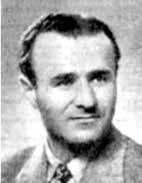


During wartime, the movements and operations of the main fighting forces are frequently published in newspapers, books and documentaries. However, while these battles are taking place, there are often other missions and smaller operations that don’t get a lot of media coverage. In the Israeli wars since its founding in 1948, many air operations have occurred whether it’s in Israeli airspace, over enemy territory or in neutral countries. Here are some of those operations that took place to bring aircraft and supplies to Israel during the 1948 War of Independence.
The newly formed IDF in 1948 was in desperate need of material – from guns and ammunition to planes and medical supplies. Several individuals worked tirelessly across the globe to procure these necessities as they were somewhat in abundance from being World War II surplus items. However, bringing them into Israel was another story. Several operations took place in difficult conditions to transport these vital goods to the frontline troops. The first operation began even before Israel declared independence in May 1948.
Operation Chasida commenced on April 1. The plan was to fly an American piloted C-54 Skymaster filled with weapons from Czechoslovakia to an abandoned airstrip near Beit Daras. Battalion 53 had to secure the landing strip as it was near
unfriendly Arab towns. They used a generator to power the lights as the plane would be landing near midnight. As the plane neared the runway, the lights were turned on and the plane was offloaded. The entire time that the plane was on the ground was just 80 minutes and that included refueling for its return to Europe.
The Haganah, soon be the IDF, received hundreds of rifles, 40 machine guns and a lot of ammunition that would prove vital in an upcoming operation.
Operation Chasida was just the first of many from Europe to send supplies and personnel to Israel. One of the notable missions was Operations Velvetta. This operation was to bring dozens of Spitfire fighter planes purchased from Czechoslovakia to Israel. Ferrying these planes took place in secrecy and had two legs of the trip. There was a stopover in Yugoslavia but the second leg of the trip would be over open water. The operation began in September 1948 and five planes took off for Israel. Two planes, piloted by Modi Alon and Boris Senior, had to make an emergency landing on Rhodes due to running out of fuel. The pilots were interrogated, but soon after, Israel secured their release. Dozens of more planes were sent in December. American pilot and one of the commanders of the operation Sam Pomeranz, a World War II veteran and U.S. Navy test pilot, was killed when his plane crashed into mountains. Subsequent waves of
Spitfires made it safely to Israel, although a few had to turn back due to mechanical issues. To lighten the load, the planes came in unarmed and were escorted by a P-51 Mustang once they reached Israeli airspace. The pilots and planes brought in during Operation Velvetta participated in one of the last battles of the war. Called Operation Horev, it was the first time that the Israeli Air Force achieved air superiority over their enemies.
Many early Israeli Air Force (IAF) pilots took part in these ferrying missions, and several had notable backgrounds and careers. Mordechai “Motti” Hod had been a member of the Jewish Brigade of the British Army during World War II and joined the Haganah after World War II to assist Jewish survivors making their way to Eretz Yisrael. He began to study aviation in Rome and was sent to Czechoslovakia for combat aviation training. Even though he had less than five hours of training in the Spitfire, he was one of the pilots selected to ferry the plane to Israel in Operations Velvetta. Once back in Israel, Hod joined the IAF’s first training course and was one of the first four graduates of the program. He quickly rose in the ranks of the IAF and became the commander of the air force in 1966.
South African Boris Senior had been a Royal Air Force (RAF) pilot during World War II and was shot down in March 1945 in the Adriatic Sea. He was rescued by an
American Catalina flying boat; his brother, also an aviator, was never found after his bomber had been shot down. After the war, Senior felt the need to join his Jewish brethren in Eretz Yisrael, and in 1947, he joined the Haganah’s Air Service. They sent him to South Africa to recruit more volunteers, and he flew eight civilian planes to Israel. He became the commander of the Sde Dov Airfield near Tel Aviv and later in the war joined a fighter squadron. In August 1948, Senior was sent to Czechoslovakia to check out the Spitfires and helped coordinate the flights to Israel. However, his plane made an emergency landing in Greece, and he was held there as they suspected him of being a rebel in the civil war taking place in the country. Senior and Modi Alon were released after two weeks. Senior went on to shoot down two Egyptian planes.
In the past few years, documentaries have been made detailing the heroics and ingenuity of these previously Forgotten Heroes. These pilots and the planes they brought into Israel made a huge impact on the war. Their legacy as the first IAF pilots is history to be remembered.
Avi Heiligman is a weekly contributor to The Jewish Home. He welcomes your comments and suggestions for future columns and can be reached at aviheiligman@gmail.com.
VACUUM SALES AND REPAIR
All areas call Max Flam 718-444-4904
THE LEATHER SHOPPE
The spot for all your custom leather Judaica. Tallis/tefillin bags, lulav and esrog bags, havdallah sets, challah covers, shtenders, pesach sets, matzah/afikomen bags. WhatsApp: (732) 523-0007 or email: theleathershoppe732@gmail.com for a full catalog. We ship.
MY MOTTO IS DON’T WAIT TO buy real estate
Buy real estate and wait Your realtor for life 516-784-0856 Alexandra at Realty Connect USA
PEACEFUL PRESENCE STUDIO
Men’s private yoga, Licensed Massage & Holistic Health Guidance 436 Central Ave, Cedarhurst Info. & free video training www.peacefulpresence.com 516-371-3715


GERBER MOVING
FULL SERVICE MOVING
Packing Moving Supplies
Local Long Distance. Licensed Insured
1000’S Of Happy Customers Call Shalom 347-276-7422
HANDYMAN AVAILABLE
For big or small jobs, Sheetrock, carpentry, painting, electrical, plumbing, install & repair appliances
Call Ephraim at 347-593-4691
MANAGEMENT STAFF WILL ASSIST
you with: * Obtaining Medicaid and Pooled Income Trust
* In-home Assessments, Individual and Family Counseling
* Securing reliable home care assistance
* Case and Care Management services
Dr. S. Sasson, DSW, LCSW (718) 544- 0870 or (646) 284-6242
SCHEININGER Licensed Real Estate Salesperson Realty Connect USA 516-884-6530 (C) Lscheininger@realtyconnectusa.com
@LeahScheininger_Realtor




HAIR COURSE:
Learn how to wash & style hair & wigs. Hair and wig cutting, wedding styling Private lessons or in a group Call Chaya 718-715-9009
ZEVIZZ WOODTURNING JUDAICA
Challah knifes, batei mezuzah, besamim holder, kiddish cups, havdalah candle holders, yad for sefer torah, pens, stenders, bowls and more 952-356-2228
ECO-FRIENDLY CONTRACTOR
Big or small jobs. from conception to completion windows, doors, plumbing, electrical, Kitchen Cabinet countertop. petitions, Bathrooms, tiling. additions , painting, any construction work. call MICHEL 9175383763 Shomer Shabbos
CEDARHURST
Don’t miss this opportunity!
4 Bedroom 21/2 Bathroom House Perfectly located in Cedar Bay Park, walking distance to all. Oversized property for expansion, A Must See. LOCATION, LOCATION. For More Info call (516) 881-7727 Leave Message
WOODMERE
Beautiful, brick, colonial boasting 5 bdr 3.5 Bth in pristine condition. Excellent location, near all! Move right in! RCUSA 516-512-9626
WOODMERE
Introducing a stunning 14-side hall colonial home in the Hewlett Woodmere School District. Formal living room, formal dining room, den with a skylight. Eat in Kitchen, two sinks, a double oven, a warming draw and a microwave. First floor bedroom, a full bathroom and laundry room. Two-car garage. Upper level has four bedrooms, two full bathrooms. Finished basement with playroom, storage and utilities. Well-groomed exterior with porch adjoining the master bedroom. Hardwood floors and back patio. Central air conditioning, inground sprinkler system, alarm system. Close proximity to schools, shopping centers, restaurants, and transportation options. Mark Lipner Associate Broker Berkshire Hathaway Laffey International 516-298-8457 mlipner@bhhslaffey.com



CAN’T AFFORD YOUR PROPERTY TAXES? MORTGAGE?
Must sell for any reason?
Call for FREE Consultation. Call now 212-470-3856
Cash buyers available!
Spacious home within school district
14 with exquisite upgrades and central air conditioning, splendid kitchen with dual sinks, five bedrooms. Main level encompasses a spacious great room, office space, complementing the formal living and dining areas. Unfinished basement, detached garage. Expansive lot, measuring 80 x 100. Conveniently located near shopping, railroad, restaurants and places of worship. Mark Lipner Associate Broker Berkshire Hathaway Laffey International 516-298-8457 mlipner@bhhslaffey.com
HEART OF CEDARHURST
Entrance off Gourmet Glatt lot, second floor, shared bath, ideal for therapist/ office work, includes utilities, $600. Call 516-371-3715
5 TOWNS - OFFICES FOR LEASE
Attractive Pricing!
Inwood: 1500sf loft office
Cedarhurst: 3 - Office Suite 500sf Also… Large Parking Lot & Storage available Utilities, Internet & Parking incl. with some
Kosher kitchen - Minyan Next to LIRR - No broker fee
Call/text/Whatsapp: 516-206-1100
SUBLET AVAILABLE
Video Production Space
Fully equipped office on Central Ave includes internet, graphics/editing computers & software. Flexible rates based on space needed. Perfect for creatives!
Contact David Jasse: 917-570-5514
BIG FULLY RENOVATED,
Woodmere, spacious 4bedroom 2 full bath split level.2 car garage +driveway. Backyard on water SD#14. W&D. Tons of storage space. 347-517-3552


BCBA FIELDWORK
Hours & Supervision
Gain hands-on sup to meet BACB/state reqs. Mentorship by BCBAs & clinical leaders. School-day/ After-school/wknd hrs in Five Towns and Far Rockaway. Talent@encoresupport.org
DELIVERY PERSON NEEDED to deliver this Newspaper every Thursday morning to locations in Brooklyn. Must have Mini van or SUVand availability to work Consistently every week.
Good pay
Please email gabe@fivetownsjewishhome.com or call (917) 299-8082
SEEKING ELA TEACHER
DON’T GET STUCK WITH A TWO STORY HOUSE YA KNOW, IT’S ONE STORY BEFORE YOU BUY IT BUT A SECOND STORY AFTER YOU OWN IT!
Call Dov Herman For An Accurate Unbiased Home Inspection
Infrared - Termite Inspection
Full Report All Included NYC 718-INSPECT Long Island 516-INSPECT www.nyinspect.com
Teaching position for Gr. 6. Mon.-Thurs., afternoon hours. Far Rockaway/5T area. Great salary, warm, supportive environment. Training in our curriculum is provided.
Teachersearch11@gmail.com

classifieds@fivetownsjewishhome.com • text 443-929-4003
JOIN A SPECIALIZED FIELD!
Change a child’s future while growing your knowledge base of behavioral and social skills professions. Full day school cases and evening hours available in Five Towns and Far Rockaway. HS diploma required. Talent@encoresupport.org
REGENTS EXPERT
Tutoring regents in Algebra and Geometry A Darchei Torah instructor. Guaranteed results
Text 347-491-8045
WhatsApp 347-767-1755
5 TOWNS BOYS YESHIVA
Seeking Elem Gen Ed Teachers
Excellent working environment and pay. Only lic/exp need apply. Email resume to yeshivalooking@gmail.com
Excellent growth potential, Frum environment, Excellent salary & benefits. Email resume to: resumetfs1@gmail.com
REGIONAL NURSE
5 Towns area Nursing Home
management office seeking a Regional/Corporate level MDS Nurse to work in our office.
Must be an RN. Regional experience preferred. 2-3 years MDS experience with good computer skills required. Position is Full Time but Part Time can be considered. Great Shomer Shabbos environment with some remote options as well. Email: officejob2019@gmail.com

A multi-tasker needed for general office work. The ideal candidate is someone who is detail-oriented, responsible, and can take ownership. Looking for someone who is eager to learn, and expand his/her skill set while possessing the ability to work independently and as part of a team. Experience with Excel required. Five Towns location. In-office position only, not remote. Please send resume to 5tpart.timecareer@gmail.com
KOL YAAKOV
In Great Neck, NY, is seeking general studies teachers for both the elementary and middle schools, for the upcoming academic year. Mon-Thur afternoons. Competitive salary, warm and supportive environment. Send resume to m.kalati@kolyaakov.org
SPECIAL ED TEACHER
HASC seeks Special Ed Teachers for our Early Learning Program. Warm, supportive and enjoyable working environment. Great Pay and Benefits! Sign on Bonus! Referral Bonus! Please email resume to jobswd@hasc.net
SEEKING ASSISTANT teachers for elementary General Studies classes for ‘24-’25 school year. Candidates should have skills to take over for teachers if needed. M-Th, PM hours, strong support. Far Rockaway area. Send resume to teachersearch11@gmail.com
SHMIRAS HALASHON
Text 516-303-3868 with a time slot of your choice to be careful on lashon hara. Be a part of the 1,000 people for klal yisroel!














By Rivki D. Rosenwald Esq., LMFT, CLC, SDS

The idea is to do it daily. Every day! First thing when you get up. No, I’m not talking about brushing your teeth, though your roommate may say I should be.
And I’m not talking about getting your first cup of coffee of the day, though, I’m sure many of you feel like that is what I should be recognizing as your need.
I’m not even talking about shutting your noisy alarm clock, though you may need to do it too first thing in the morning to hear yourself think.
What I am talking about is actually not doing anything for yourself. It’s actually not focusing on yourself at all.
It’s not even one of those lectures about being an awesome mate or roommate and focusing on the other.
But rather, it’s focusing on being thankful.
Modeh ani! Thankful am I!
Does that mean that things are always great right when you get up? No, of course not. However, we need to start our day being thankful just to have another day – a new day to navigate the challenges or celebrate the triumphs.
Thanksgiving! That’s an everyday day for us! Not just on a Thursday, but also Sun-
day, Monday, Tuesday, Wednesday, Friday, and Saturday.
Sure, when things are awesome, we want to embrace it. We’d like to launch into our day and ride the wave. Stopping to say “thank you” may feel like a hiccup in our momentum.
What’s its purpose anyway?
Believe it or not, it’s good for us to stop. It makes us attuned to the fact that our good is not just coming to us. We become aware that when it happens it’s a treat to be thankful for, and we show up with a bit more humility because we realize someone gave us a gift.
Now, we also know life doesn’t always cooperate with our desires. We know that life gets sticky sometimes. We feel and experience things that we don’t always feel like being thankful for. So, why in the world should we wake up in that case and say thank you?
Because, waking up, in and of itself, is the treat! The idea is to realize that the new day presents an opportunity to confront, deal with, and maybe even triumph over the tough stuff.
So let’s recommit to being the Thanksgiving people – today…and every day of the week!

